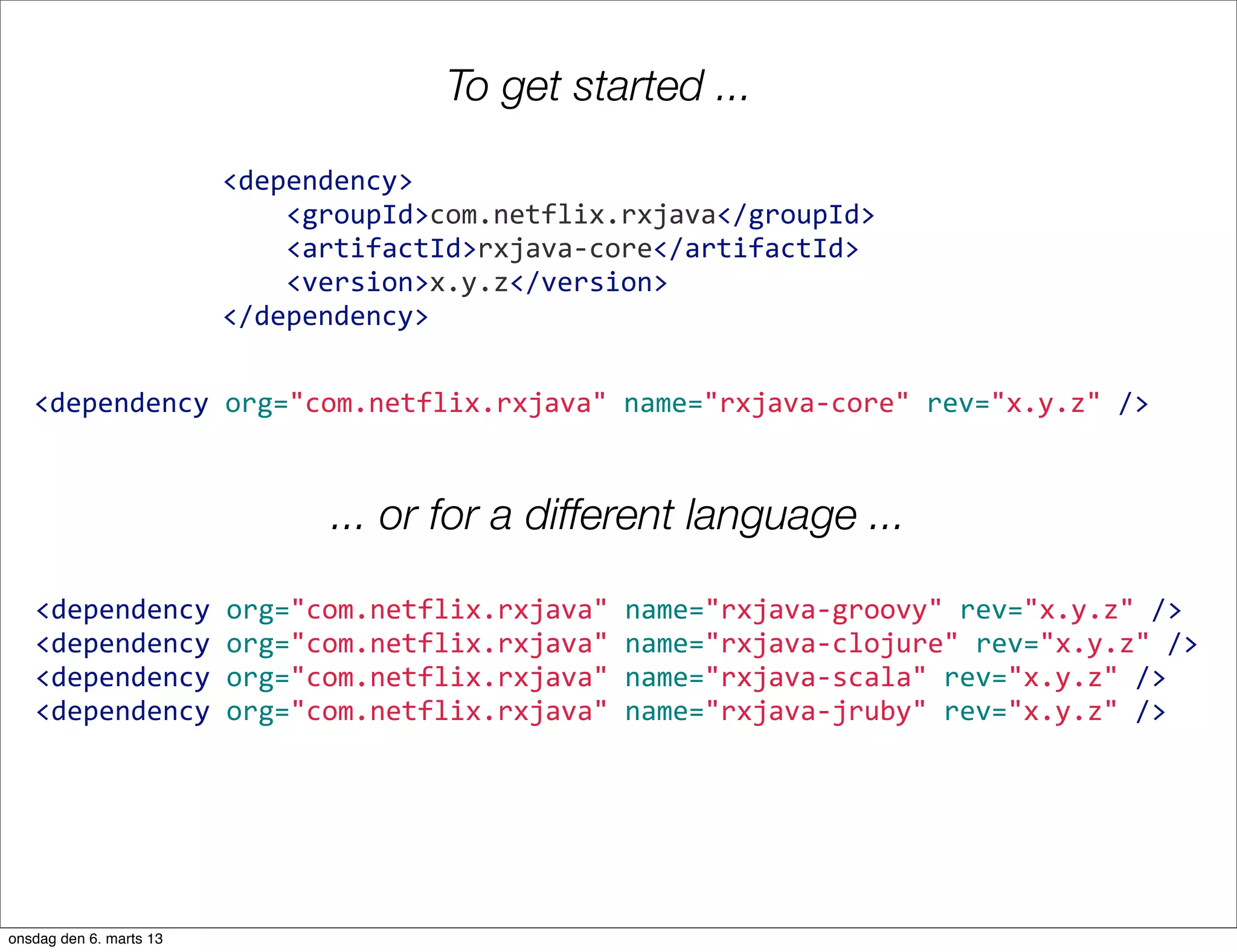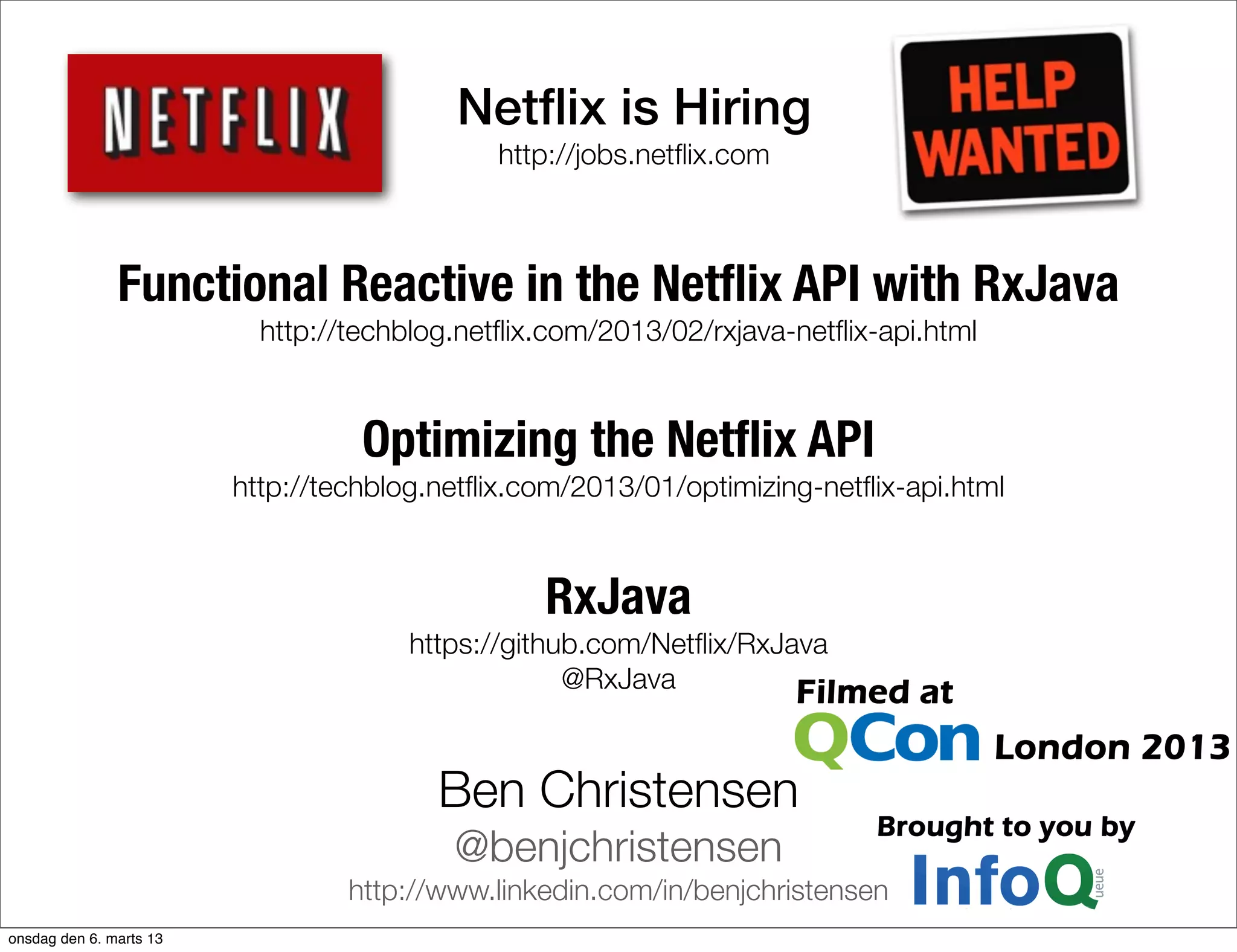Ben Christensen's presentation on functional reactive programming at Netflix discusses the evolution and impact of the Netflix API, which has seen significant growth in traffic and user engagement. It highlights the implementation of RxJava for managing asynchronous operations and the creation of observable APIs to enhance scalability and responsiveness. The presentation emphasizes the shift towards reactive programming to better handle concurrency and dynamic demands in service interactions.





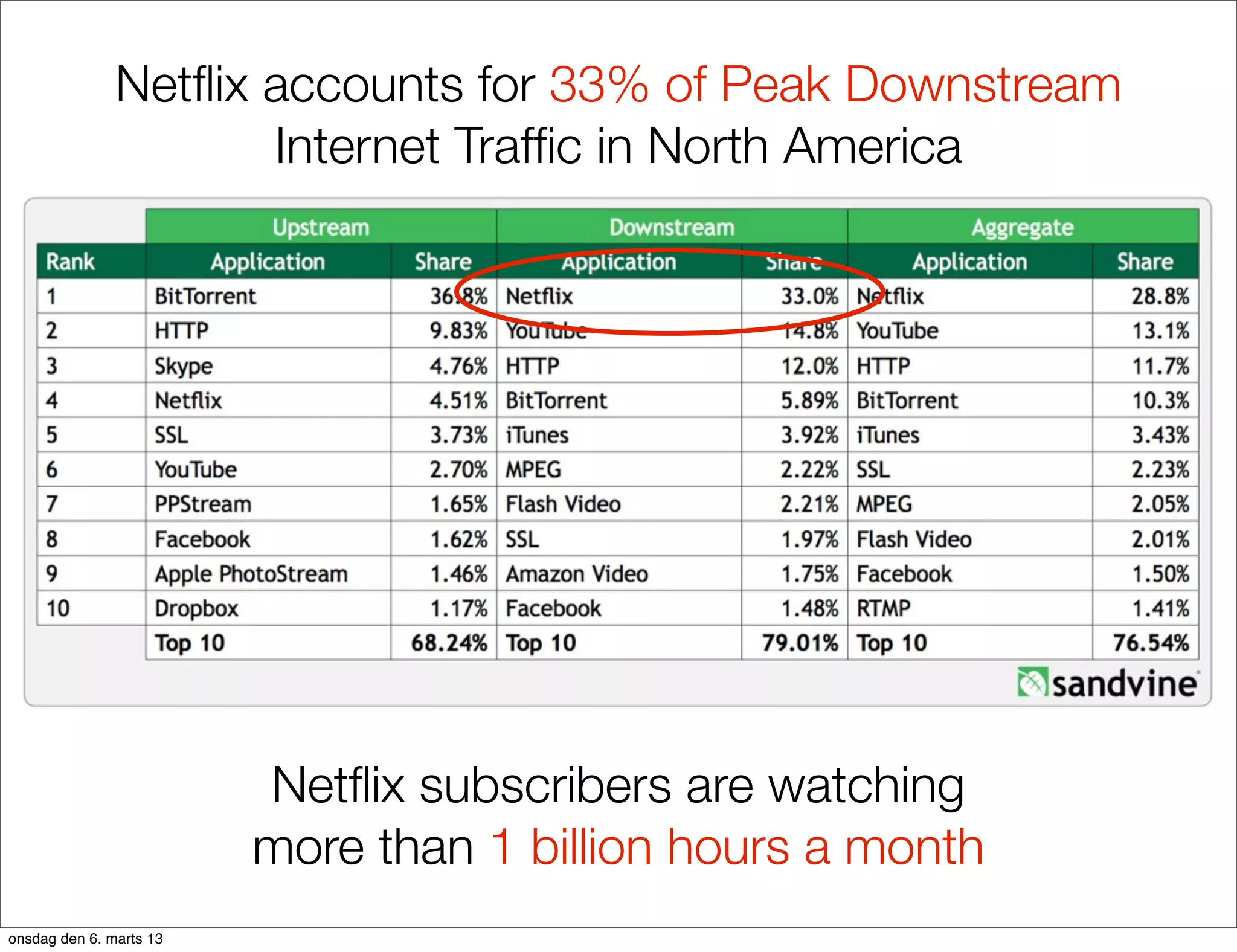
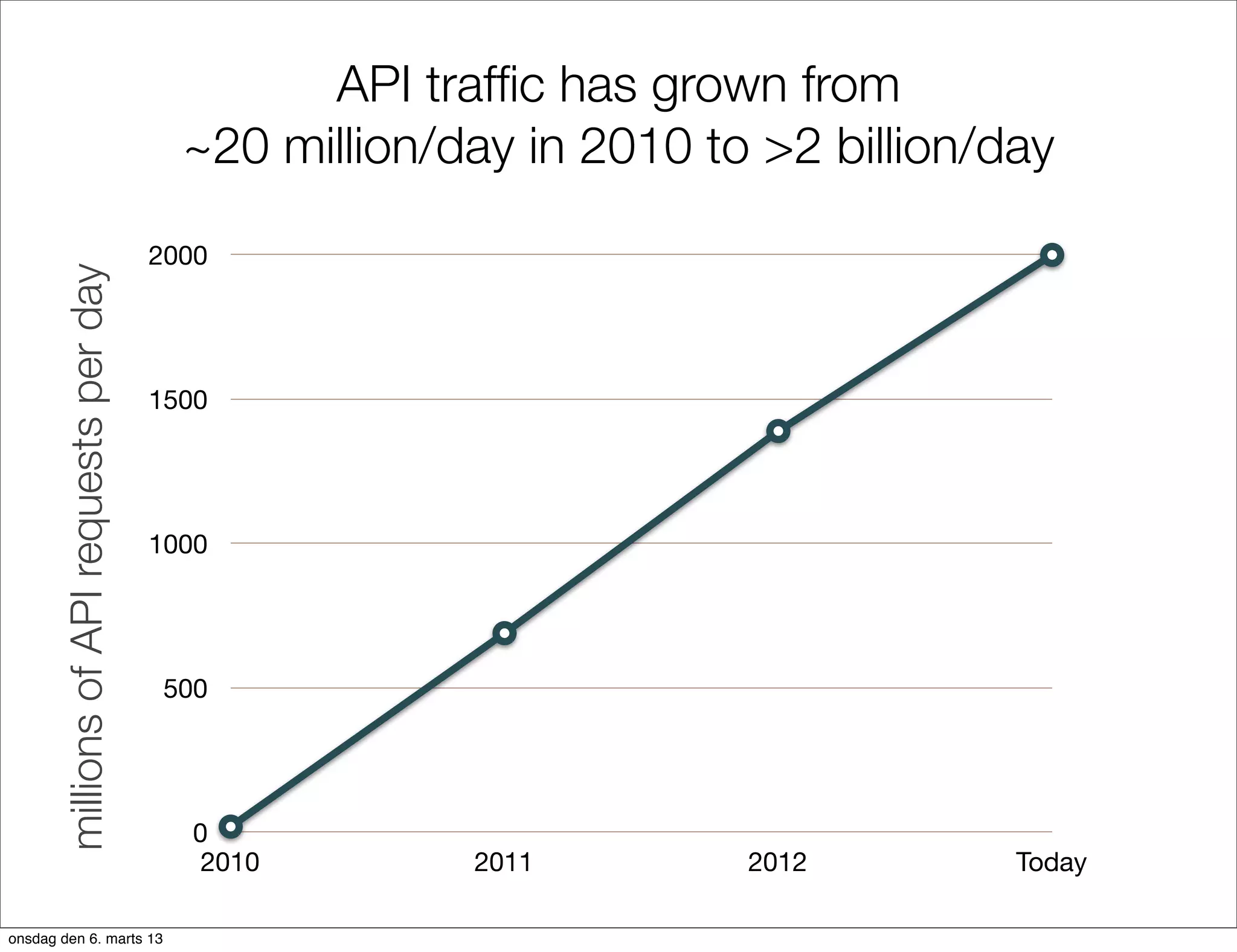
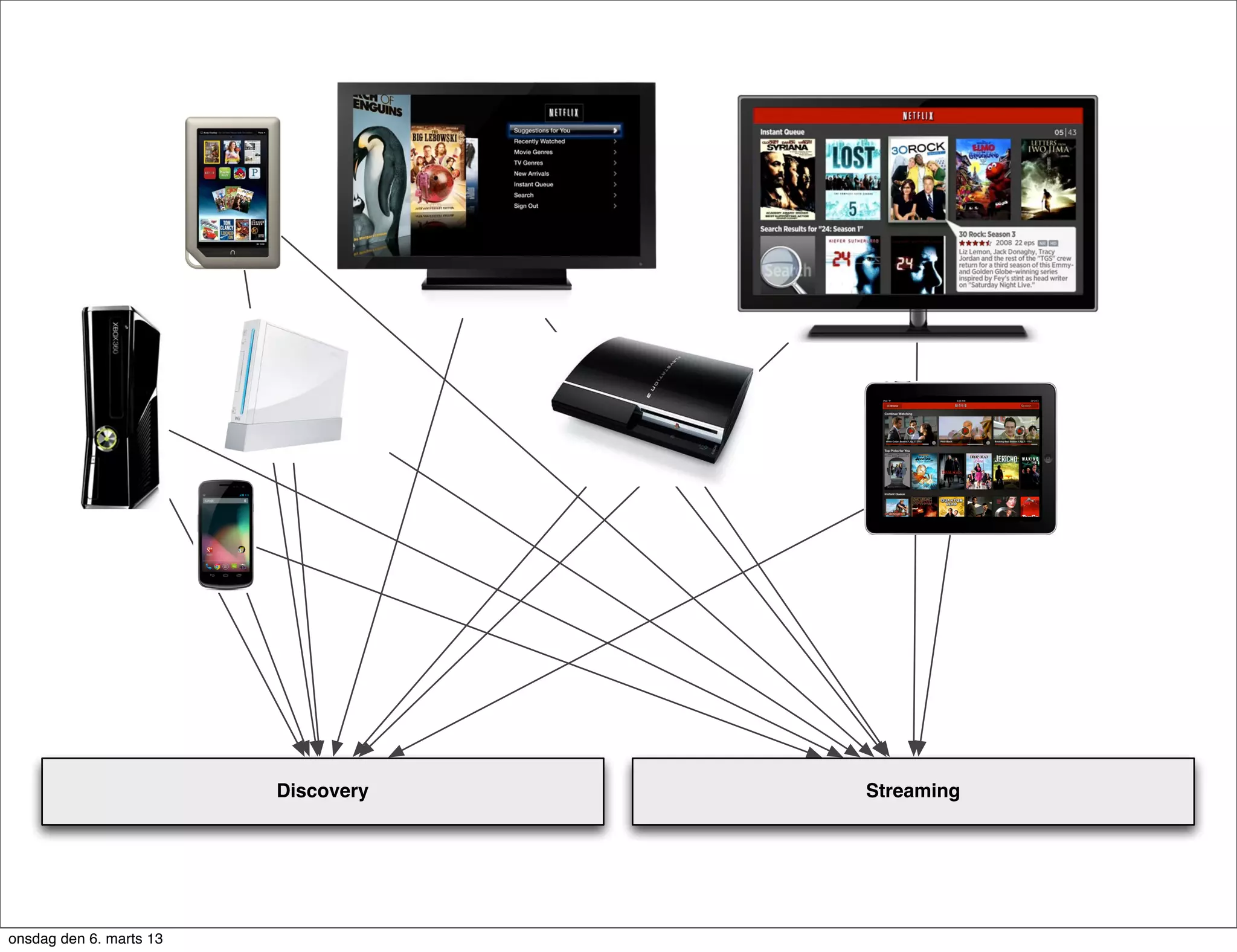

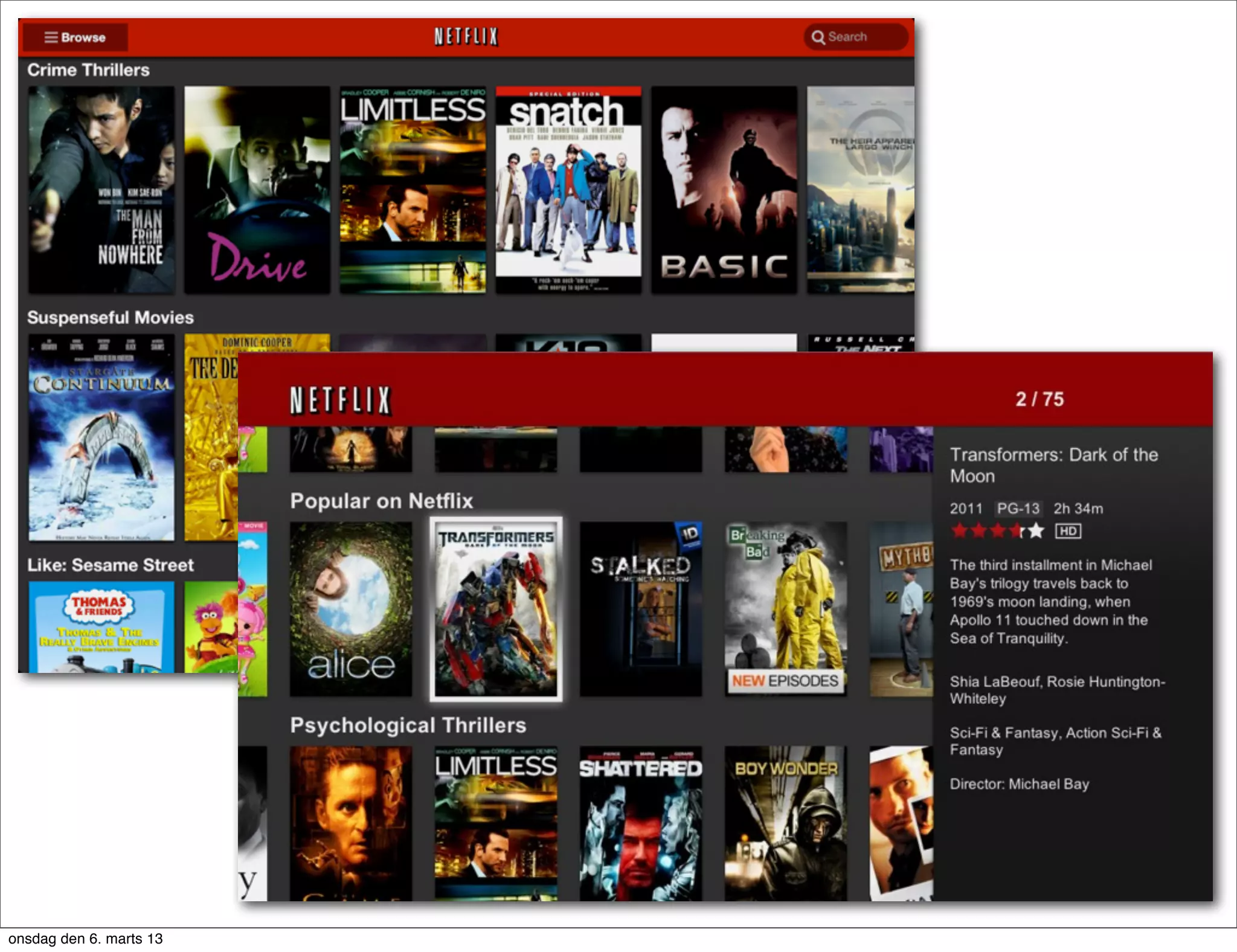
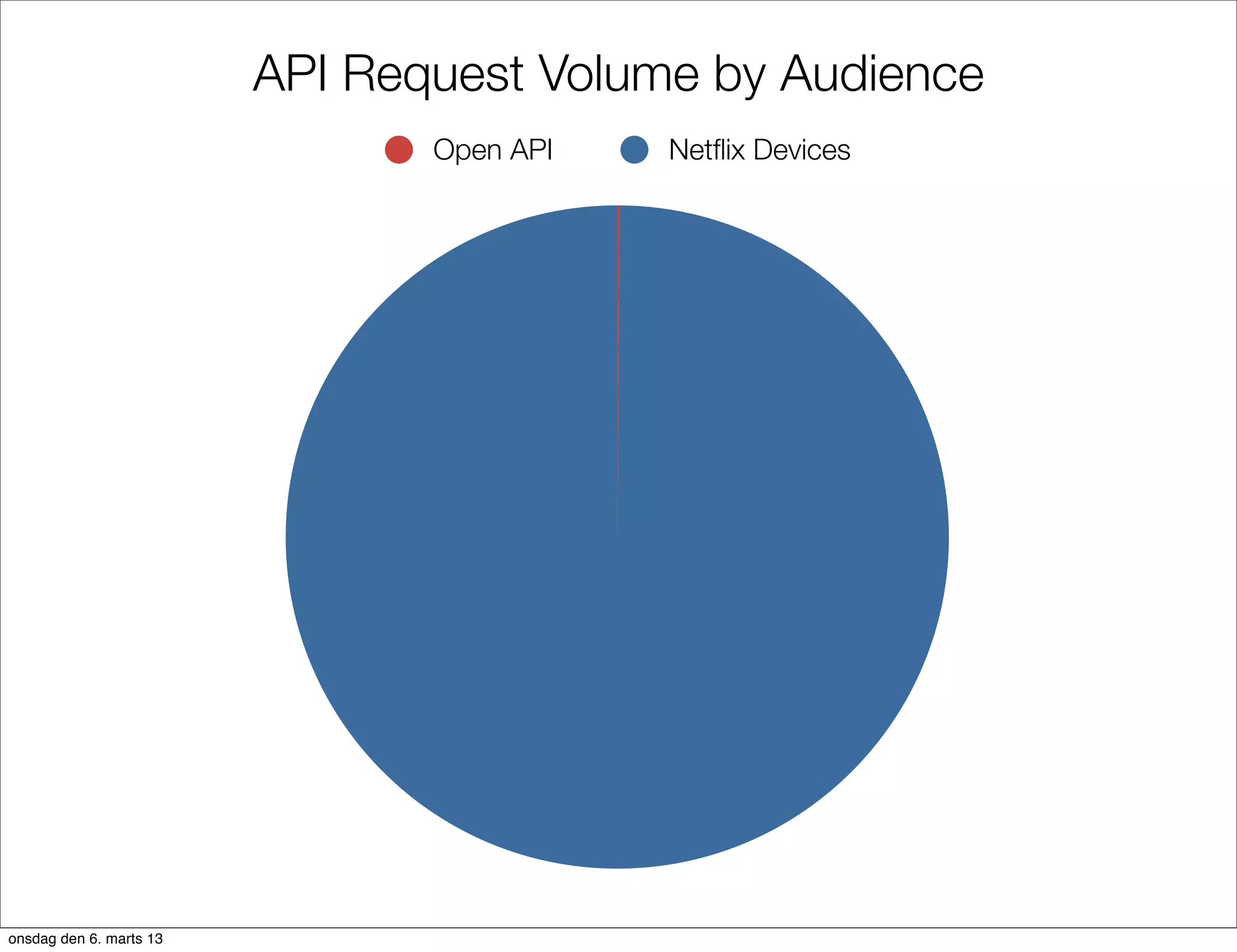
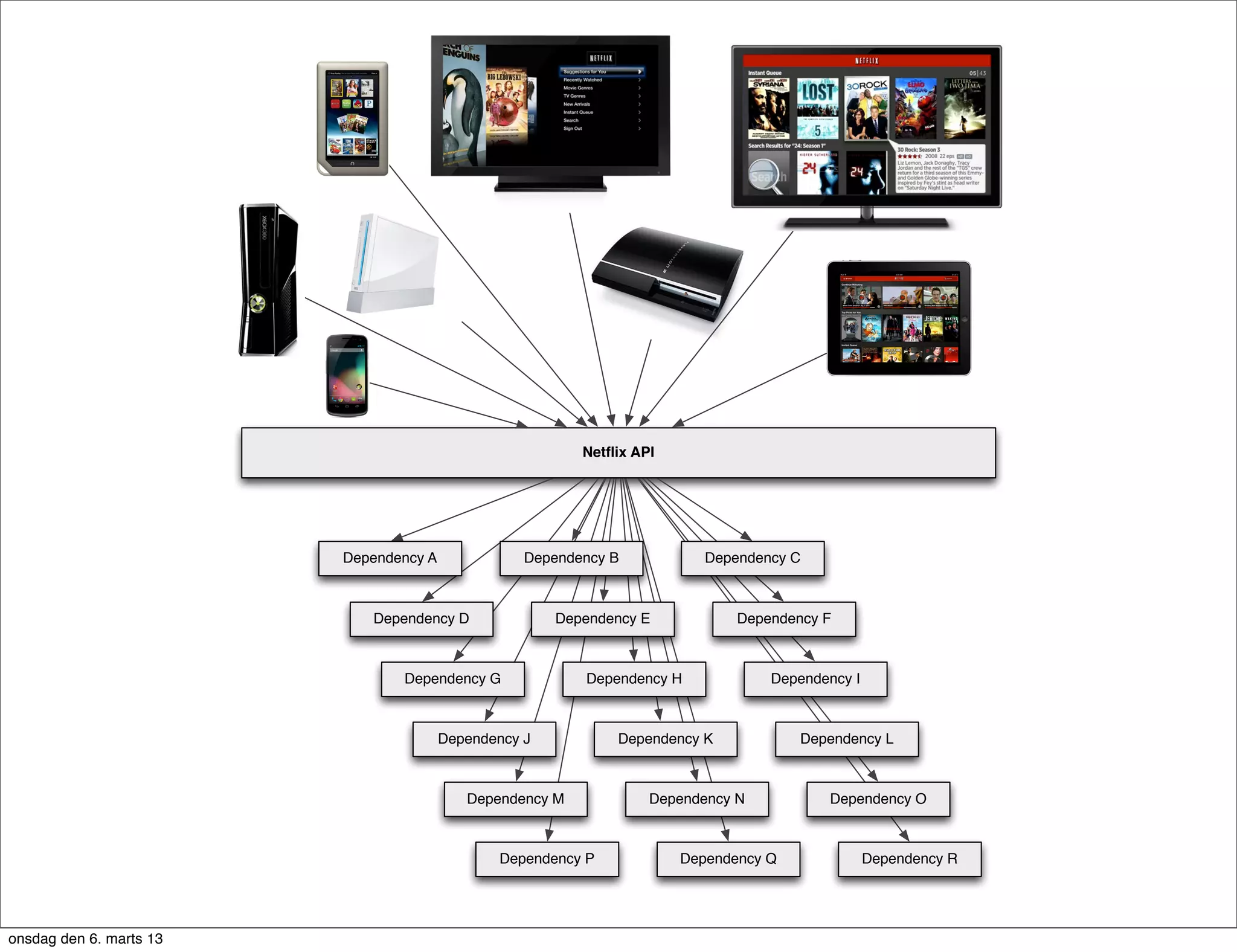
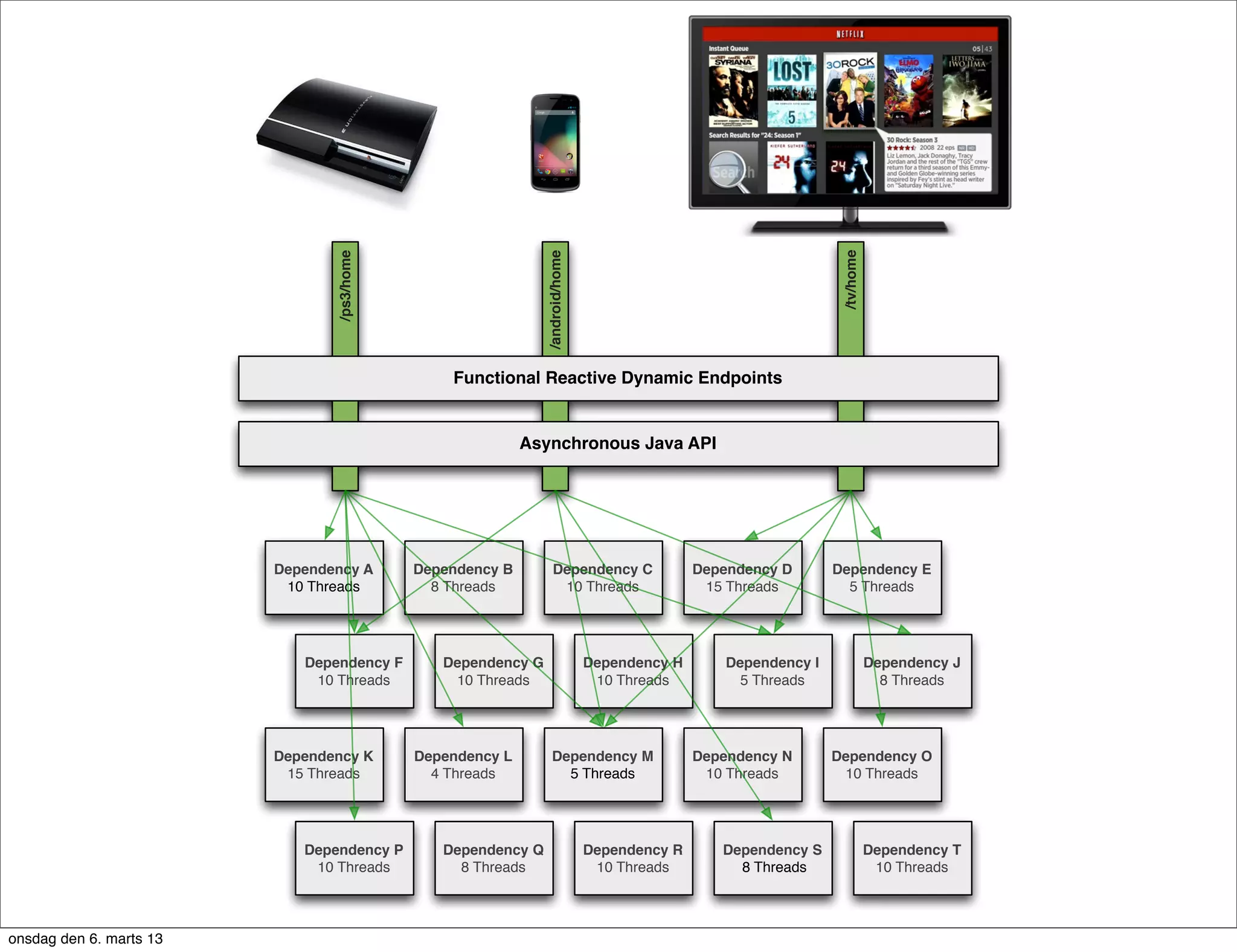
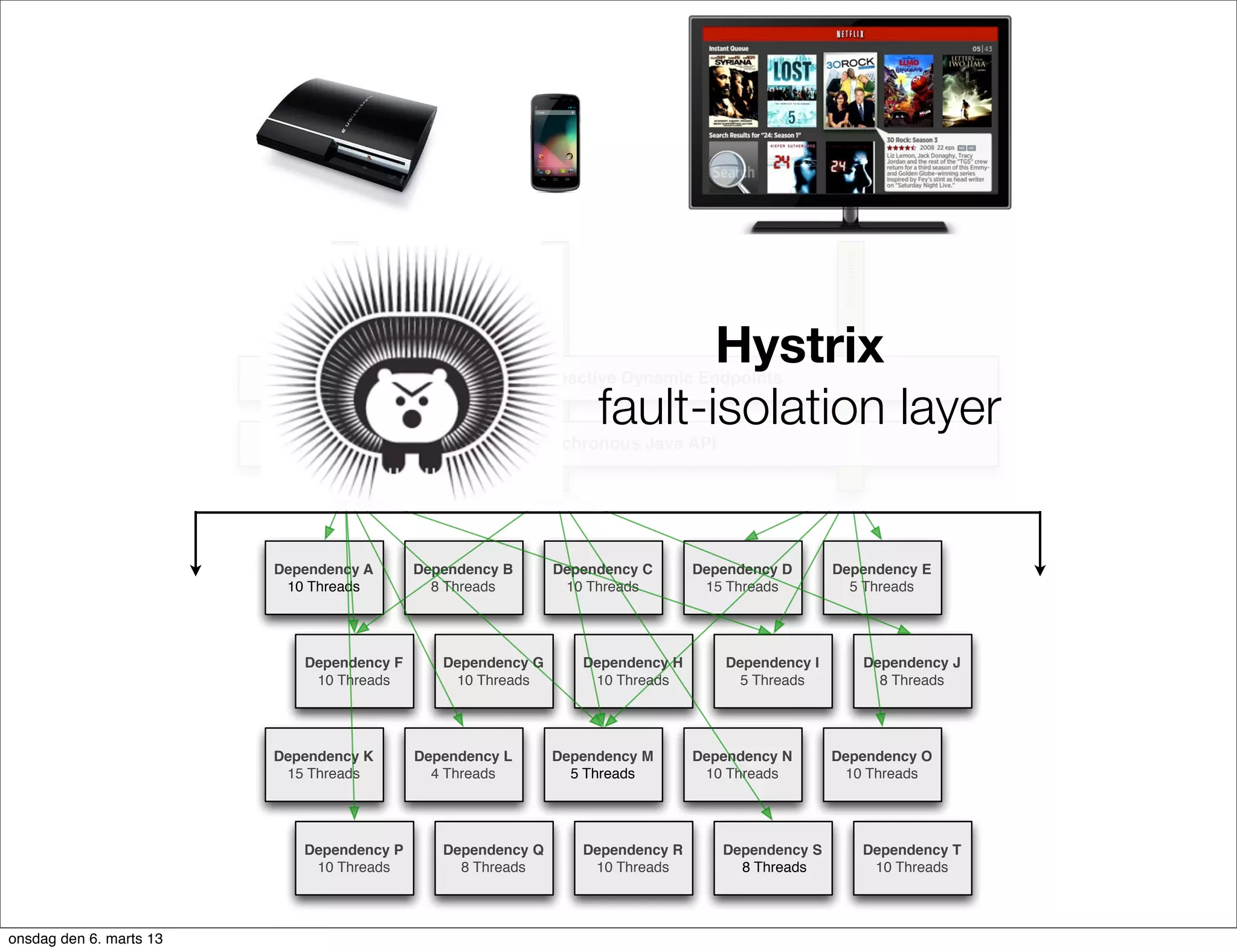
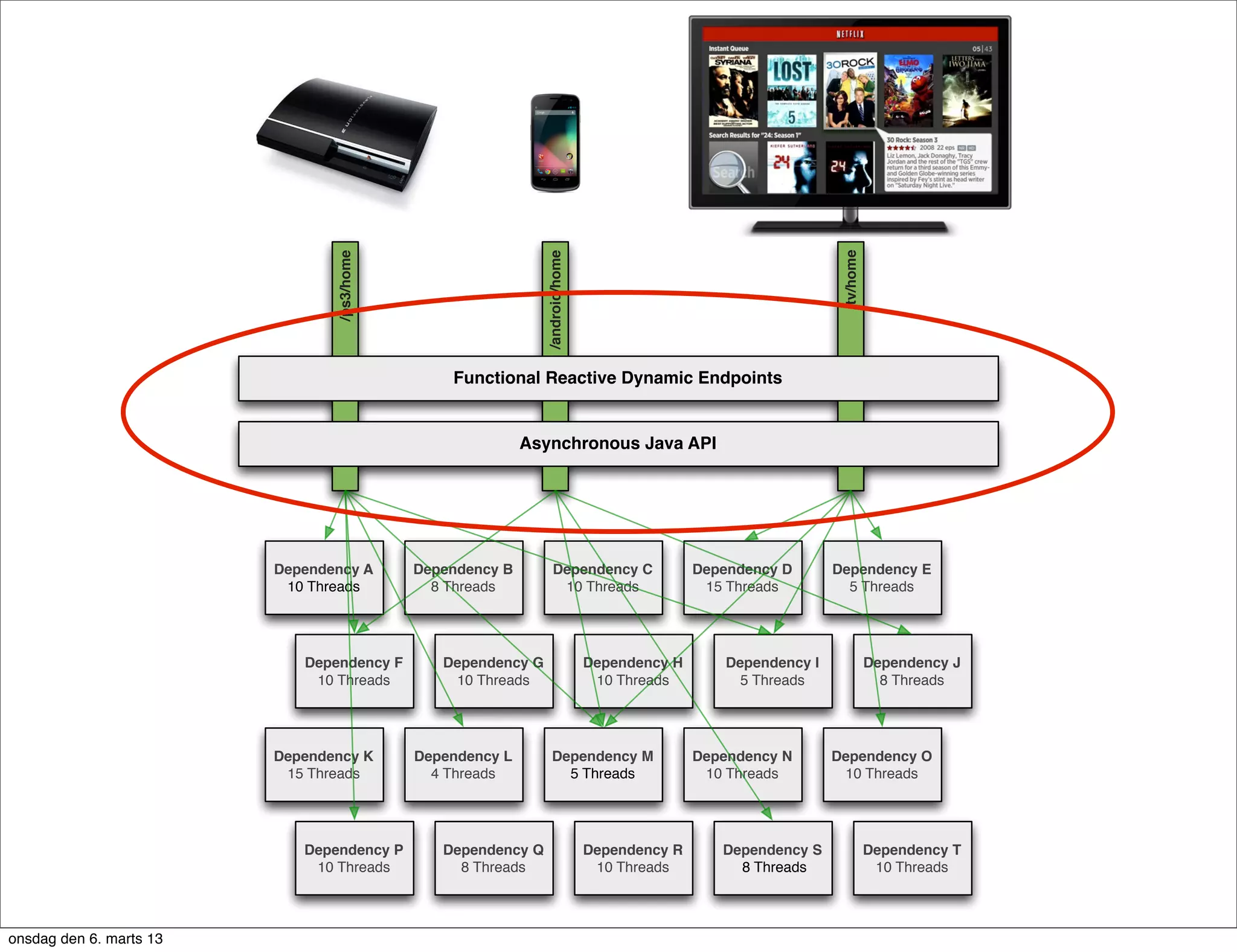
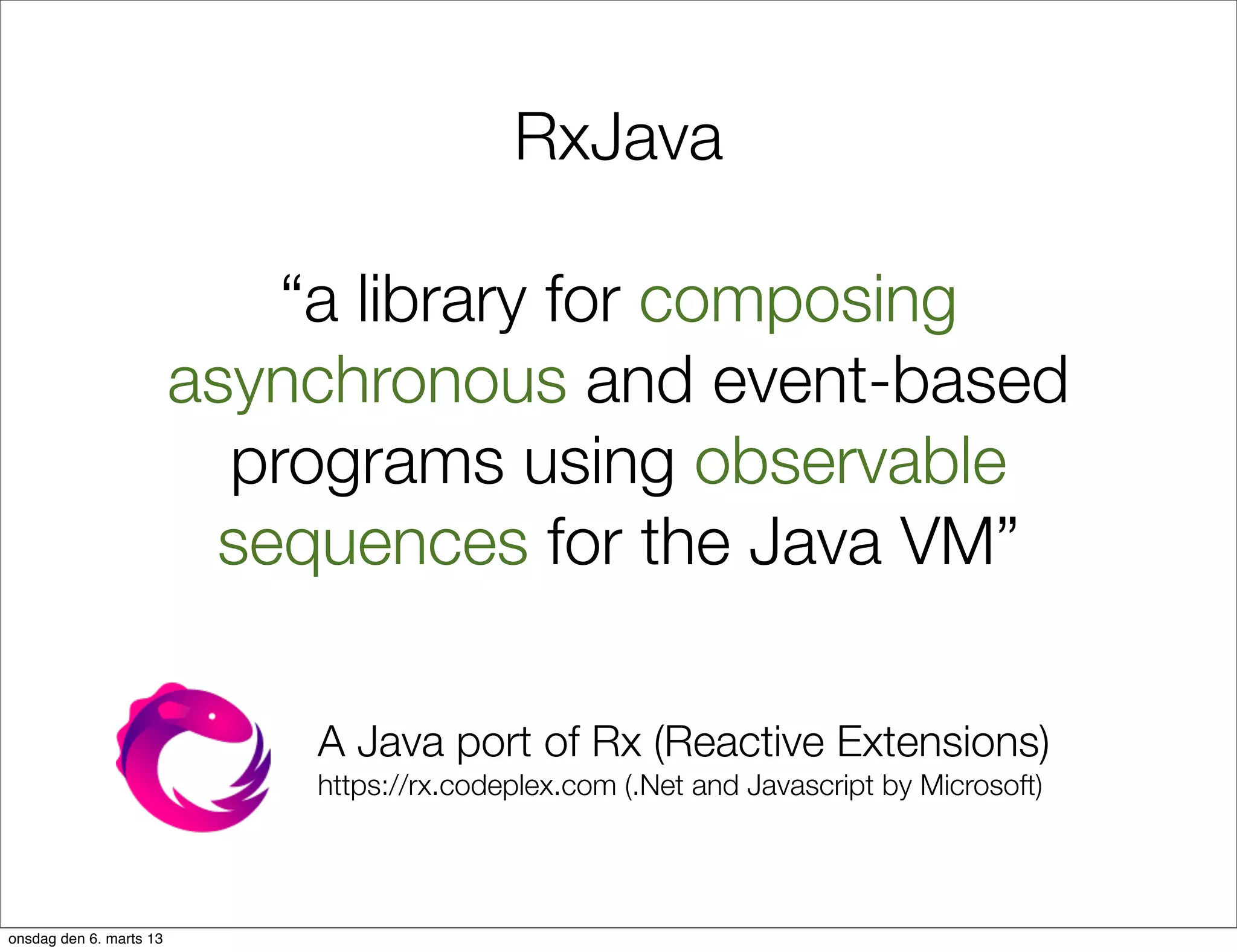

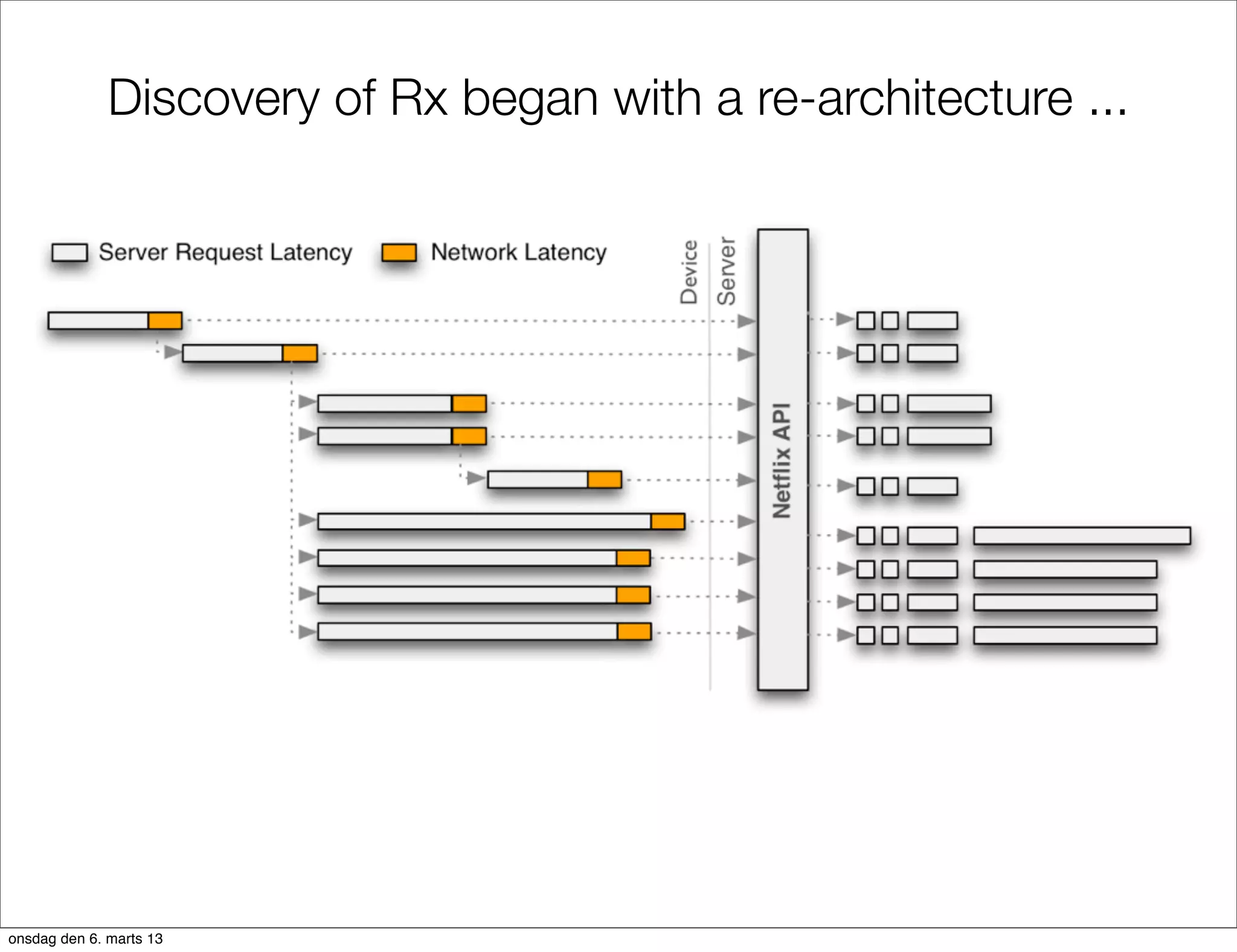
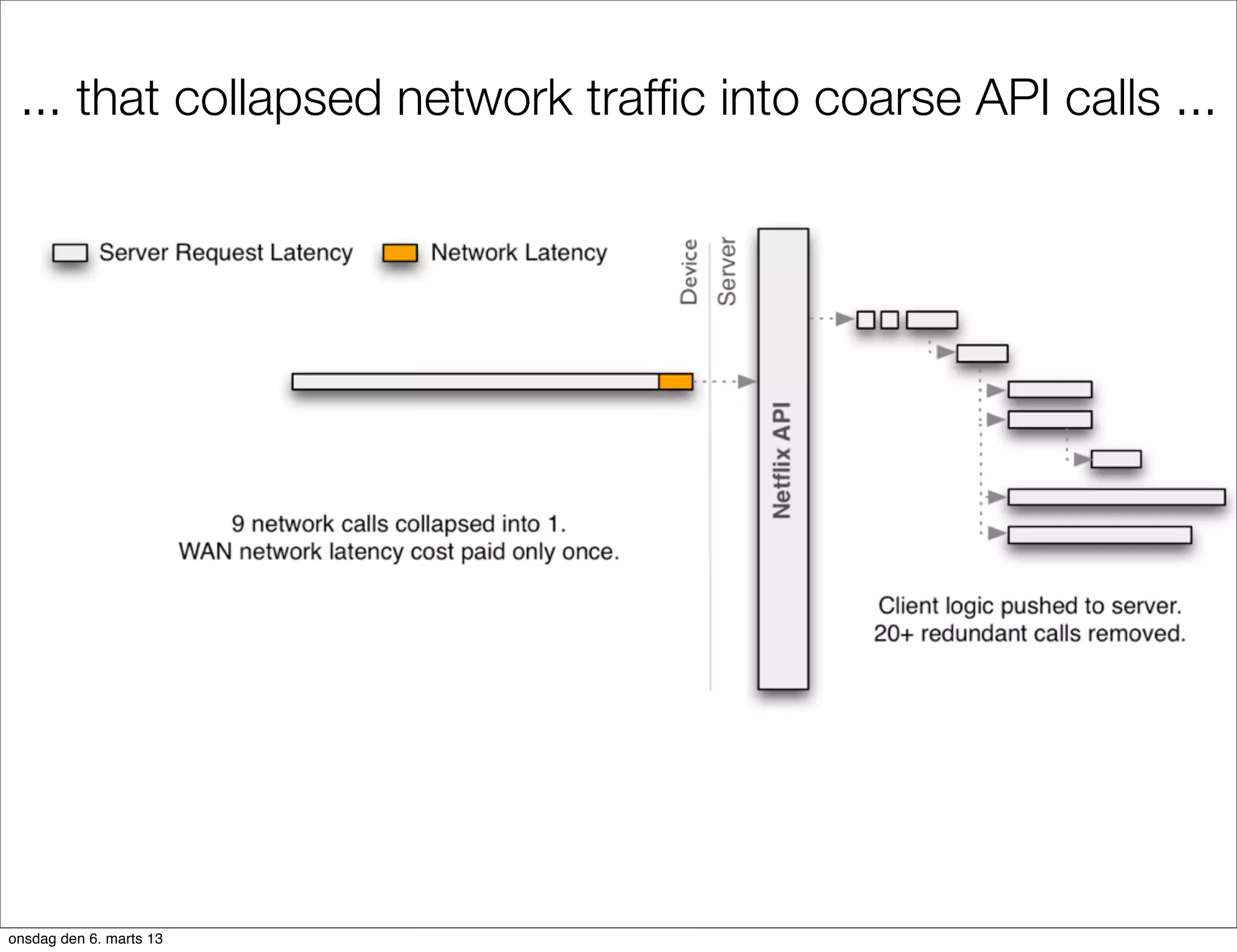
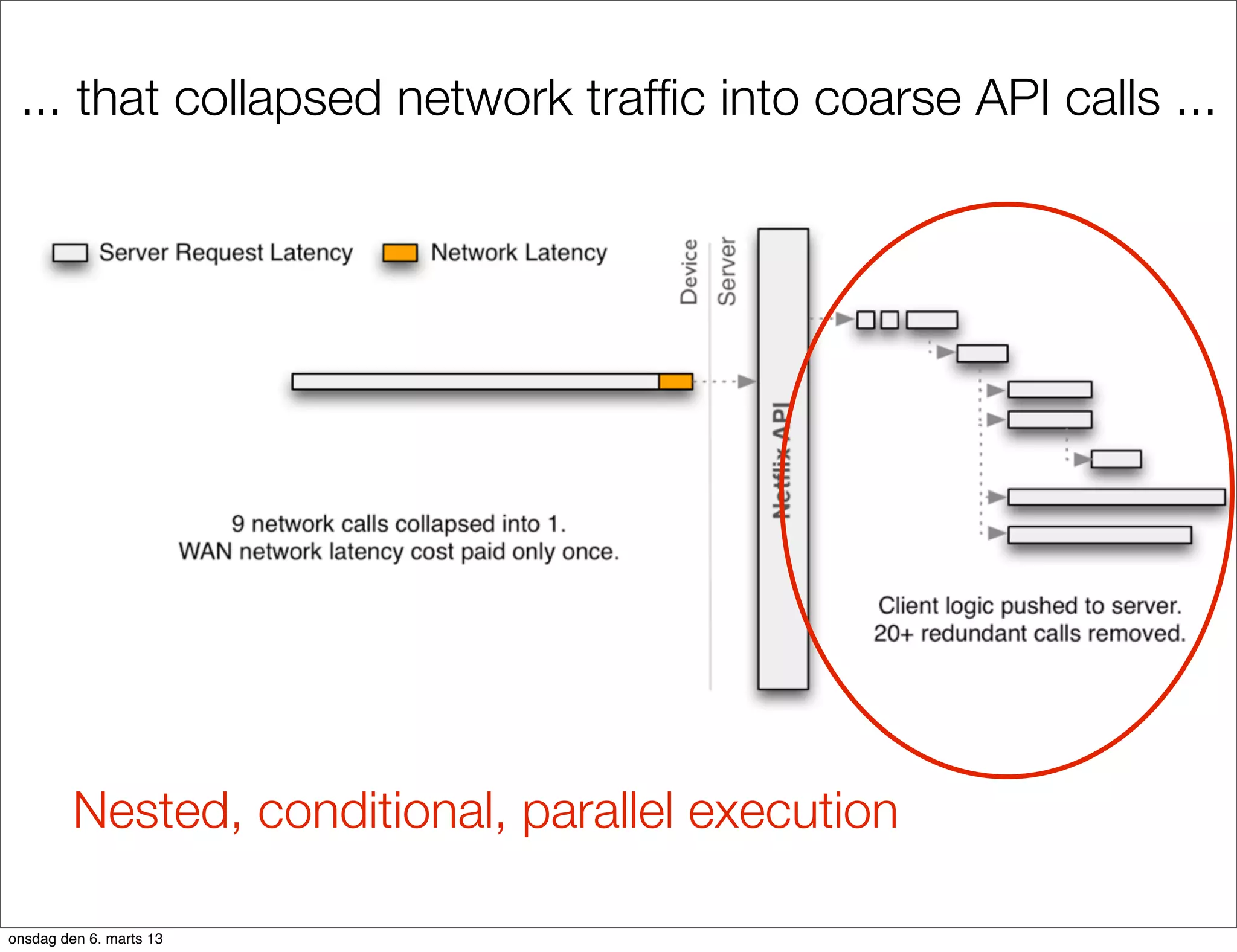
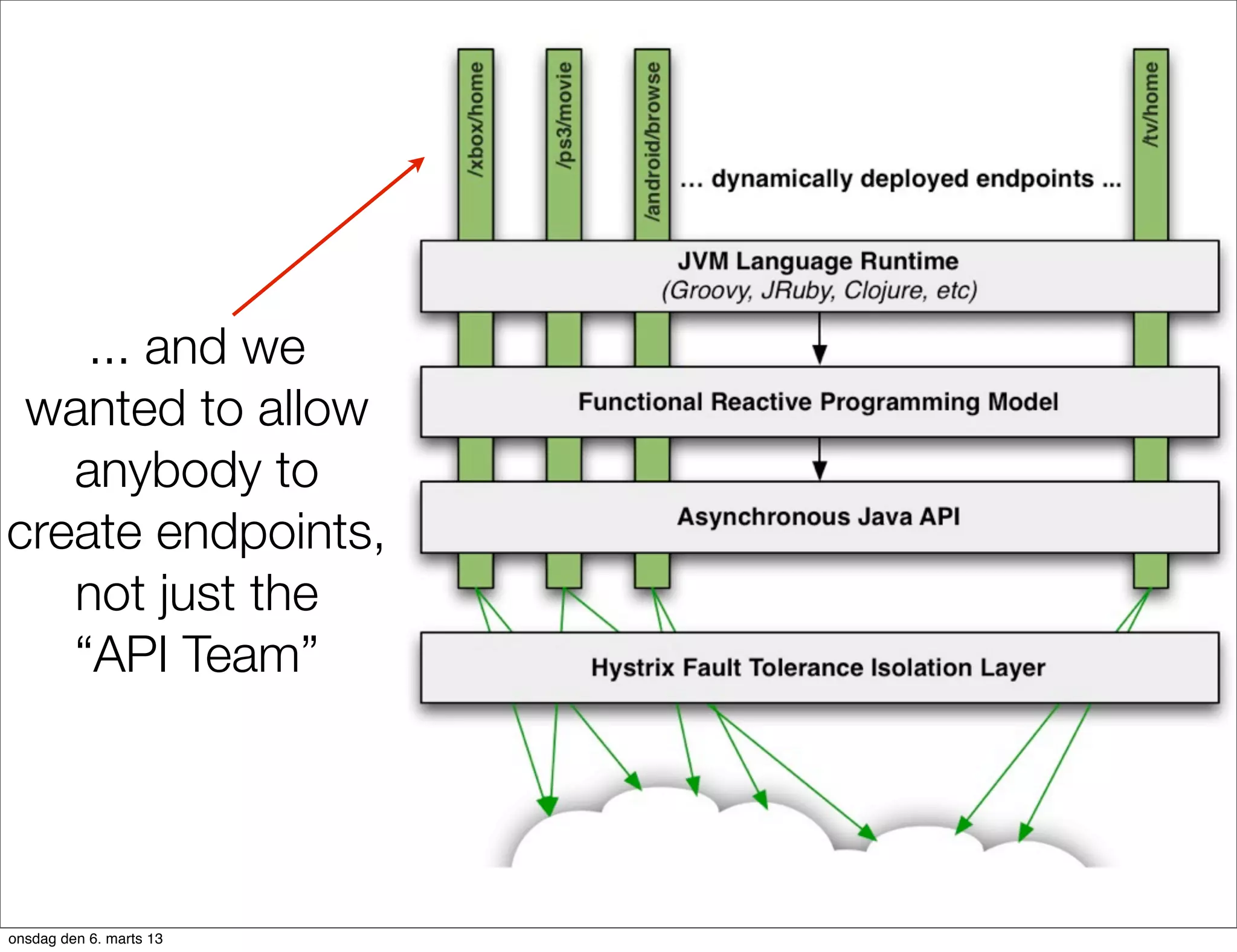
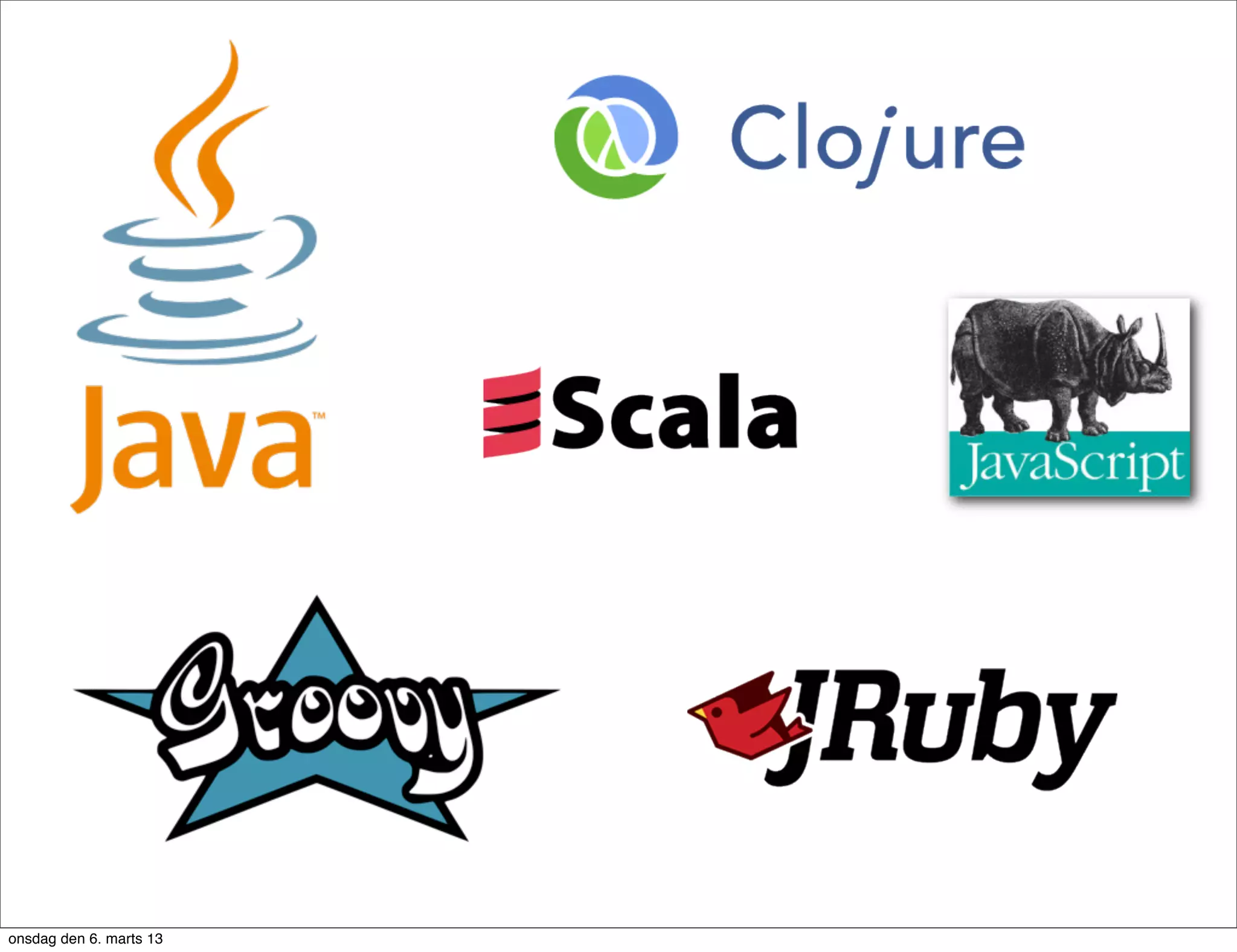

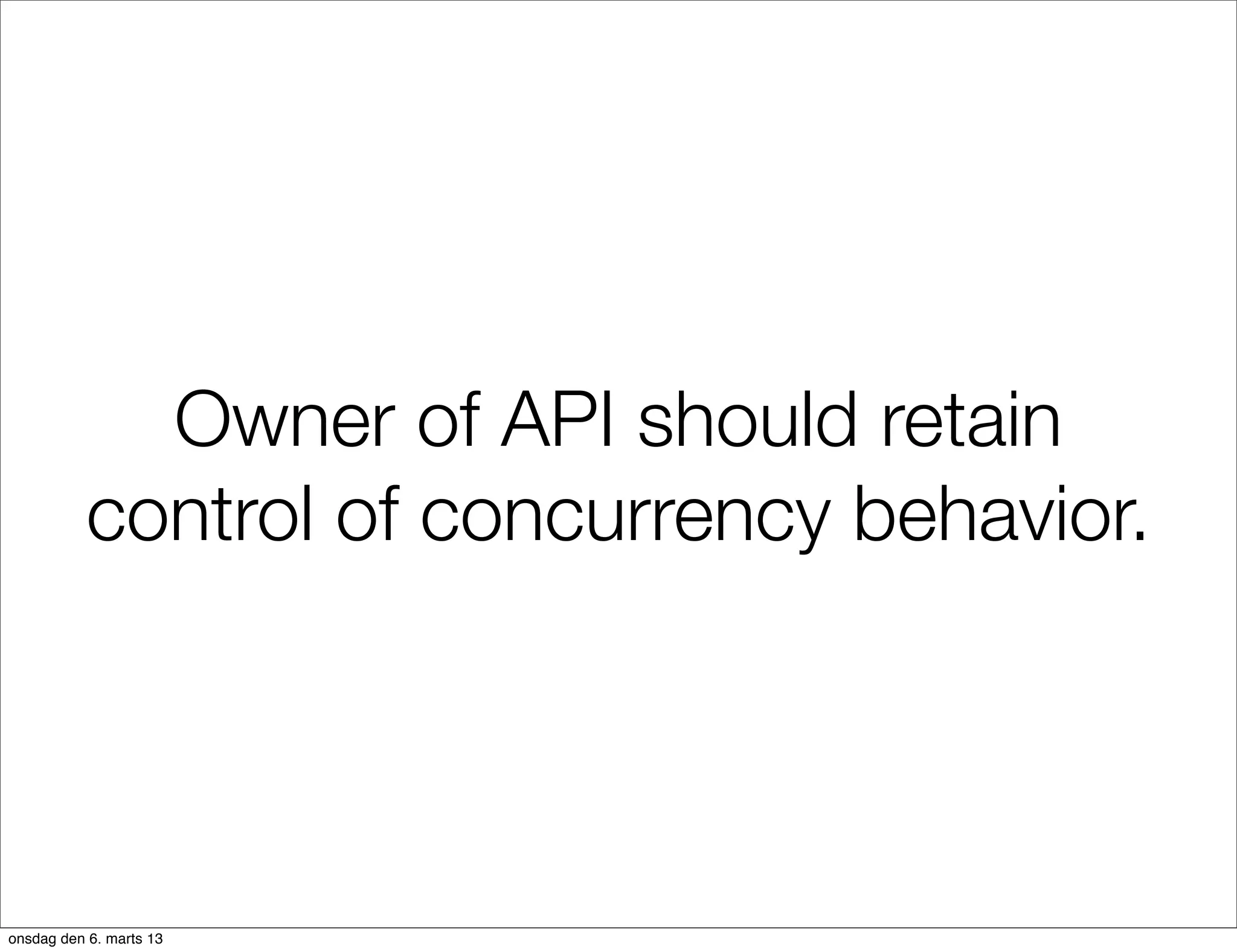
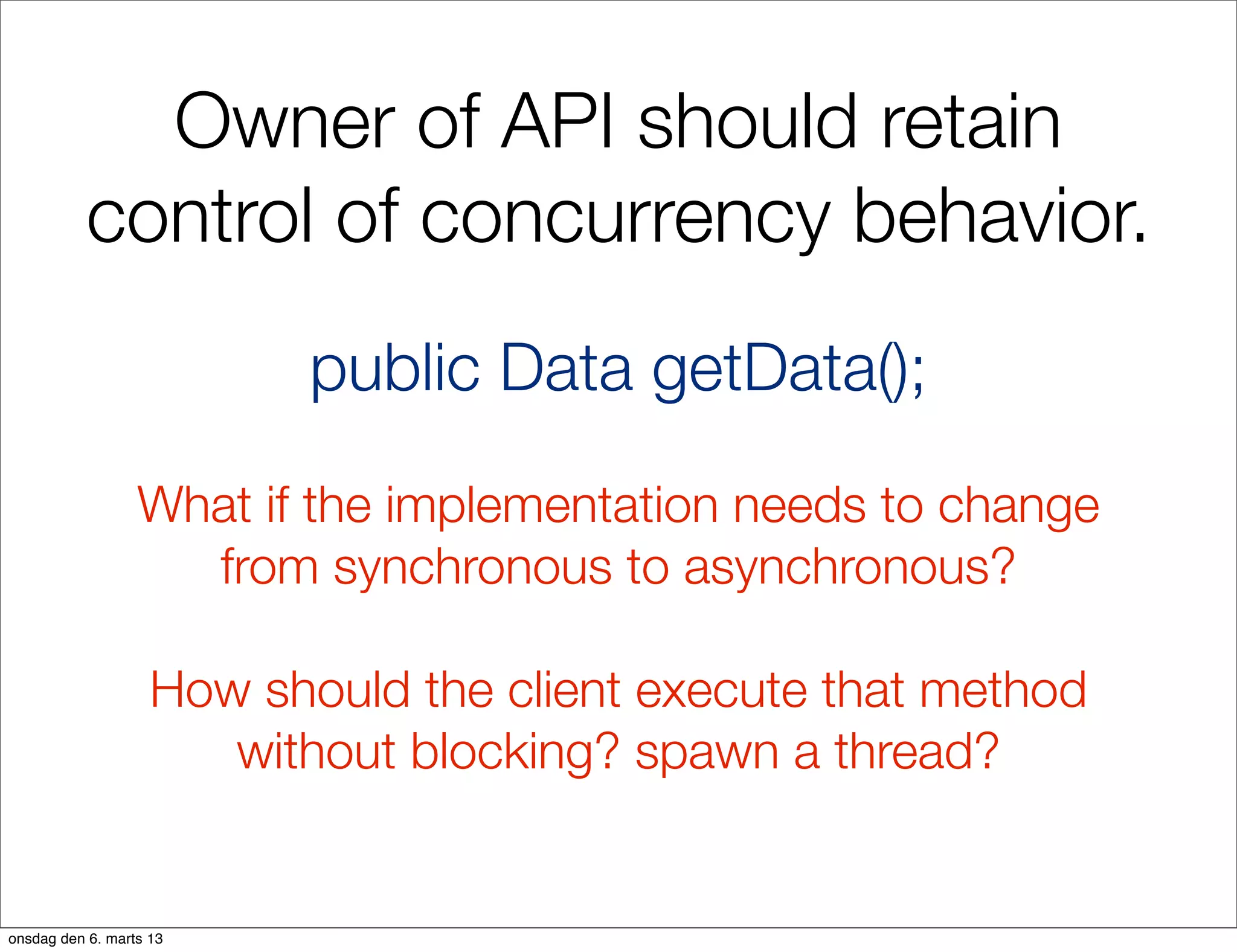
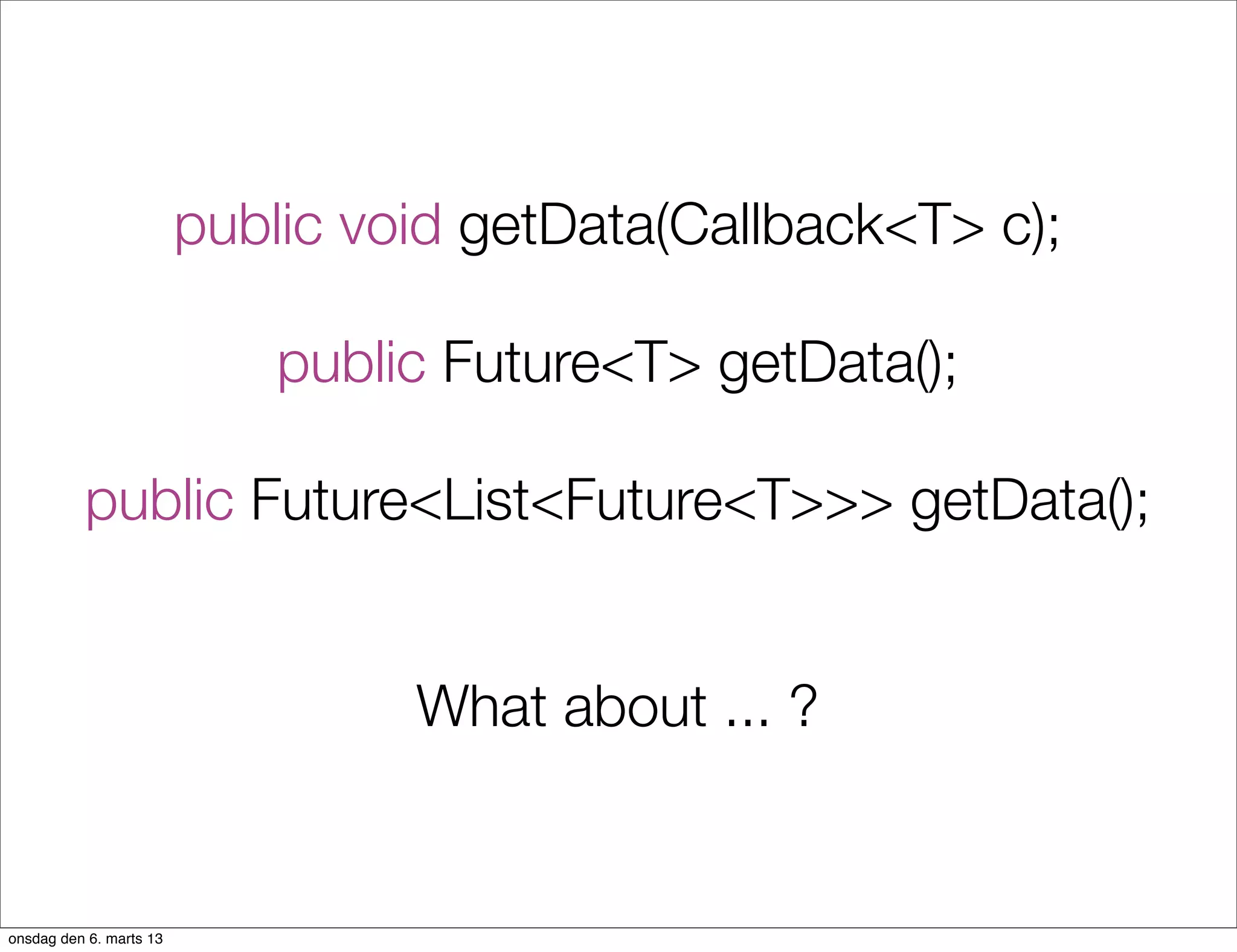
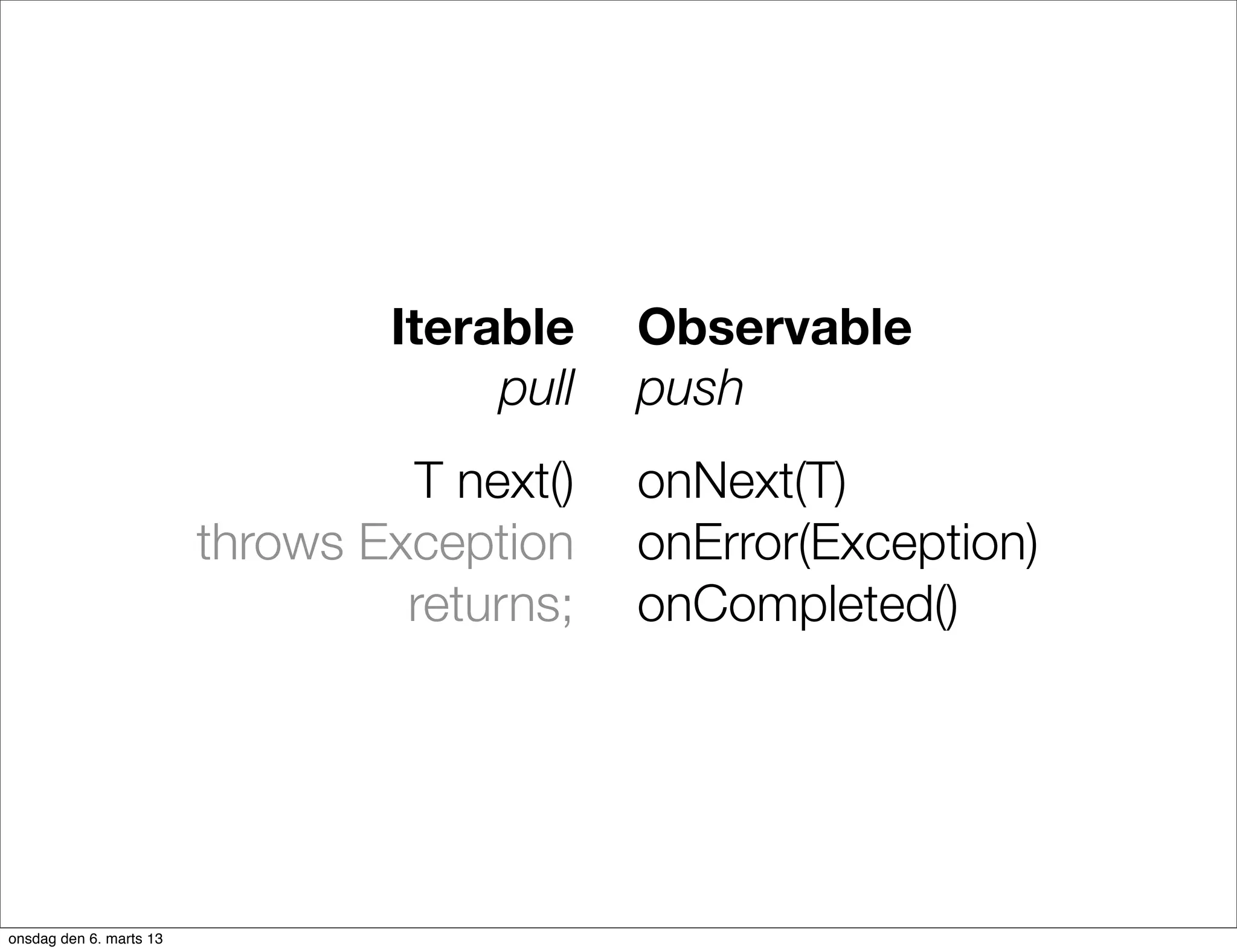
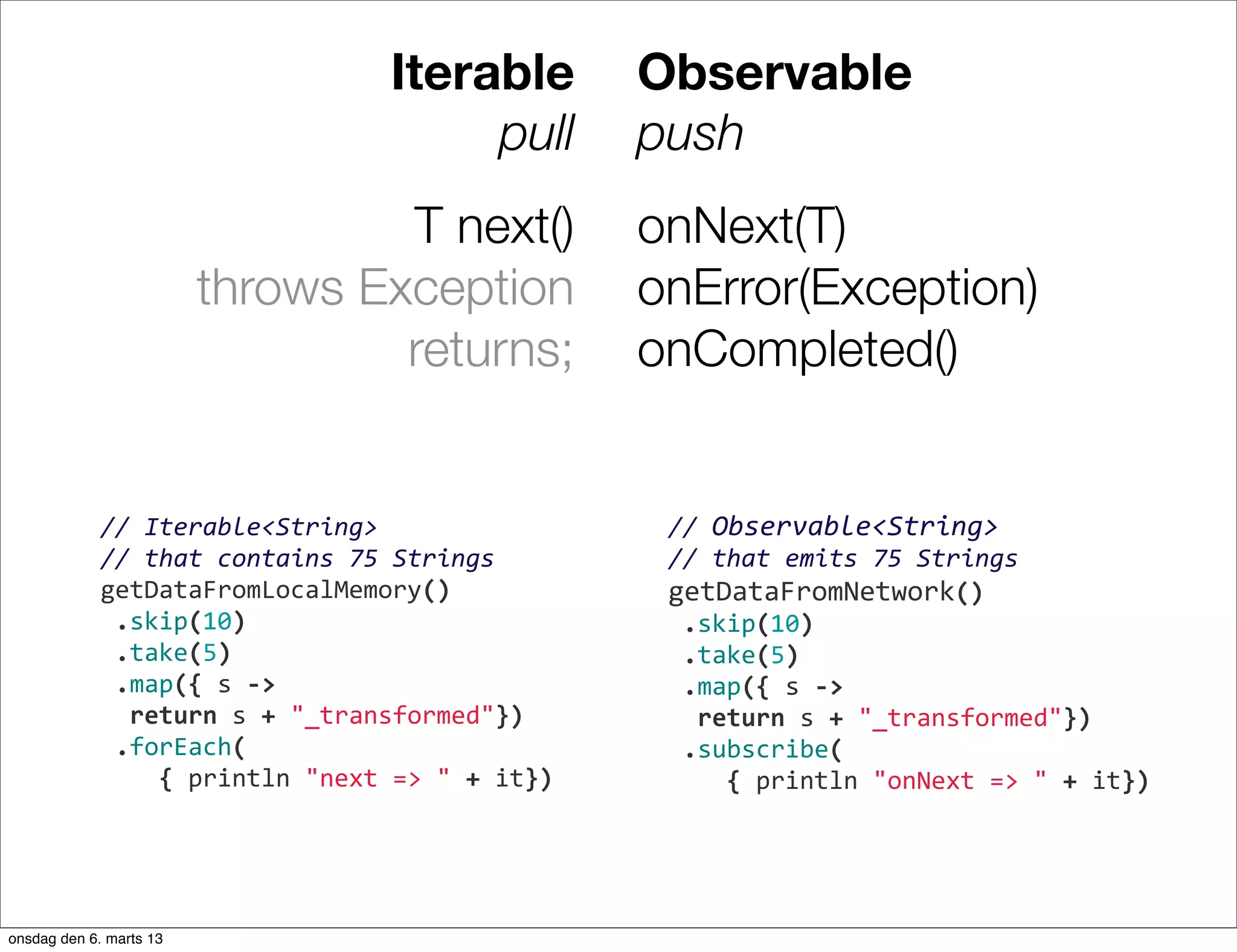
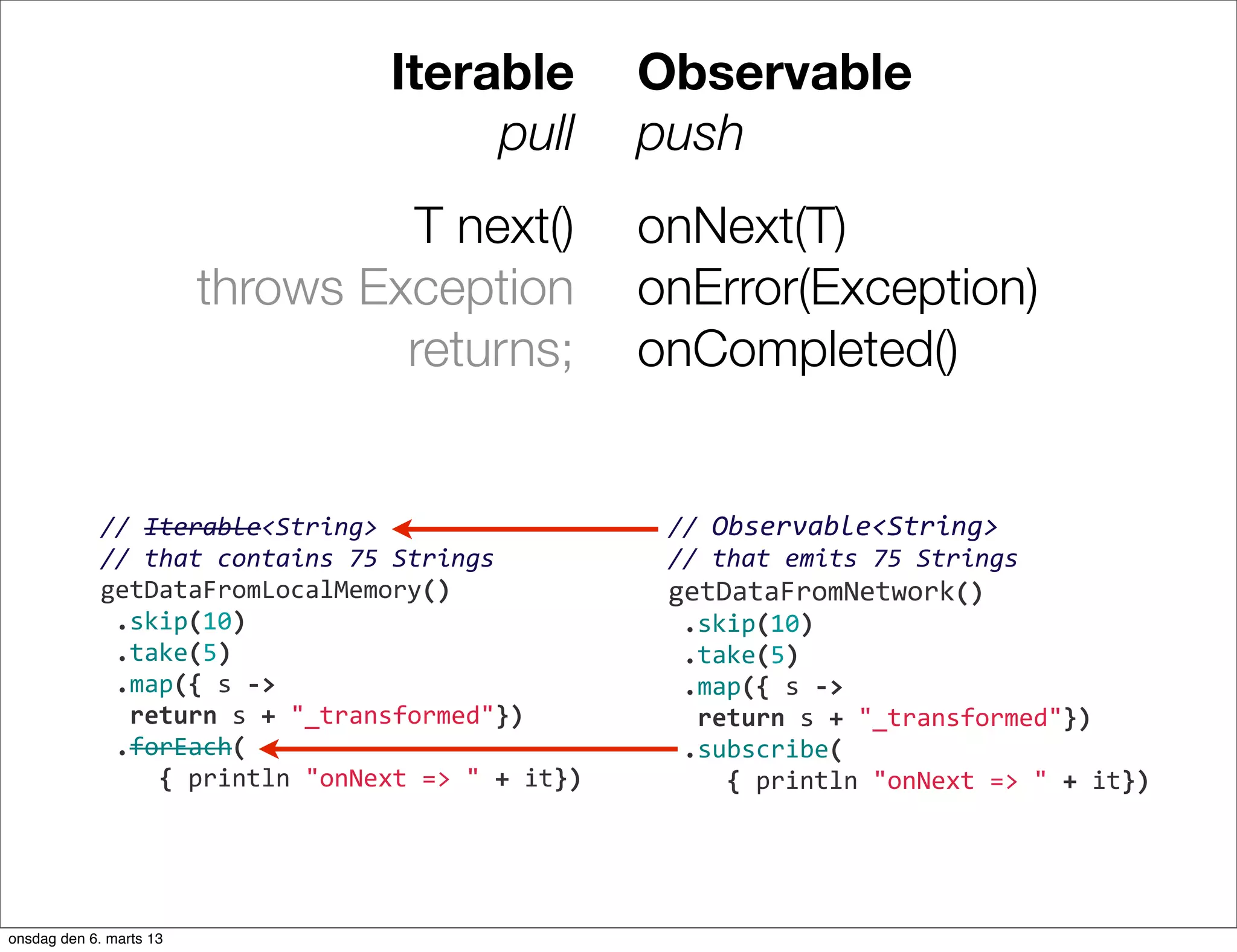
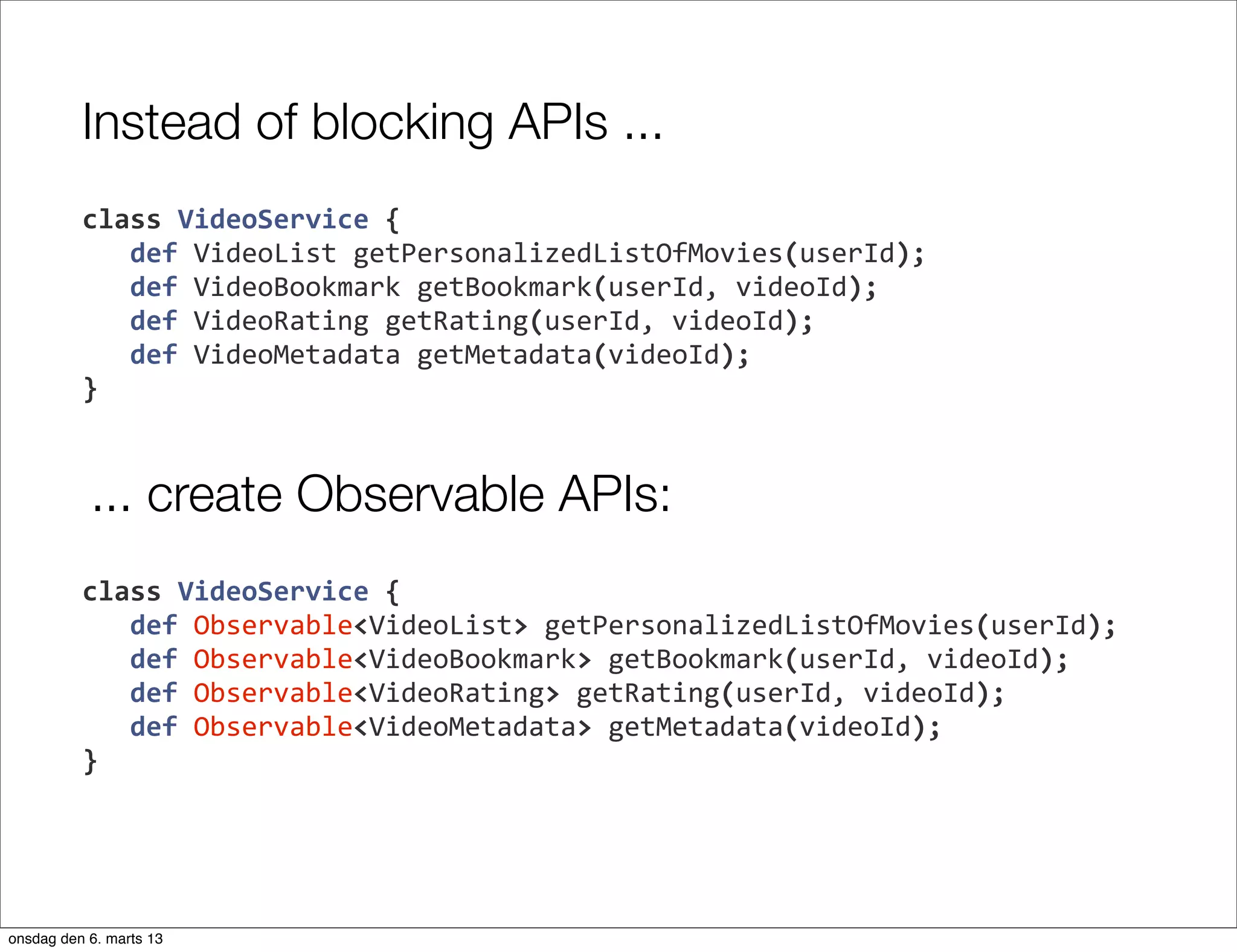
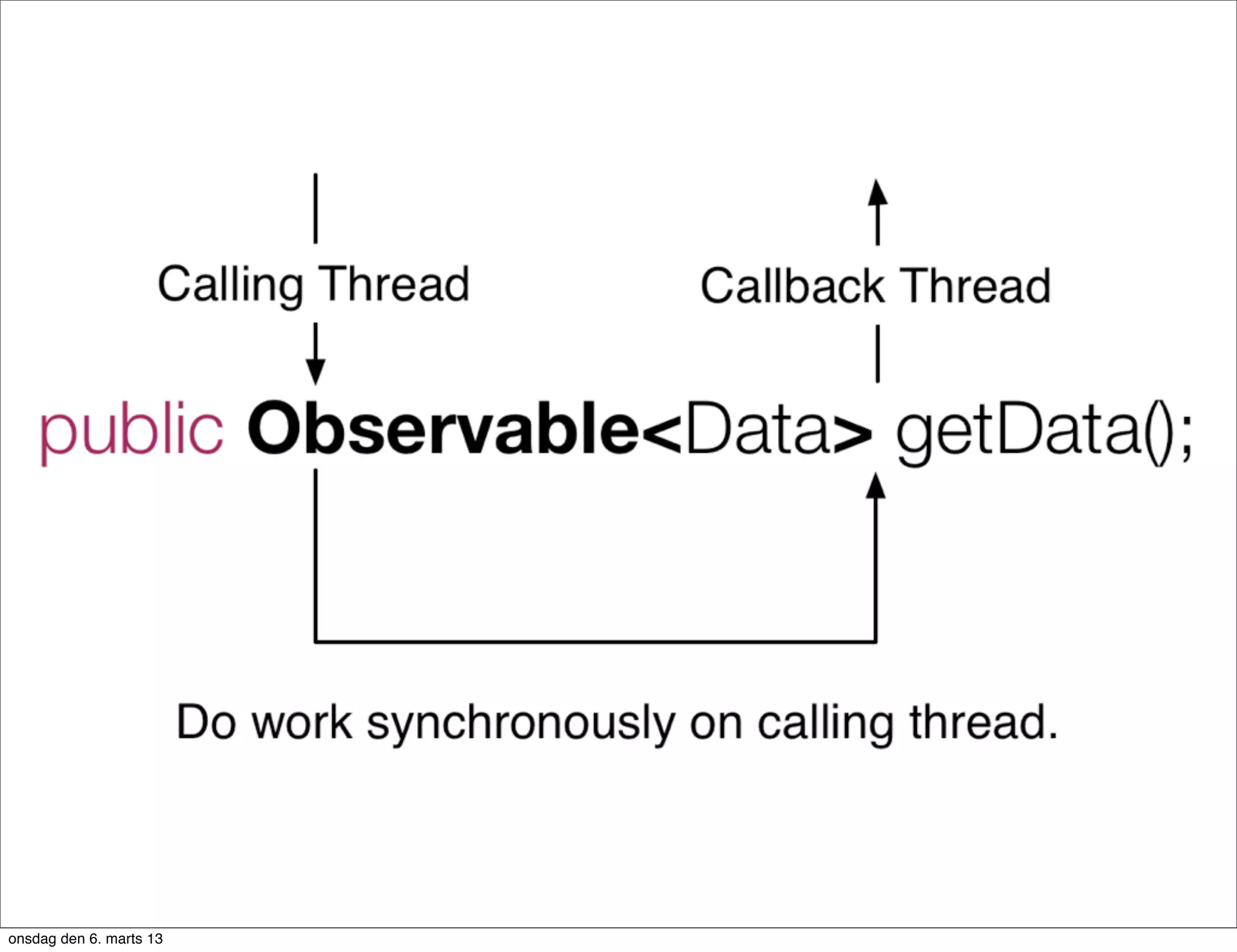
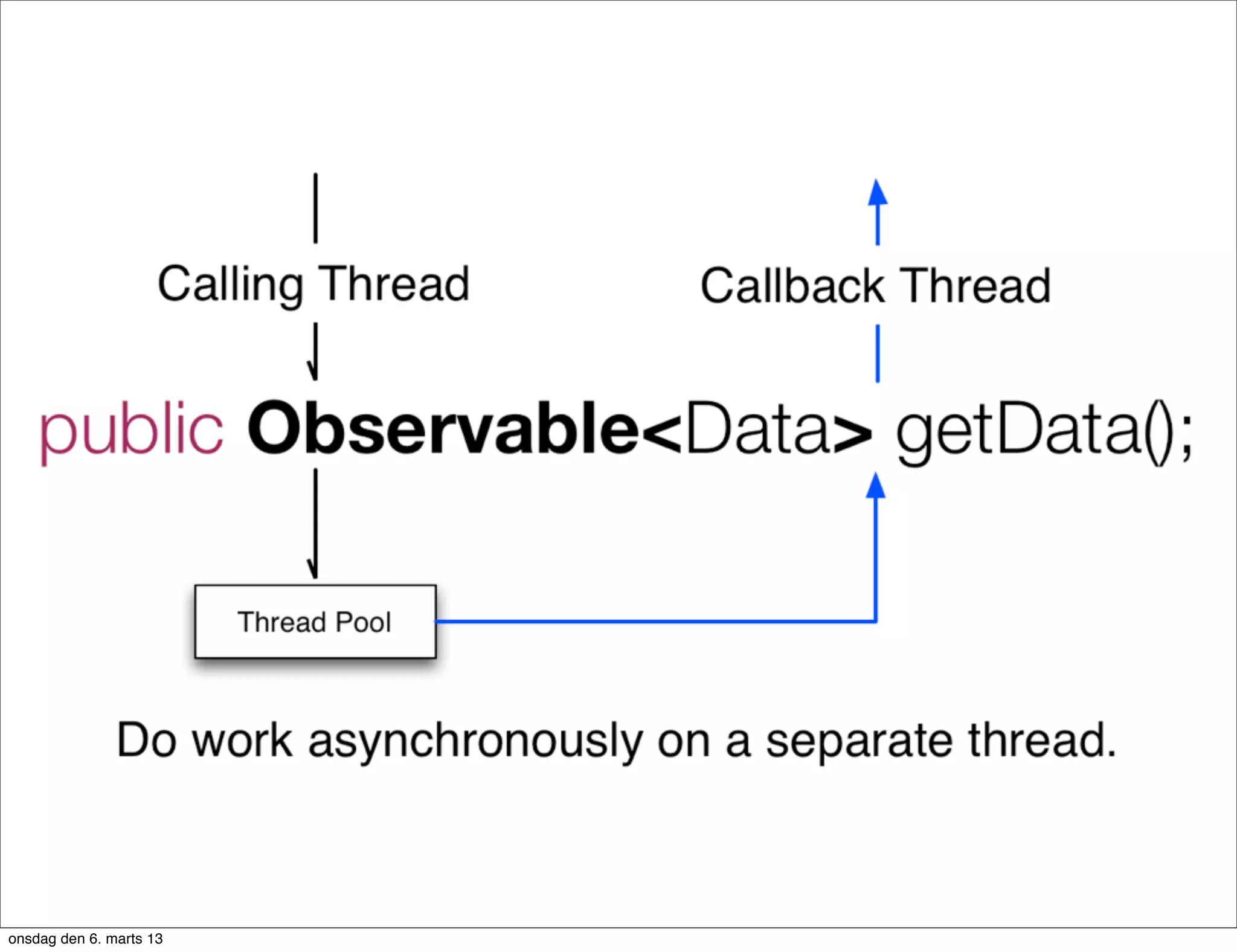
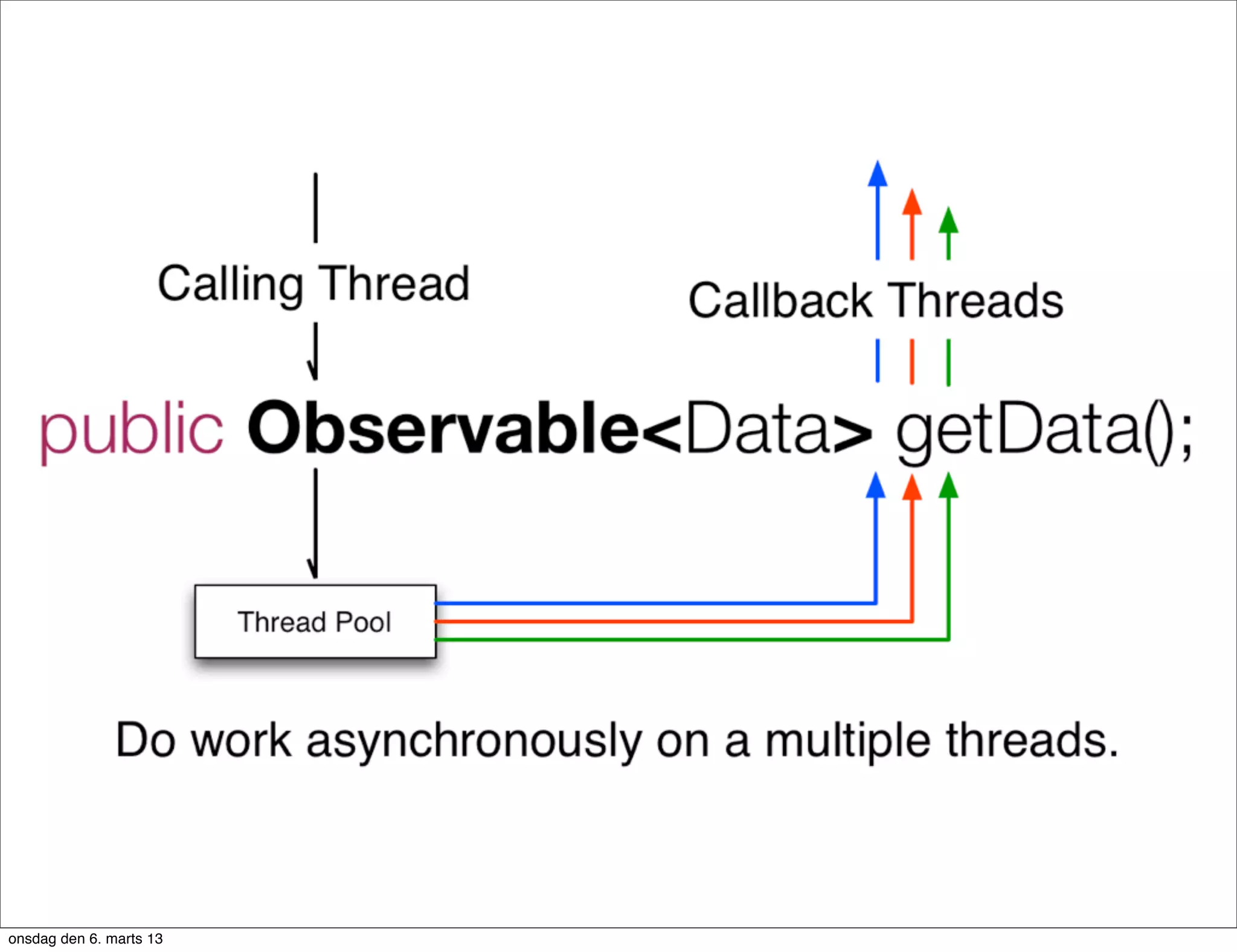
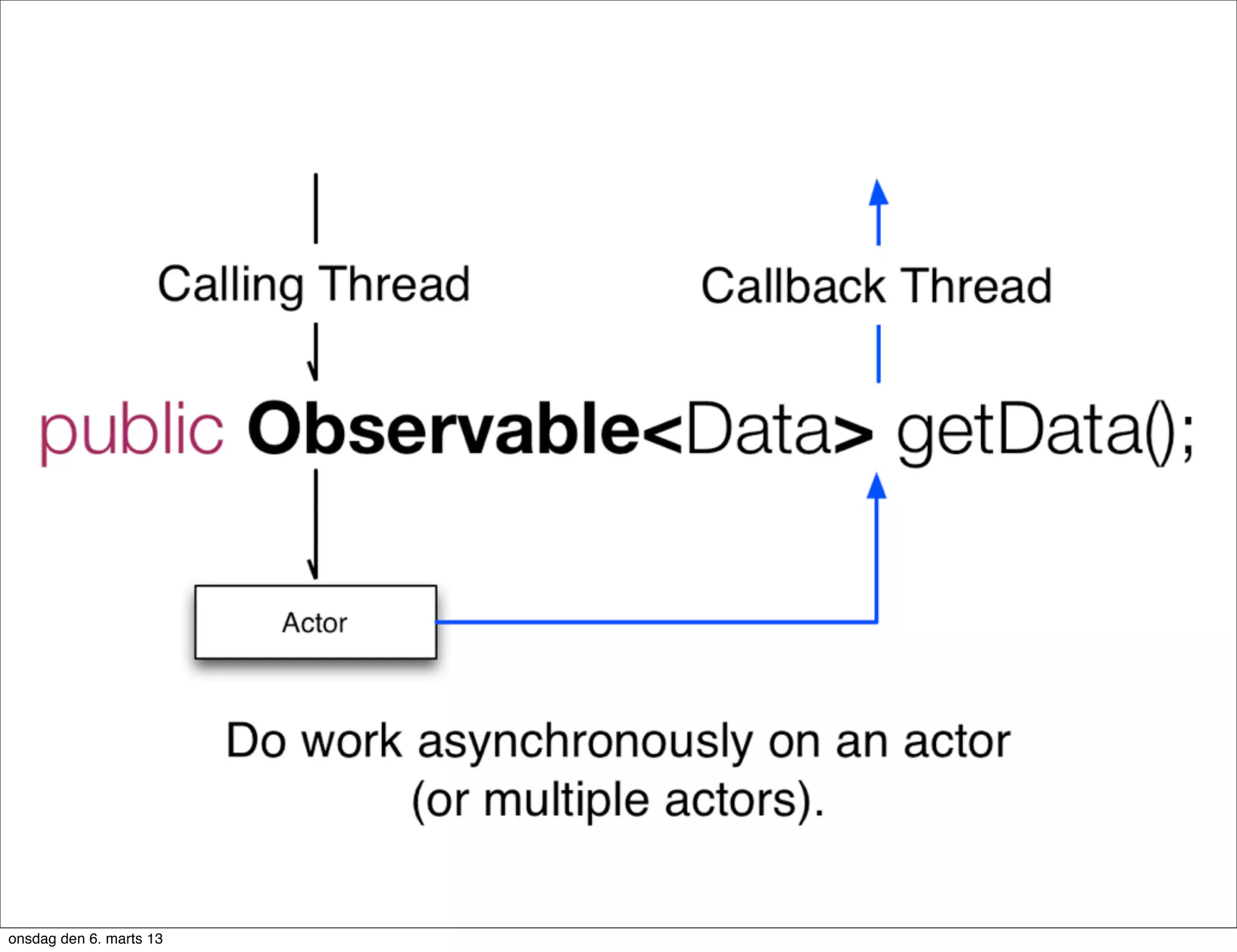
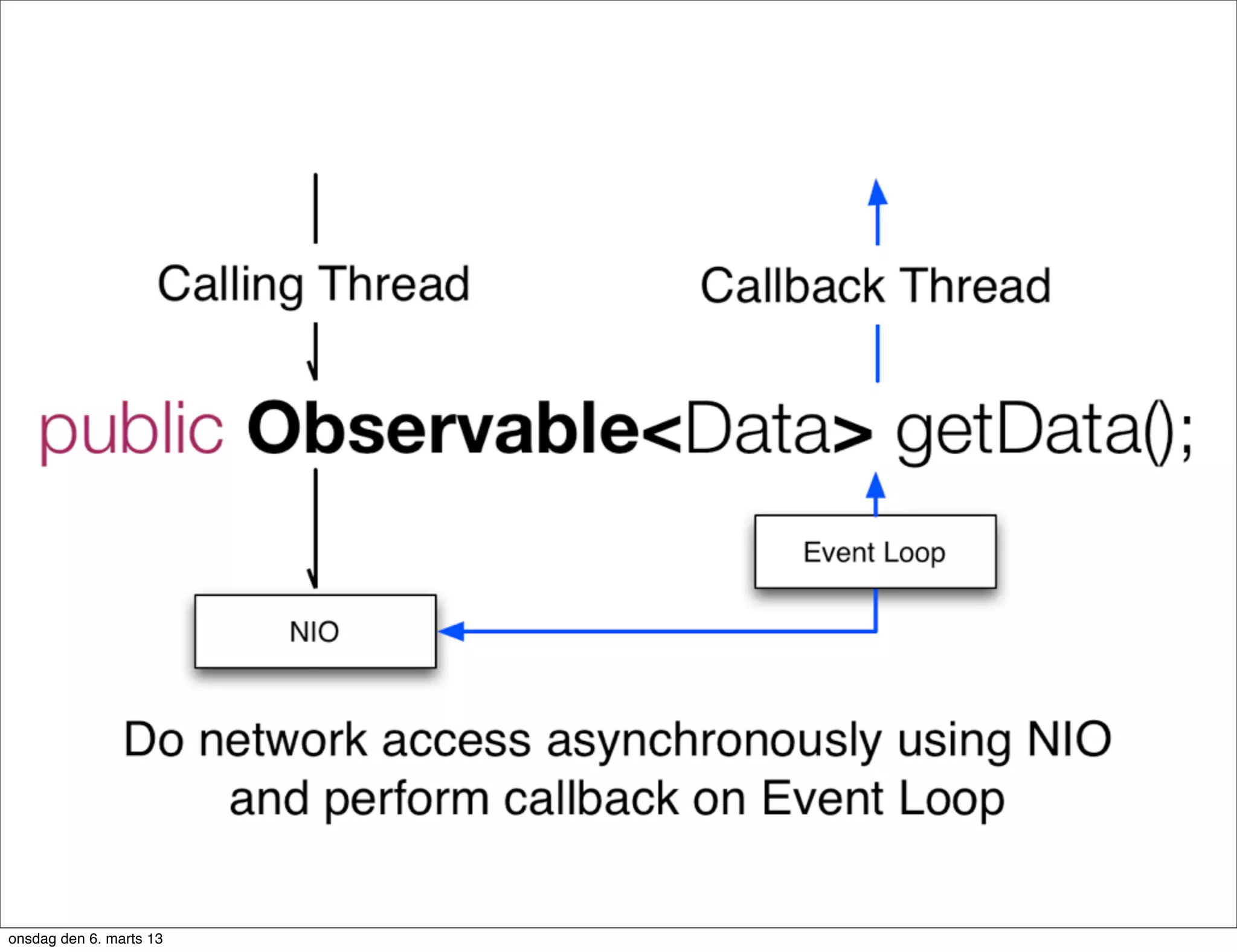
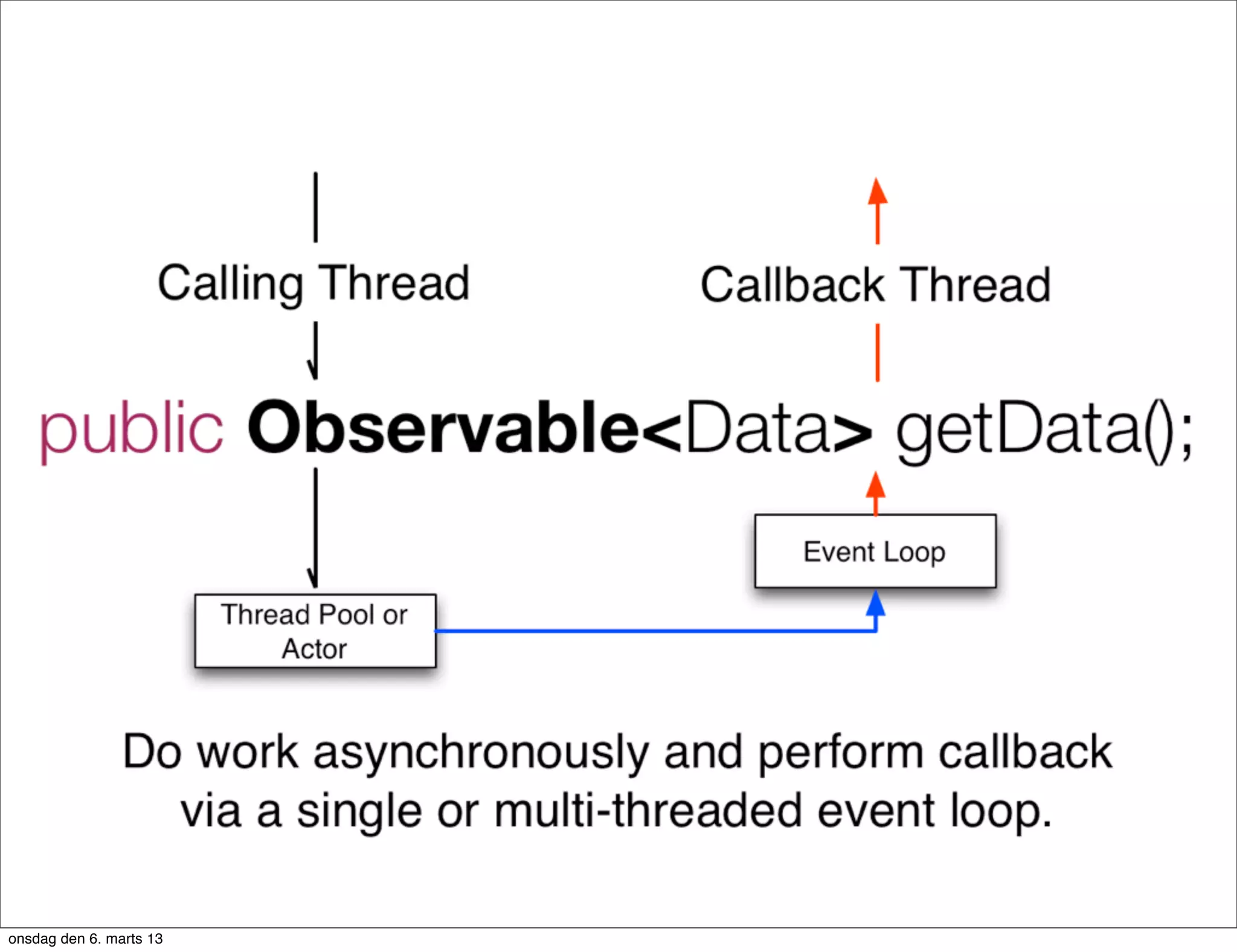
![Observable.toObservable("one", "two", "three") .take(2) .subscribe((arg) -‐> { System.out.println(arg); }); Java8 Observable.toObservable("one", "two", "three") .take(2) .subscribe((arg: String) => { println(arg) }) Scala (-‐> (Observable/toObservable ["one" "two" "three"]) (.take 2) (.subscribe (fn [arg] (println arg)))) Clojure Observable.toObservable("one", "two", "three") .take(2) .subscribe({arg -‐> println(arg)}) Groovy Observable.toObservable("one", "two", "three") .take(2) .subscribe(lambda { |arg| puts arg }) JRuby onsdag den 6. marts 13](https://image.slidesharecdn.com/untitled-130422100824-phpapp02/75/Functional-Reactive-Programming-in-the-Netflix-API-37-2048.jpg)
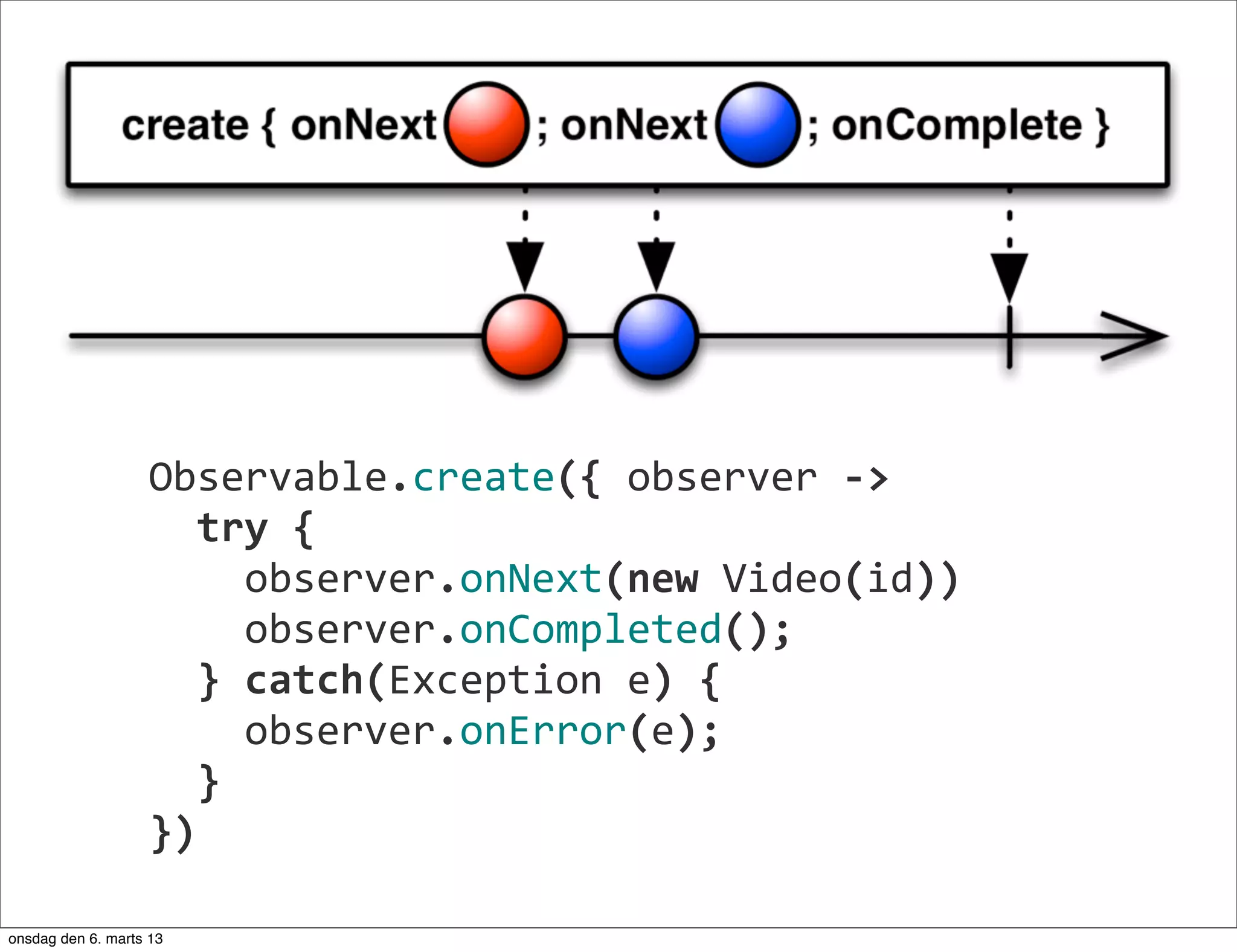
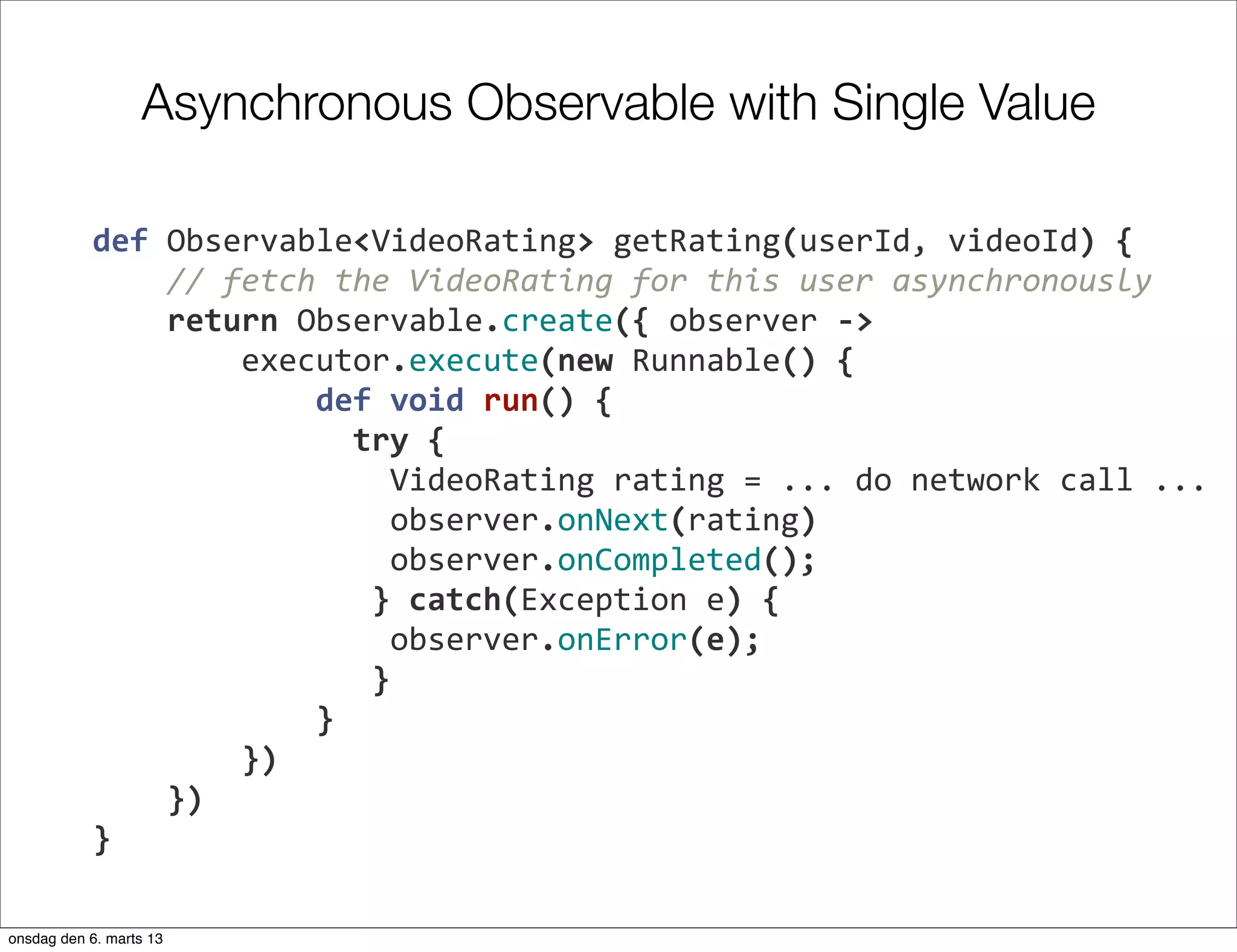
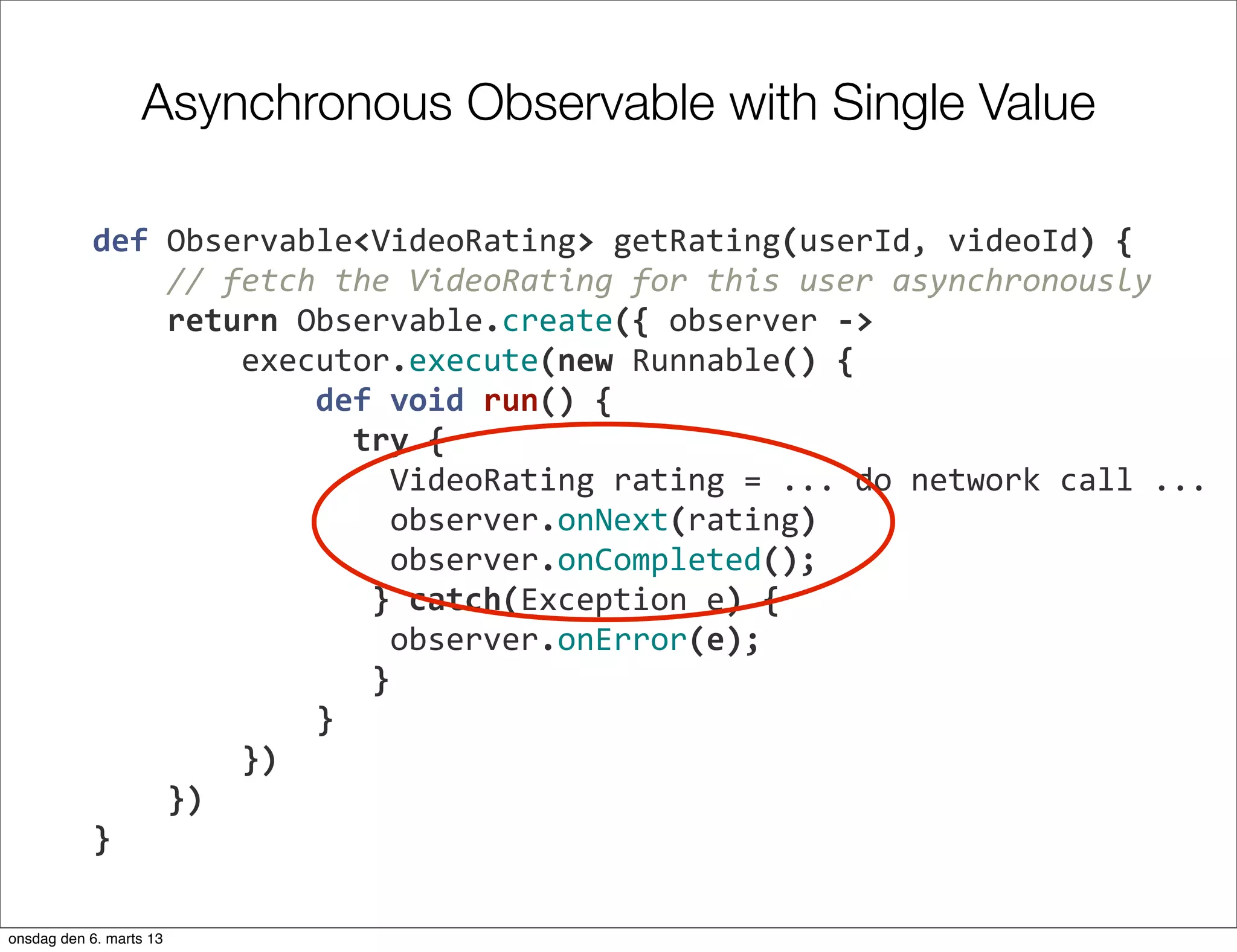
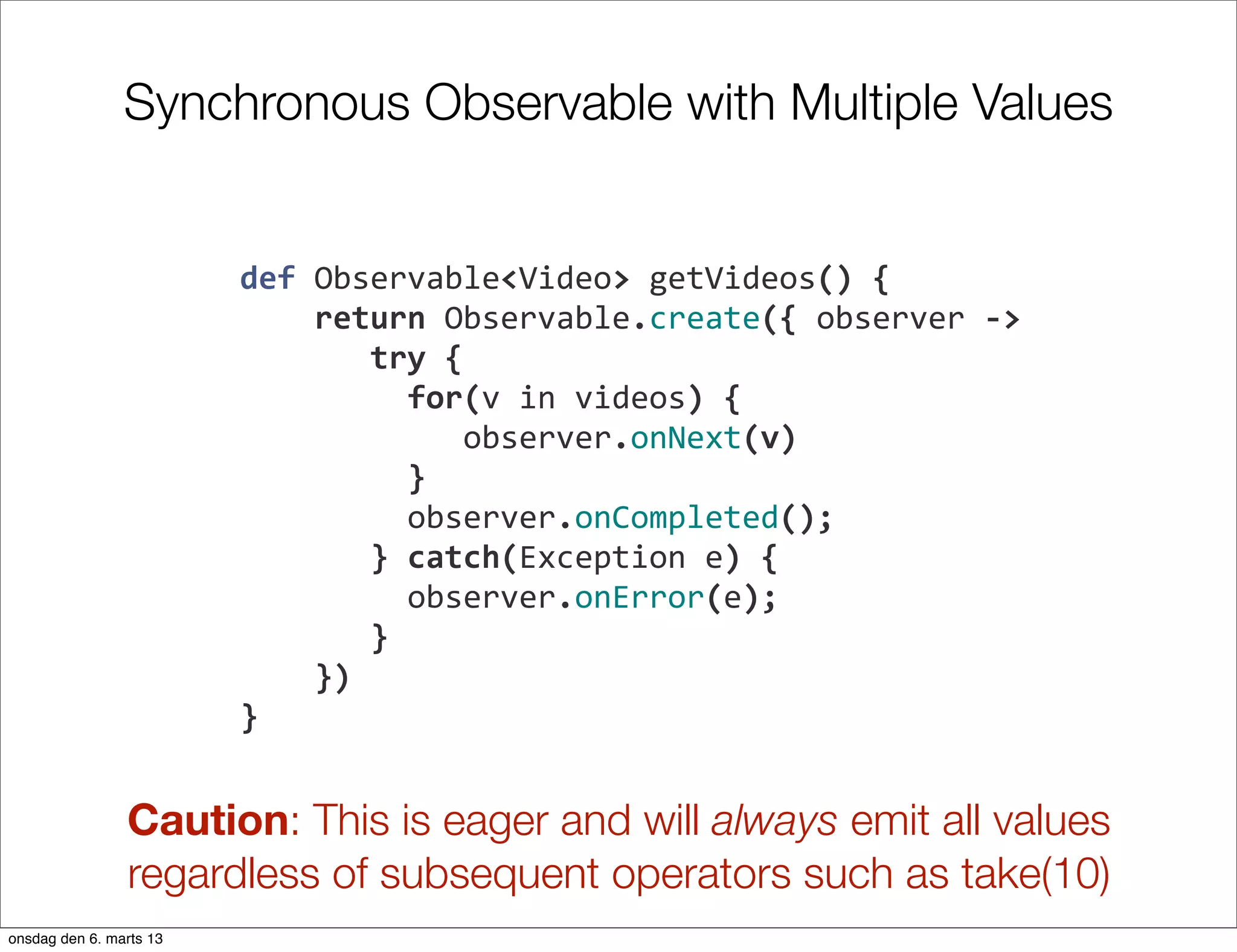
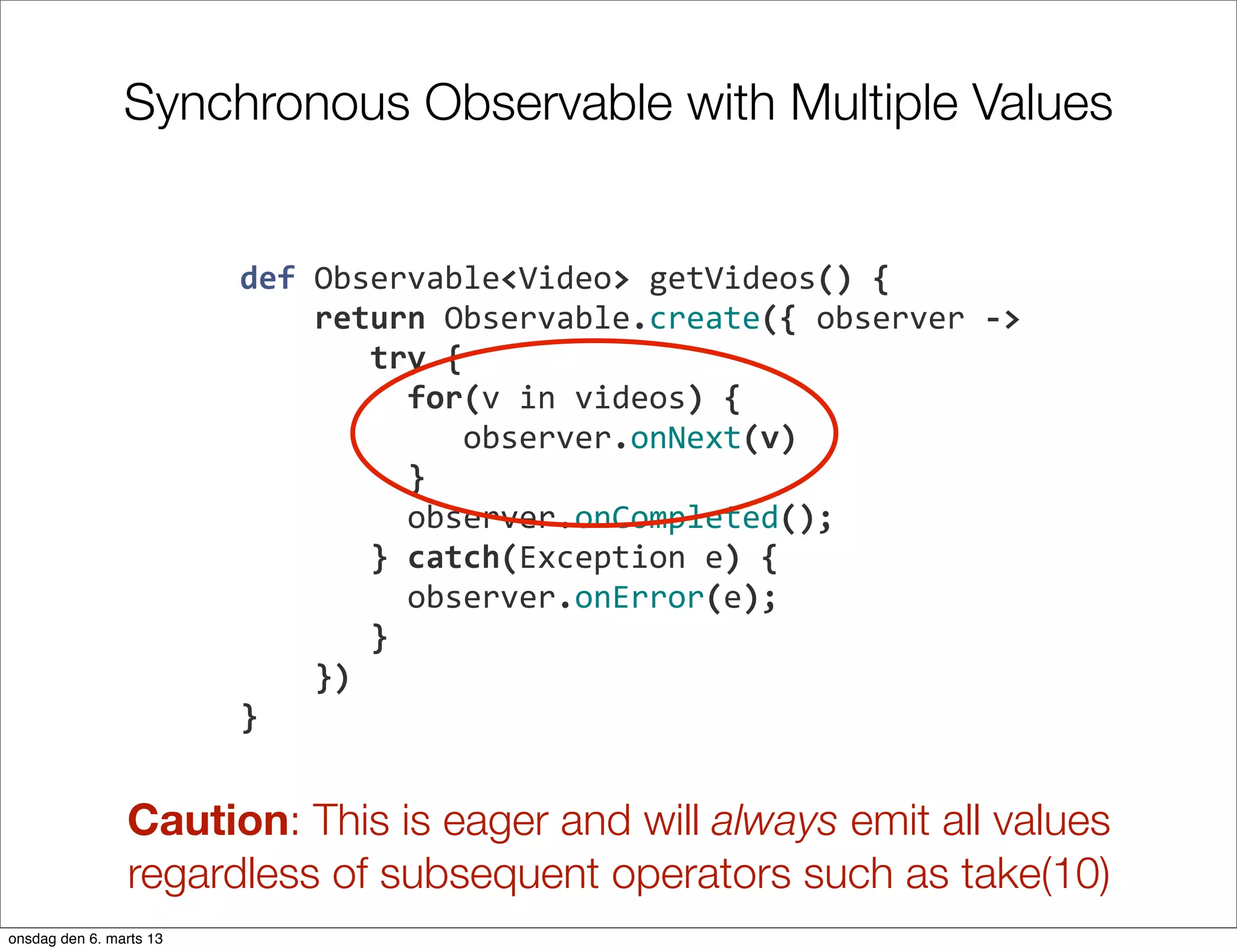
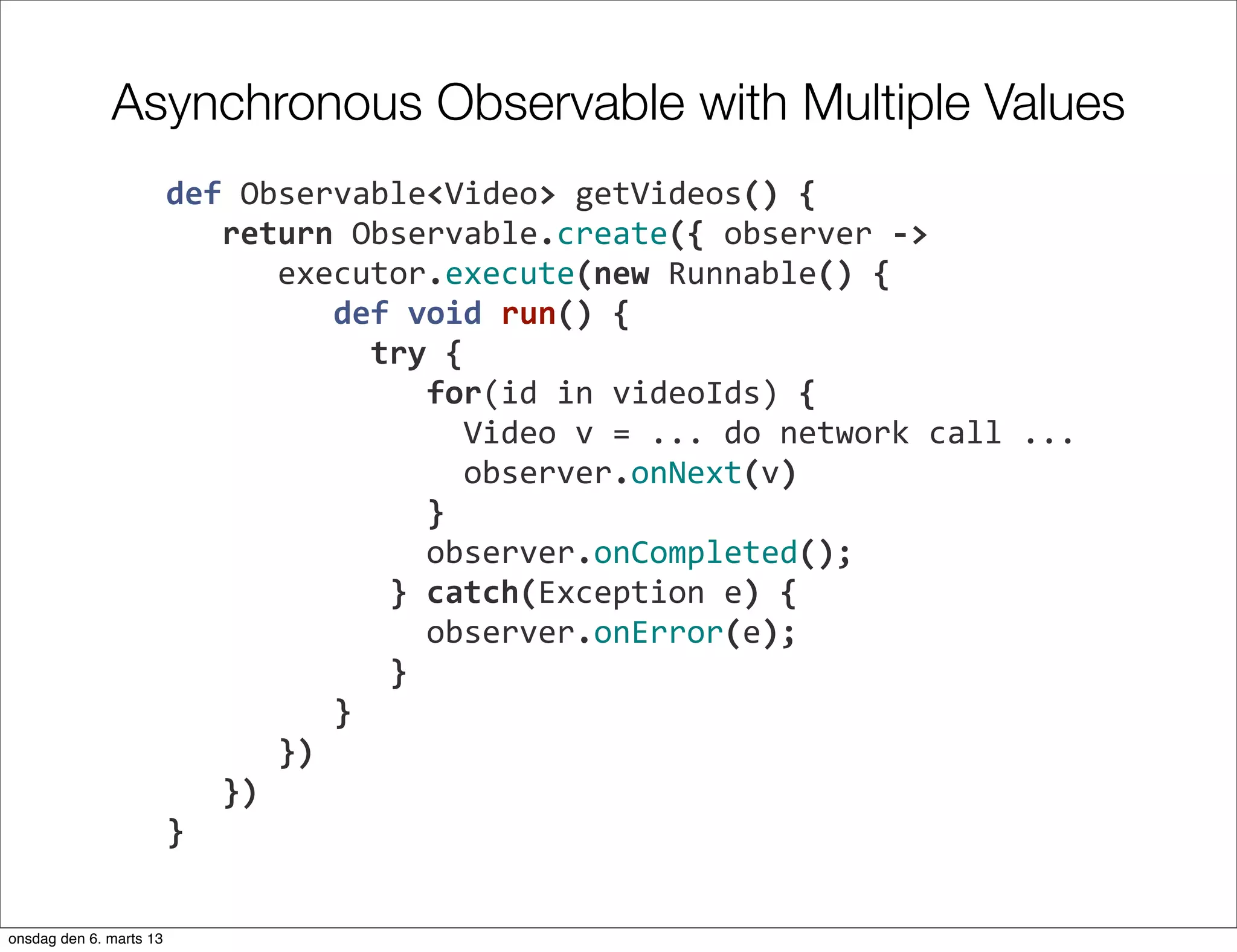
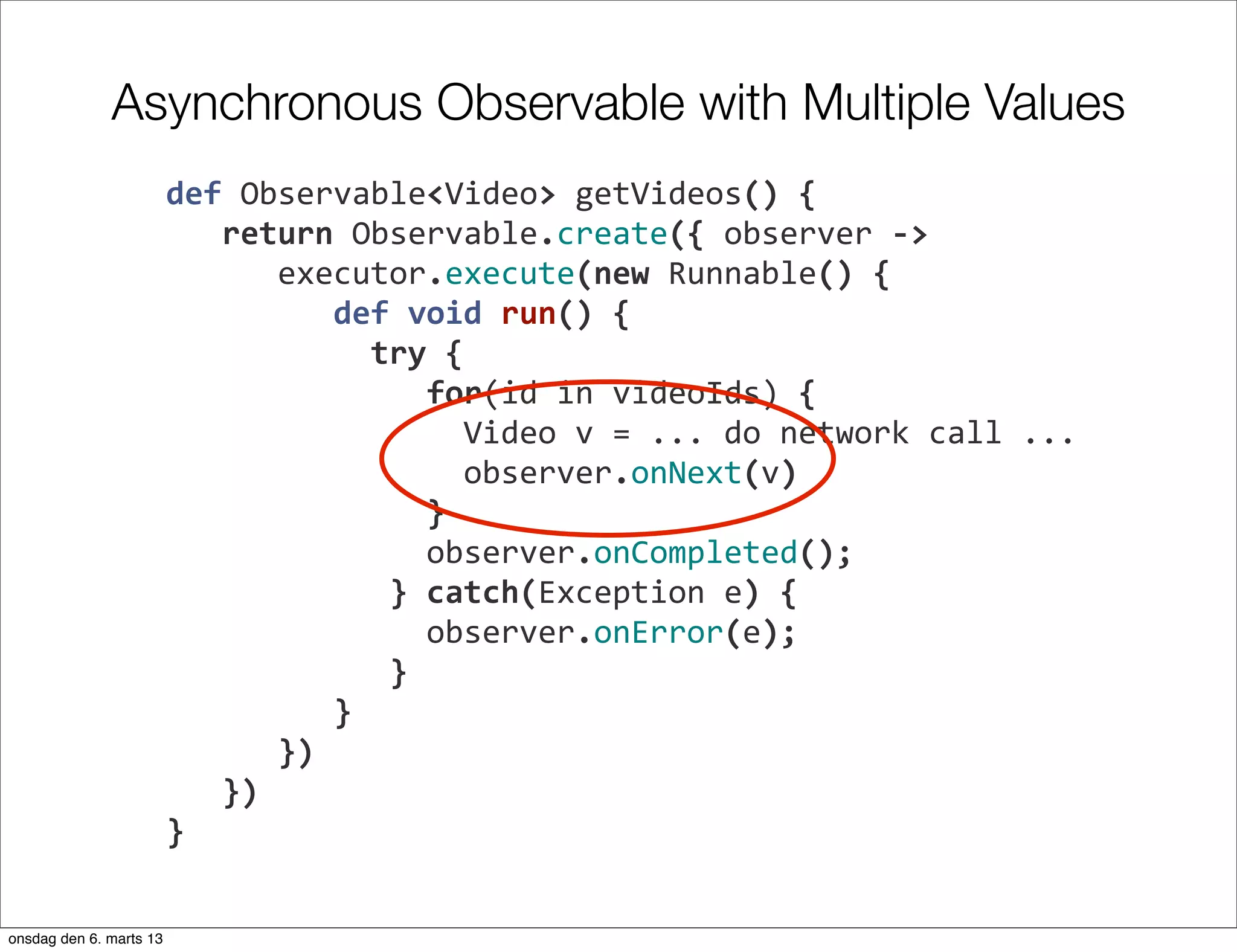
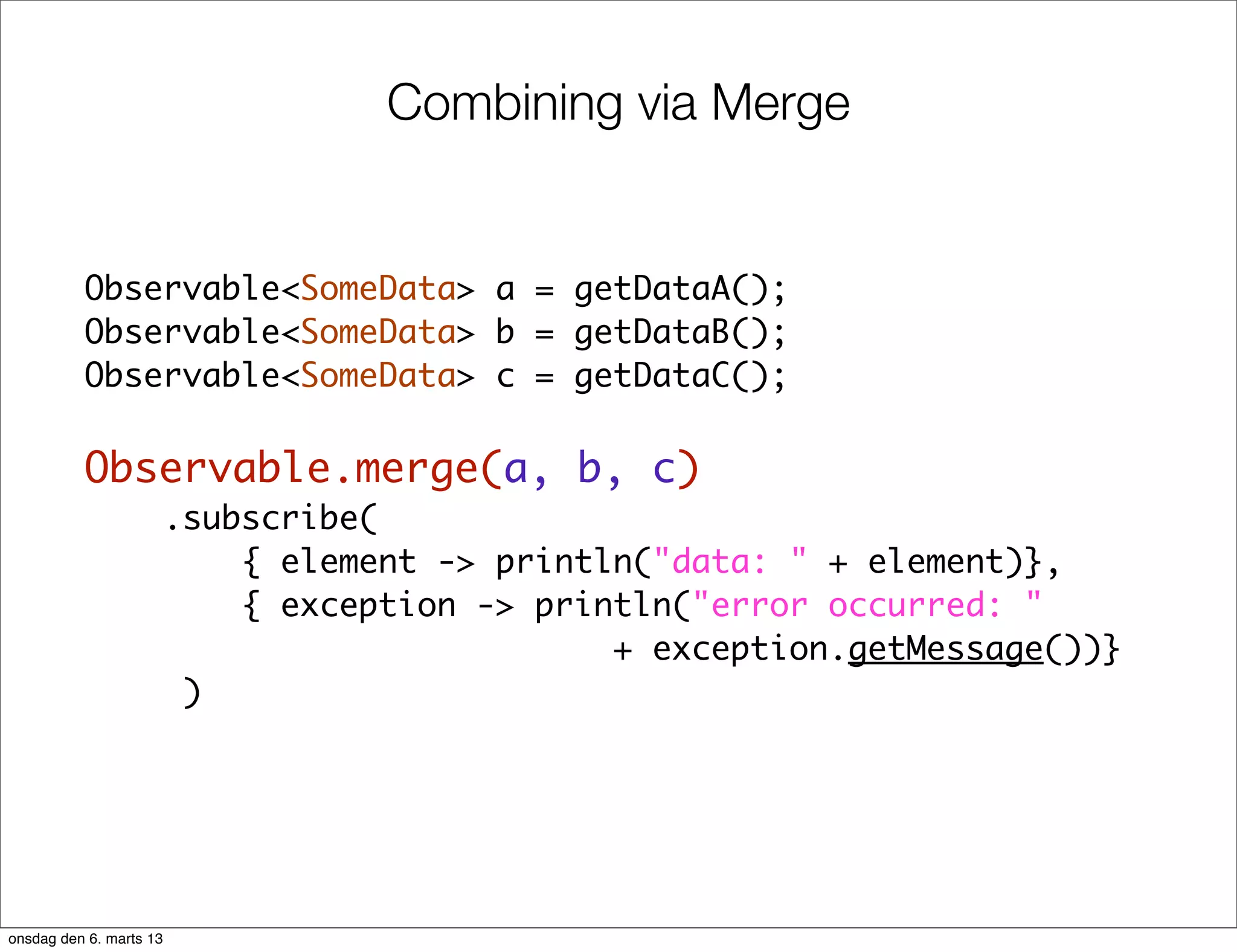
![Observable<SomeData> a = getDataA(); Observable<String> b = getDataB(); Observable<MoreData> c = getDataC(); Observable.zip(a, b, c, {x, y, z -> [x, y, z]}) .subscribe( { triple -> println("a: " + triple[0] + " b: " + triple[1] + " c: " + triple[2])}, { exception -> println("error occurred: " + exception.getMessage())} ) Combining via Zip onsdag den 6. marts 13](https://image.slidesharecdn.com/untitled-130422100824-phpapp02/75/Functional-Reactive-Programming-in-the-Netflix-API-46-2048.jpg)
![Observable<SomeData> a = getDataA(); Observable<String> b = getDataB(); Observable<MoreData> c = getDataC(); Observable.zip(a, b, c, {x, y, z -> [x, y, z]}) .subscribe( { triple -> println("a: " + triple[0] + " b: " + triple[1] + " c: " + triple[2])}, { exception -> println("error occurred: " + exception.getMessage())} ) Error Handling onsdag den 6. marts 13](https://image.slidesharecdn.com/untitled-130422100824-phpapp02/75/Functional-Reactive-Programming-in-the-Netflix-API-47-2048.jpg)
![Observable<SomeData> a = getDataA(); Observable<String> b = getDataB(); Observable<MoreData> c = getDataC() .onErrorResumeNext(getFallbackForDataC()); Observable.zip(a, b, c, {x, y, z -> [x, y, z]}) .subscribe( { triple -> println("a: " + triple[0] + " b: " + triple[1] + " c: " + triple[2])}, { exception -> println("error occurred: " + exception.getMessage())} ) Error Handling onsdag den 6. marts 13](https://image.slidesharecdn.com/untitled-130422100824-phpapp02/75/Functional-Reactive-Programming-in-the-Netflix-API-48-2048.jpg)
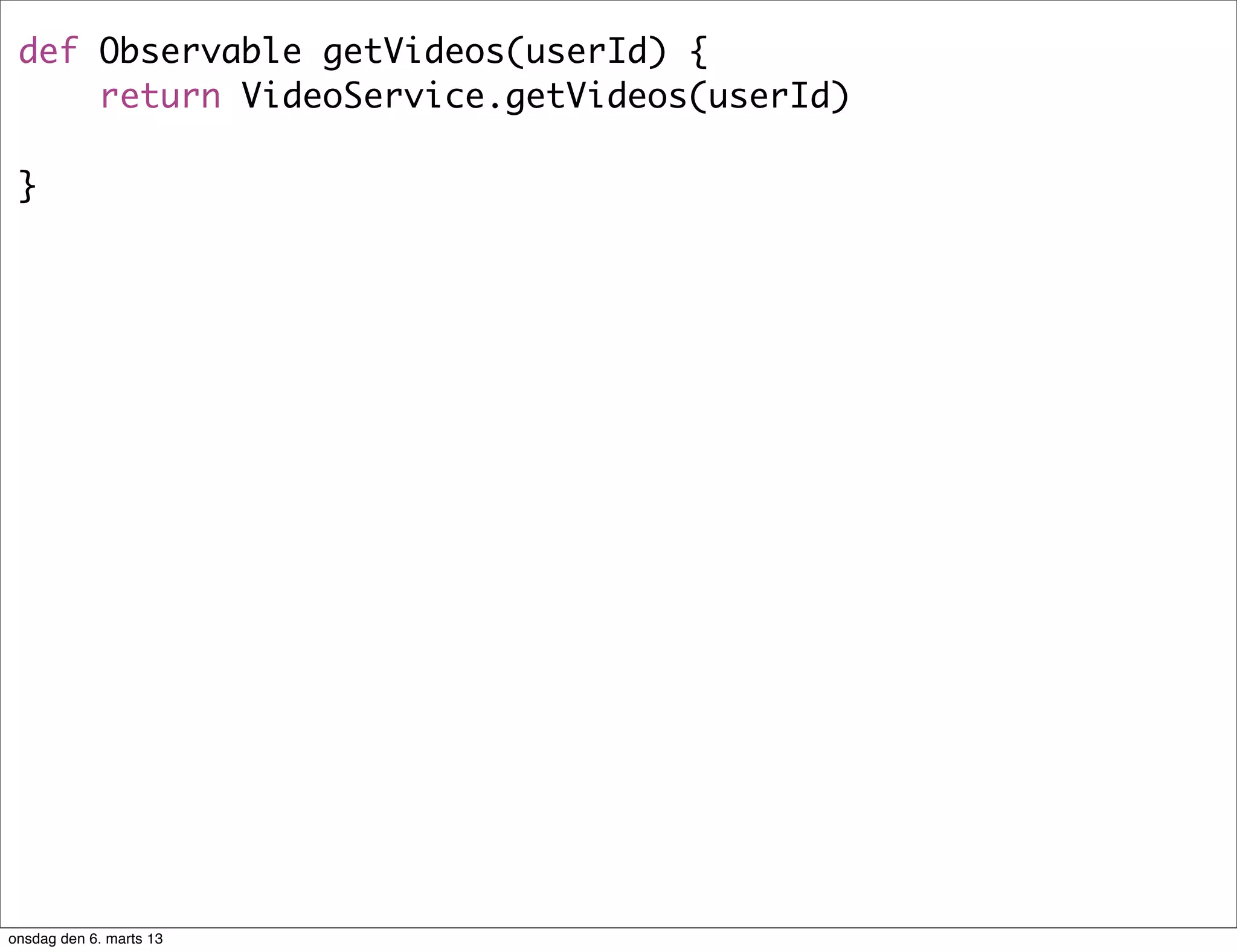
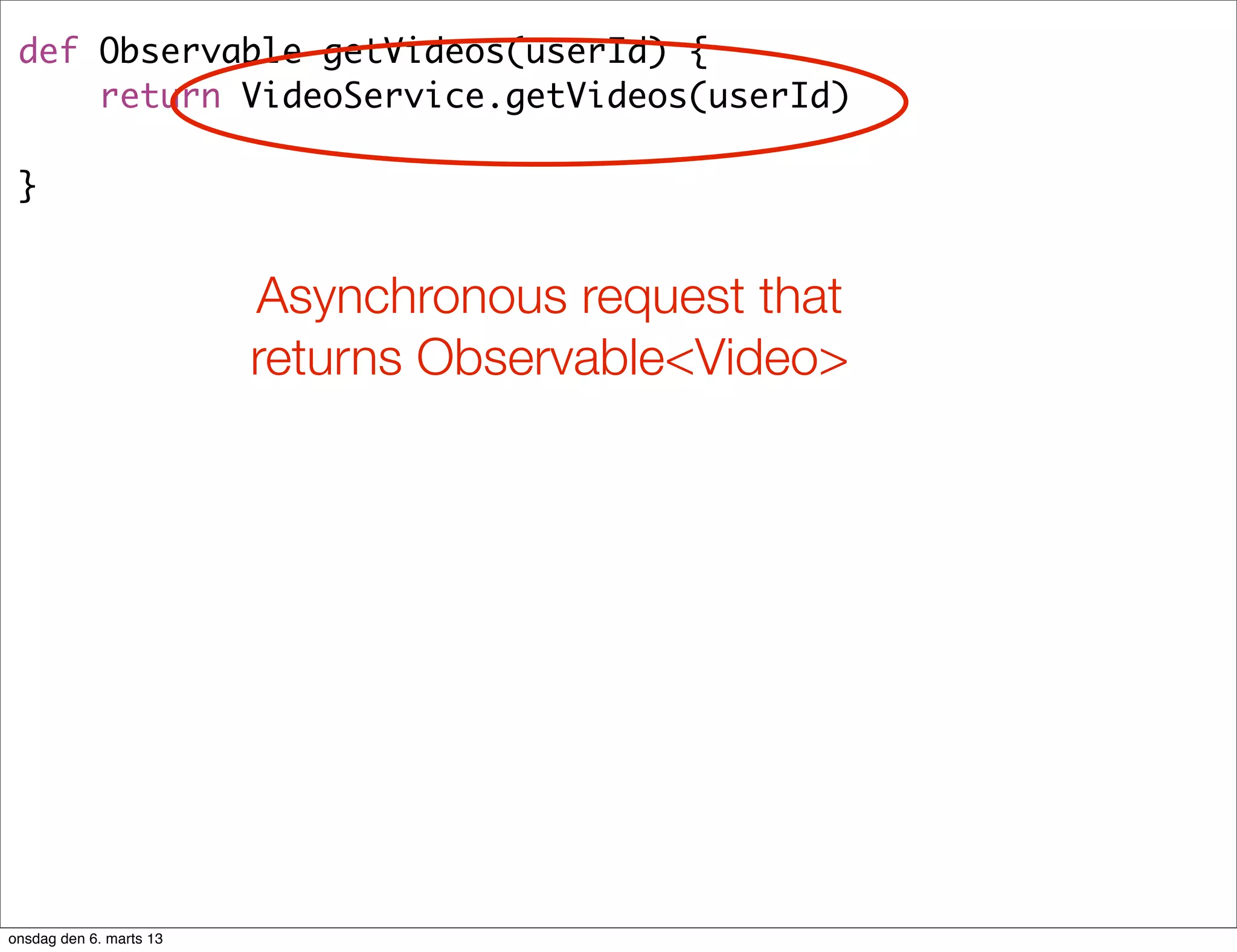
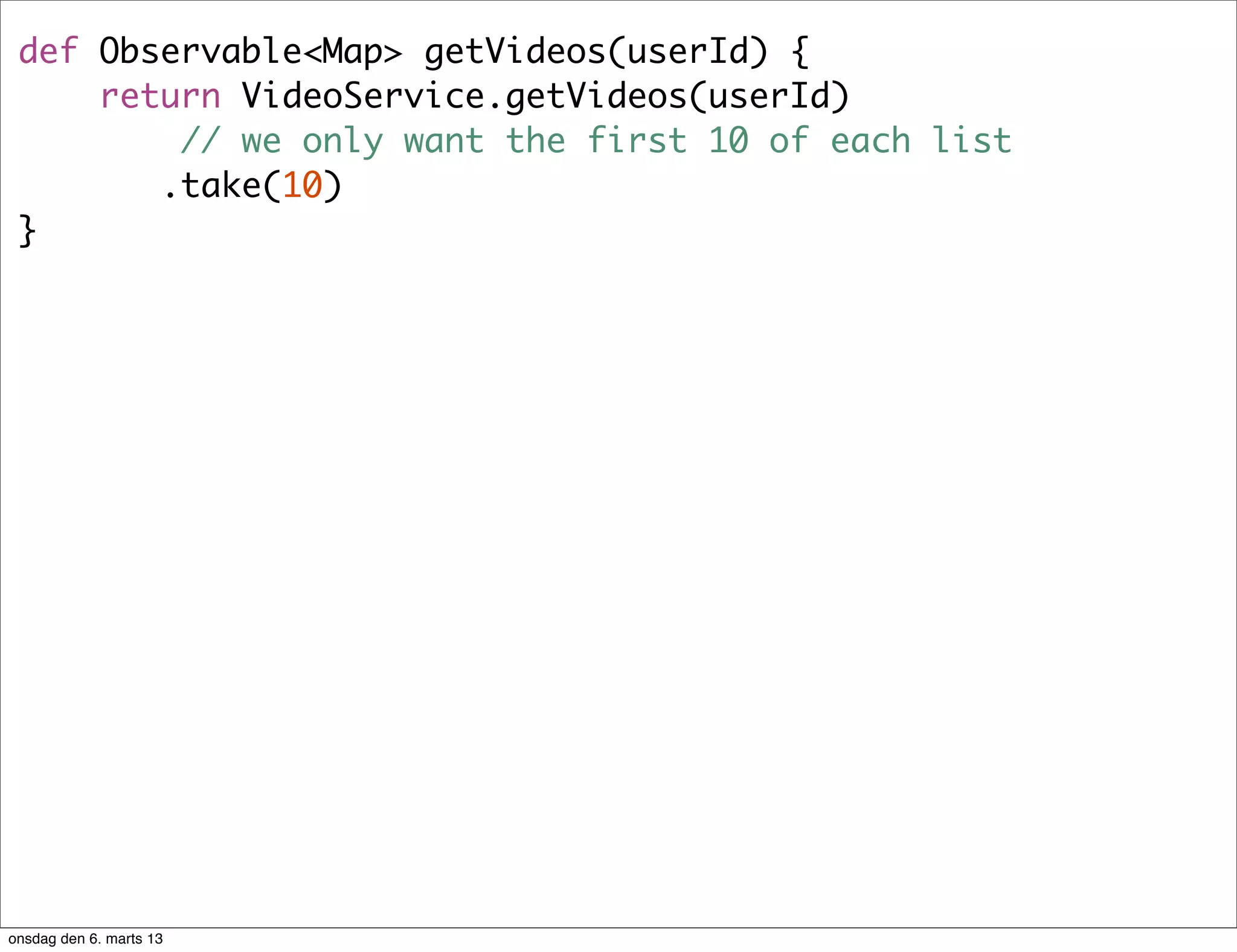
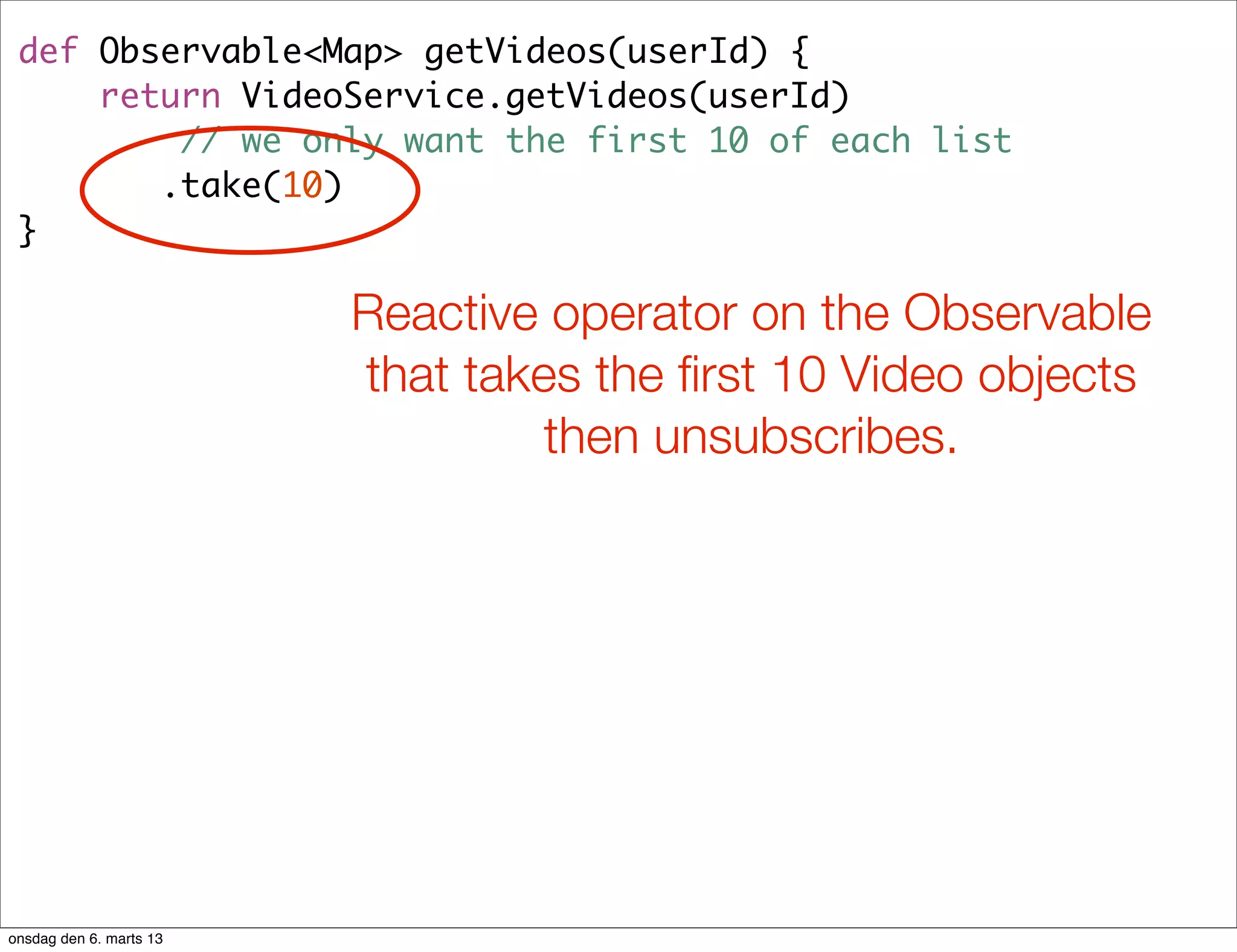
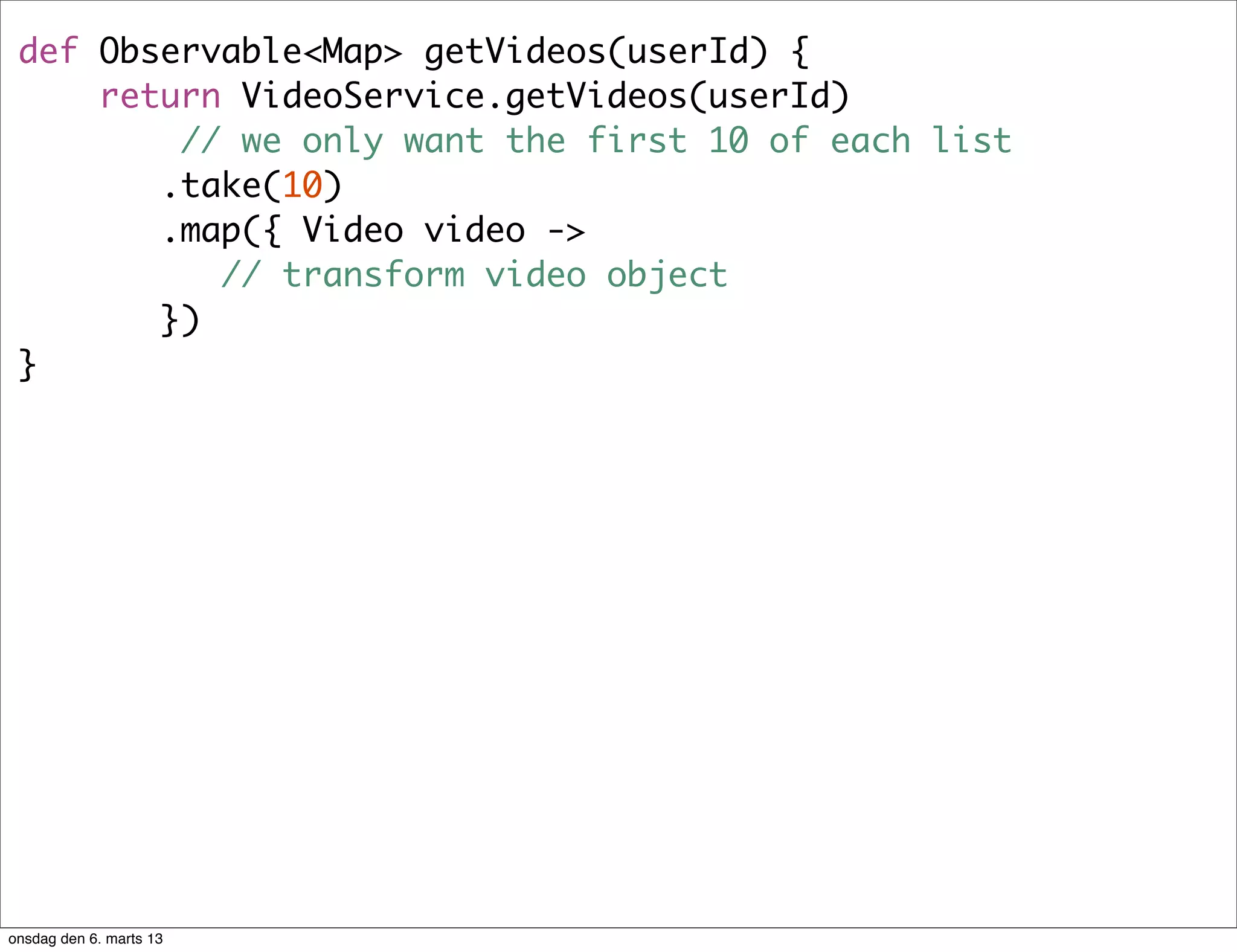
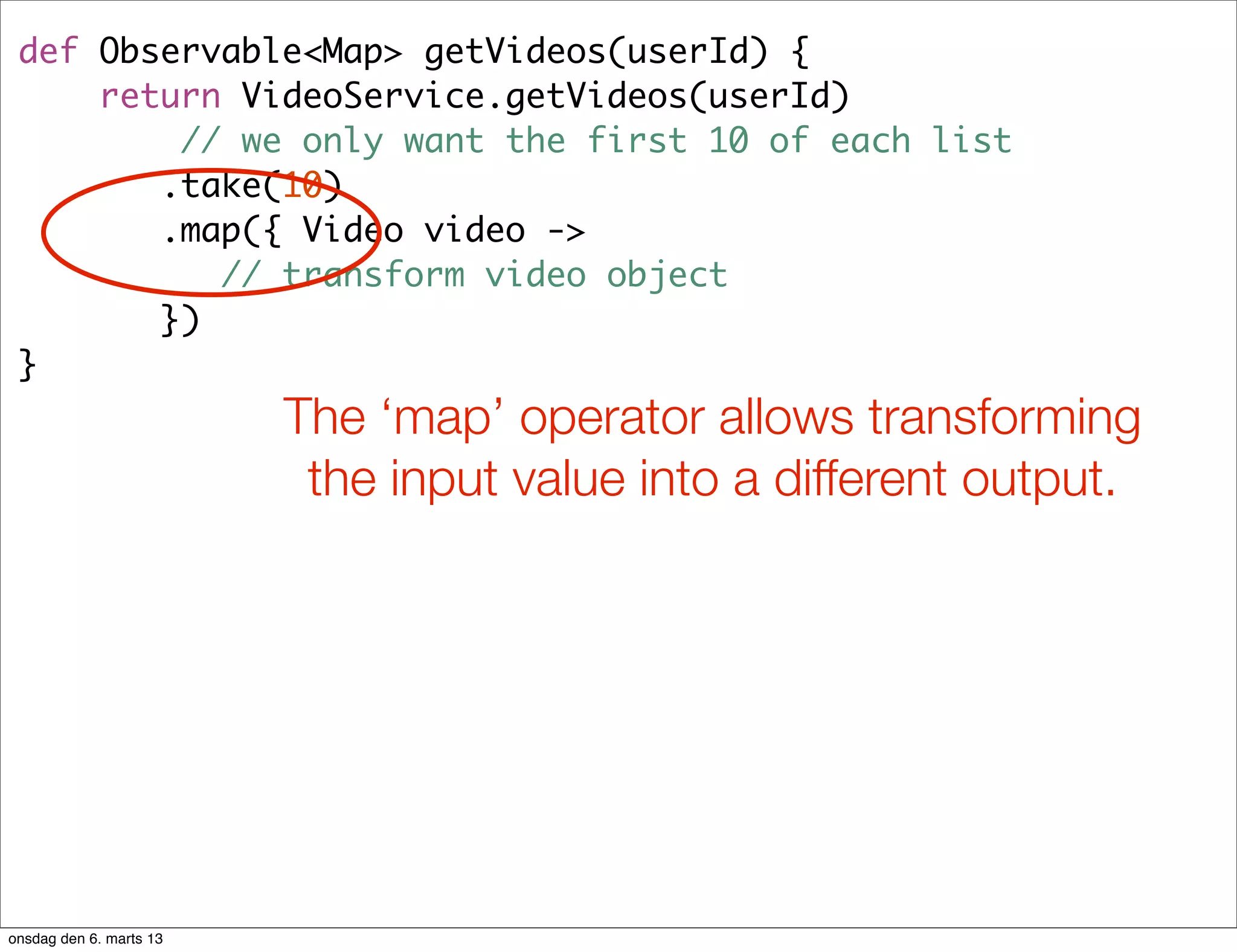
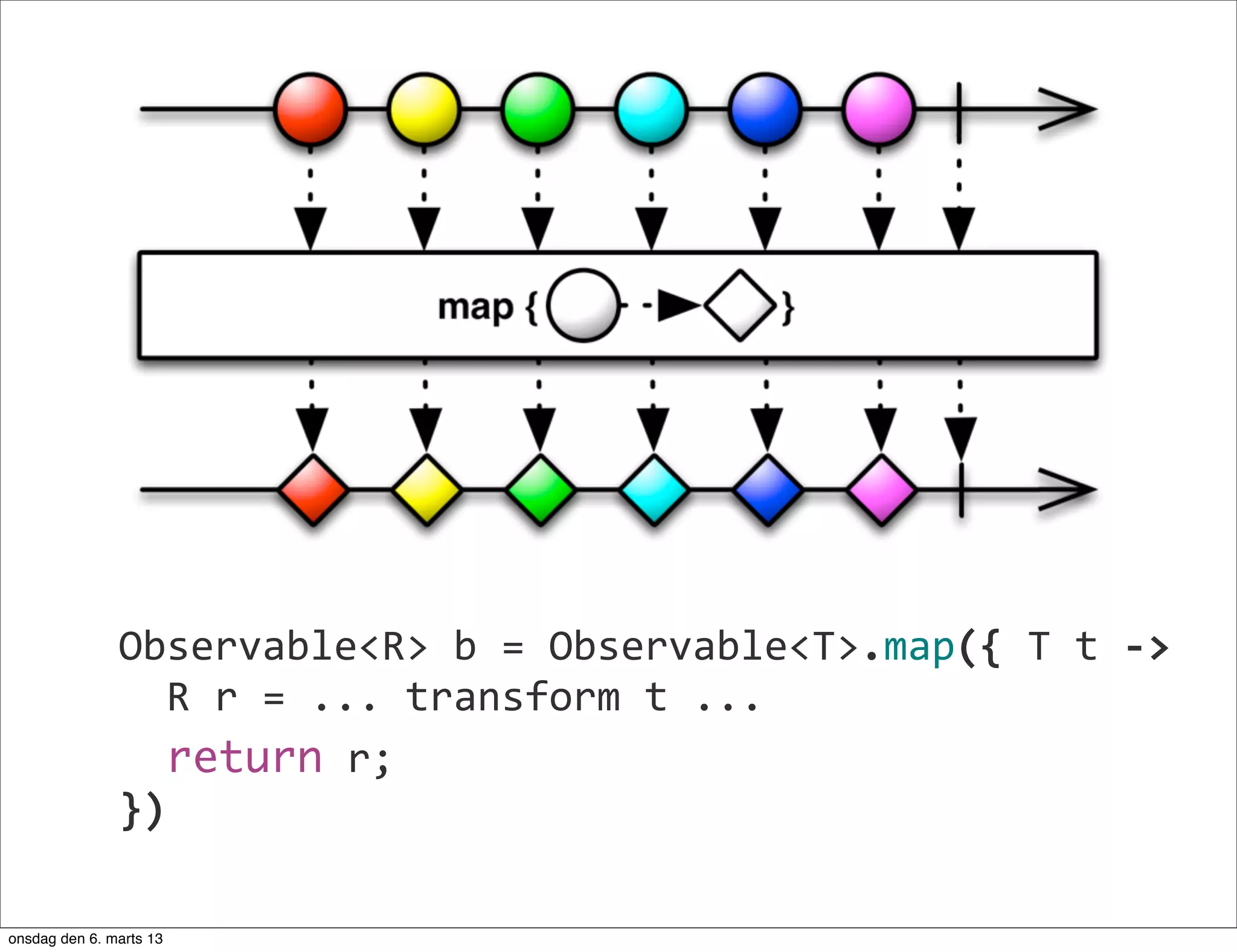
![def Observable<Map> getVideos(userId) { return VideoService.getVideos(userId) // we only want the first 10 of each list .take(10) .mapMany({ Video video -> // for each video we want to fetch metadata def m = video.getMetadata() .map({ Map<String, String> md -> // transform to the data and format we want return [title: md.get("title"), length: md.get("duration")] }) // and its rating and bookmark def b ... def r ... }) } onsdag den 6. marts 13](https://image.slidesharecdn.com/untitled-130422100824-phpapp02/75/Functional-Reactive-Programming-in-the-Netflix-API-56-2048.jpg)
![def Observable<Map> getVideos(userId) { return VideoService.getVideos(userId) // we only want the first 10 of each list .take(10) .mapMany({ Video video -> // for each video we want to fetch metadata def m = video.getMetadata() .map({ Map<String, String> md -> // transform to the data and format we want return [title: md.get("title"), length: md.get("duration")] }) // and its rating and bookmark def b ... def r ... }) } We change to ‘mapMany’ which is like merge(map()) since we will return an Observable<T> instead of T. onsdag den 6. marts 13](https://image.slidesharecdn.com/untitled-130422100824-phpapp02/75/Functional-Reactive-Programming-in-the-Netflix-API-57-2048.jpg)
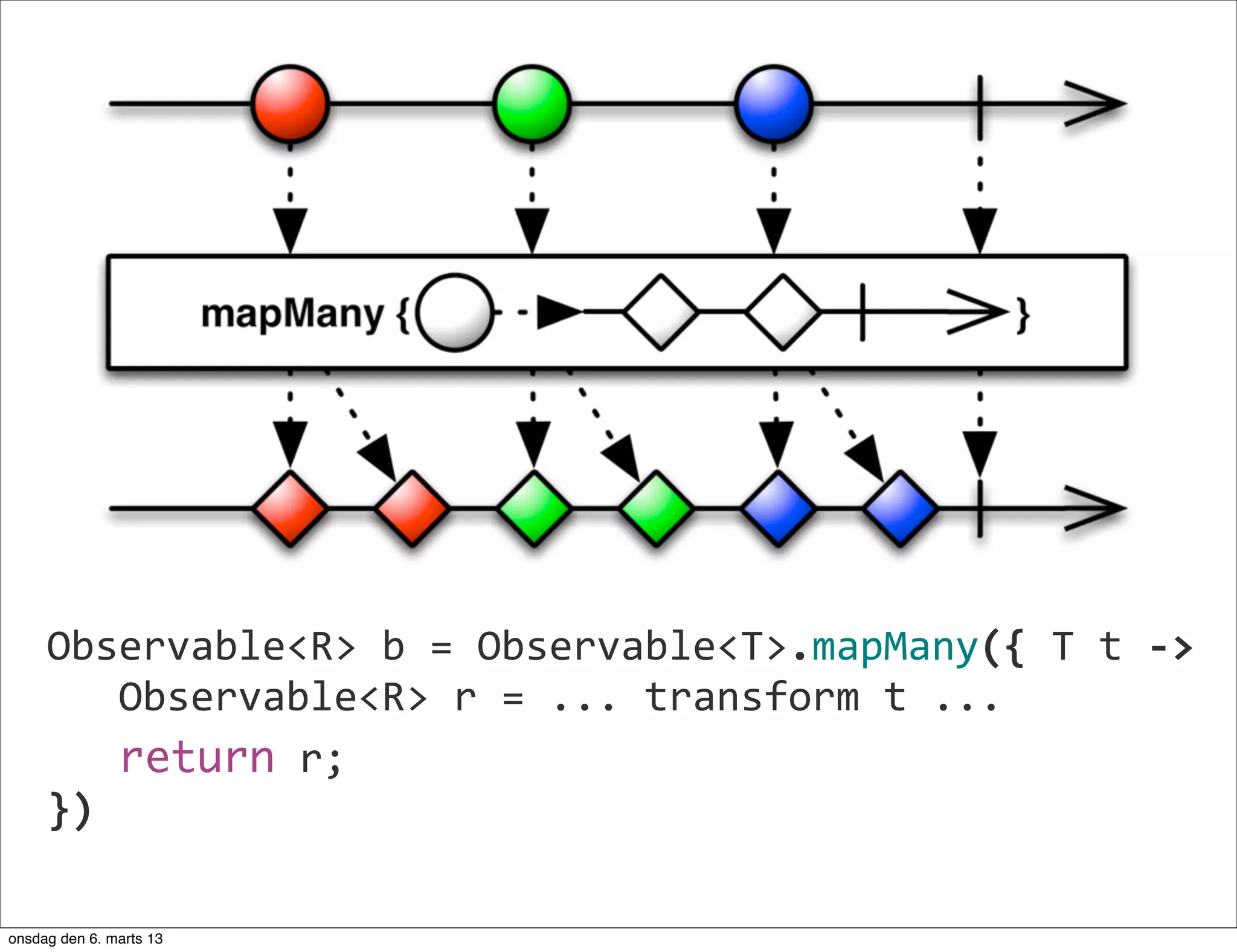
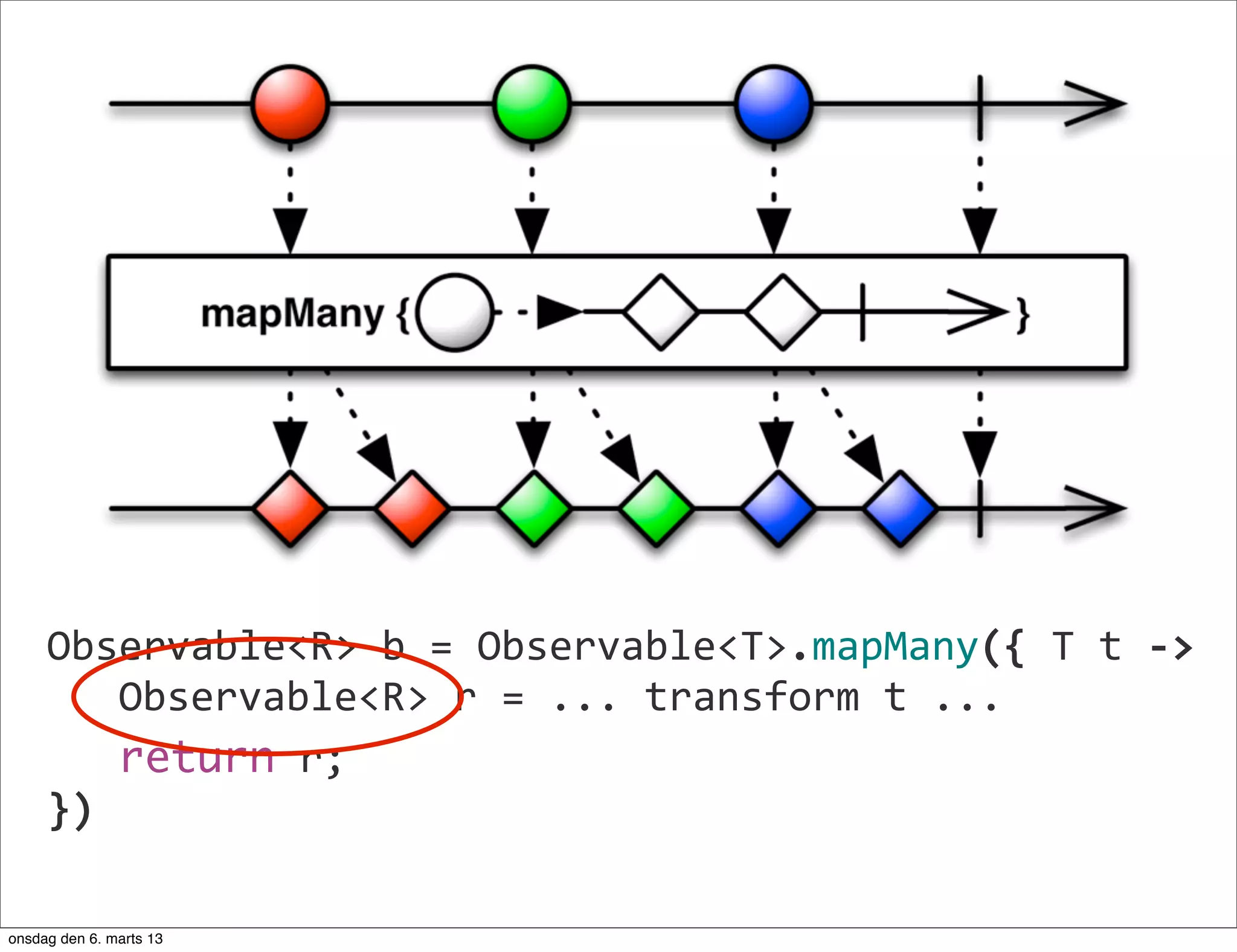
![def Observable<Map> getVideos(userId) { return VideoService.getVideos(userId) // we only want the first 10 of each list .take(10) .mapMany({ Video video -> // for each video we want to fetch metadata def m = video.getMetadata() .map({ Map<String, String> md -> // transform to the data and format we want return [title: md.get("title"), length: md.get("duration")] }) // and its rating and bookmark def b ... def r ... }) } Nested asynchronous calls that return more Observables. onsdag den 6. marts 13](https://image.slidesharecdn.com/untitled-130422100824-phpapp02/75/Functional-Reactive-Programming-in-the-Netflix-API-60-2048.jpg)
![def Observable<Map> getVideos(userId) { return VideoService.getVideos(userId) // we only want the first 10 of each list .take(10) .mapMany({ Video video -> // for each video we want to fetch metadata def m = video.getMetadata() .map({ Map<String, String> md -> // transform to the data and format we want return [title: md.get("title"), length: md.get("duration")] }) // and its rating and bookmark def b ... def r ... }) } Observable<VideoMetadata> Observable<VideoBookmark> Observable<VideoRating> onsdag den 6. marts 13](https://image.slidesharecdn.com/untitled-130422100824-phpapp02/75/Functional-Reactive-Programming-in-the-Netflix-API-61-2048.jpg)
![def Observable<Map> getVideos(userId) { return VideoService.getVideos(userId) // we only want the first 10 of each list .take(10) .mapMany({ Video video -> // for each video we want to fetch metadata def m = video.getMetadata() .map({ Map<String, String> md -> // transform to the data and format we want return [title: md.get("title"), length: md.get("duration")] }) // and its rating and bookmark def b ... def r ... }) } Each Observable transforms its data using ‘map’ onsdag den 6. marts 13](https://image.slidesharecdn.com/untitled-130422100824-phpapp02/75/Functional-Reactive-Programming-in-the-Netflix-API-62-2048.jpg)
![def Observable<Map> getVideos(userId) { return VideoService.getVideos(userId) // we only want the first 10 of each list .take(10) .mapMany({ Video video -> // for each video we want to fetch metadata def m = video.getMetadata() .map({ Map<String, String> md -> // transform to the data and format we want return [title: md.get("title"), length: md.get("duration")] }) // and its rating and bookmark def b ... def r ... // compose these together }) } onsdag den 6. marts 13](https://image.slidesharecdn.com/untitled-130422100824-phpapp02/75/Functional-Reactive-Programming-in-the-Netflix-API-63-2048.jpg)
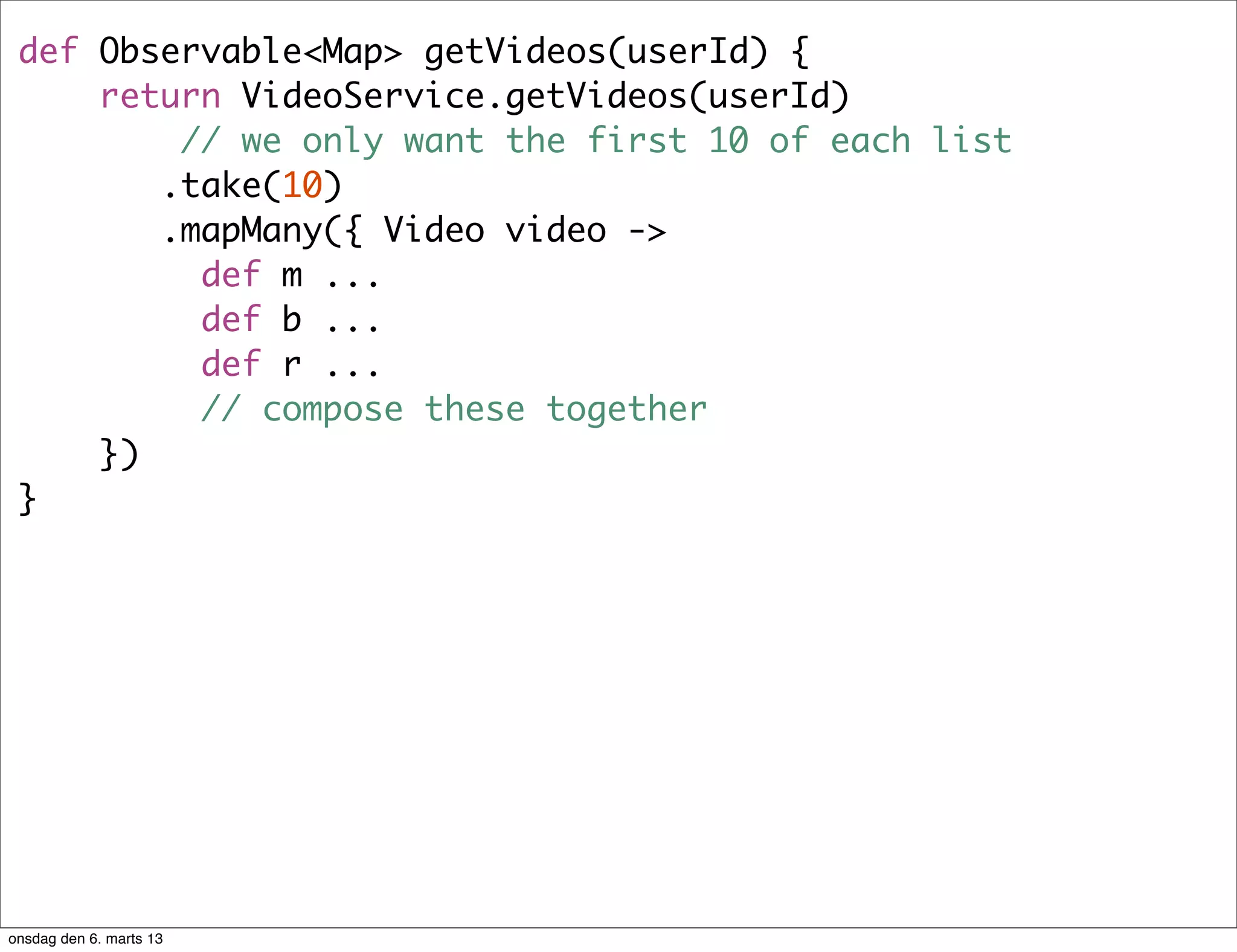
![def Observable<Map> getVideos(userId) { return VideoService.getVideos(userId) // we only want the first 10 of each list .take(10) .mapMany({ Video video -> def m ... def b ... def r ... // compose these together return Observable.zip(m, b, r, { metadata, bookmark, rating -> // now transform to complete dictionary // of data we want for each Video return [id: video.videoId] << metadata << bookmark << rating }) }) } onsdag den 6. marts 13](https://image.slidesharecdn.com/untitled-130422100824-phpapp02/75/Functional-Reactive-Programming-in-the-Netflix-API-65-2048.jpg)
![def Observable<Map> getVideos(userId) { return VideoService.getVideos(userId) // we only want the first 10 of each list .take(10) .mapMany({ Video video -> def m ... def b ... def r ... // compose these together return Observable.zip(m, b, r, { metadata, bookmark, rating -> // now transform to complete dictionary // of data we want for each Video return [id: video.videoId] << metadata << bookmark << rating }) }) } The ‘zip’ operator combines the 3 asynchronous Observables into 1 onsdag den 6. marts 13](https://image.slidesharecdn.com/untitled-130422100824-phpapp02/75/Functional-Reactive-Programming-in-the-Netflix-API-66-2048.jpg)
![Observable.zip(a, b, { a, b, -‐> ... operate on values from both a & b ... return [a, b]; // i.e. return tuple }) onsdag den 6. marts 13](https://image.slidesharecdn.com/untitled-130422100824-phpapp02/75/Functional-Reactive-Programming-in-the-Netflix-API-67-2048.jpg)
![def Observable<Map> getVideos(userId) { return VideoService.getVideos(userId) // we only want the first 10 of each list .take(10) .mapMany({ Video video -> def m ... def b ... def r ... // compose these together return Observable.zip(m, b, r, { metadata, bookmark, rating -> // now transform to complete dictionary // of data we want for each Video return [id: video.videoId] << metadata << bookmark << rating }) }) } return a single Map (dictionary) of transformed and combined data from 4 asynchronous calls onsdag den 6. marts 13](https://image.slidesharecdn.com/untitled-130422100824-phpapp02/75/Functional-Reactive-Programming-in-the-Netflix-API-68-2048.jpg)
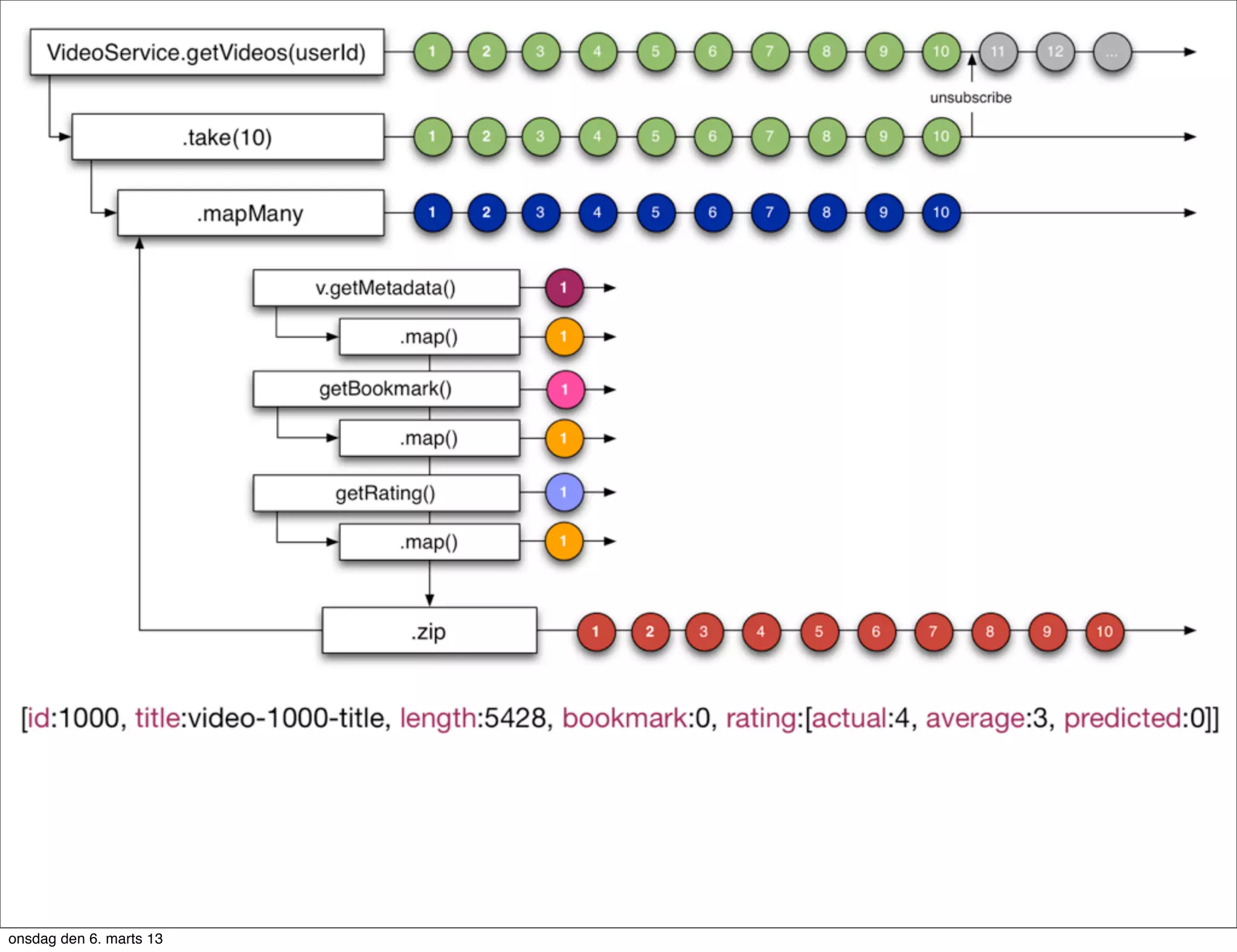
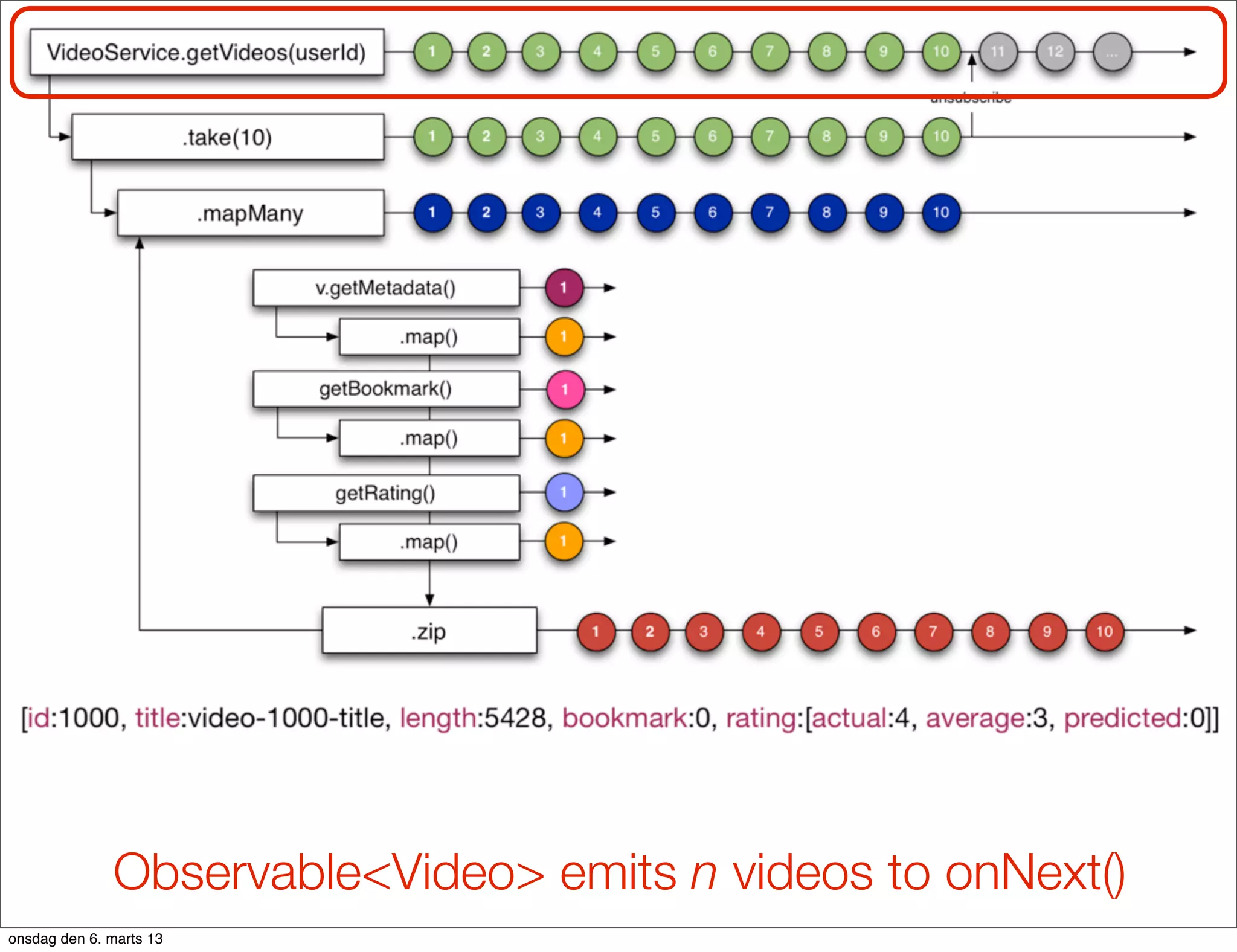
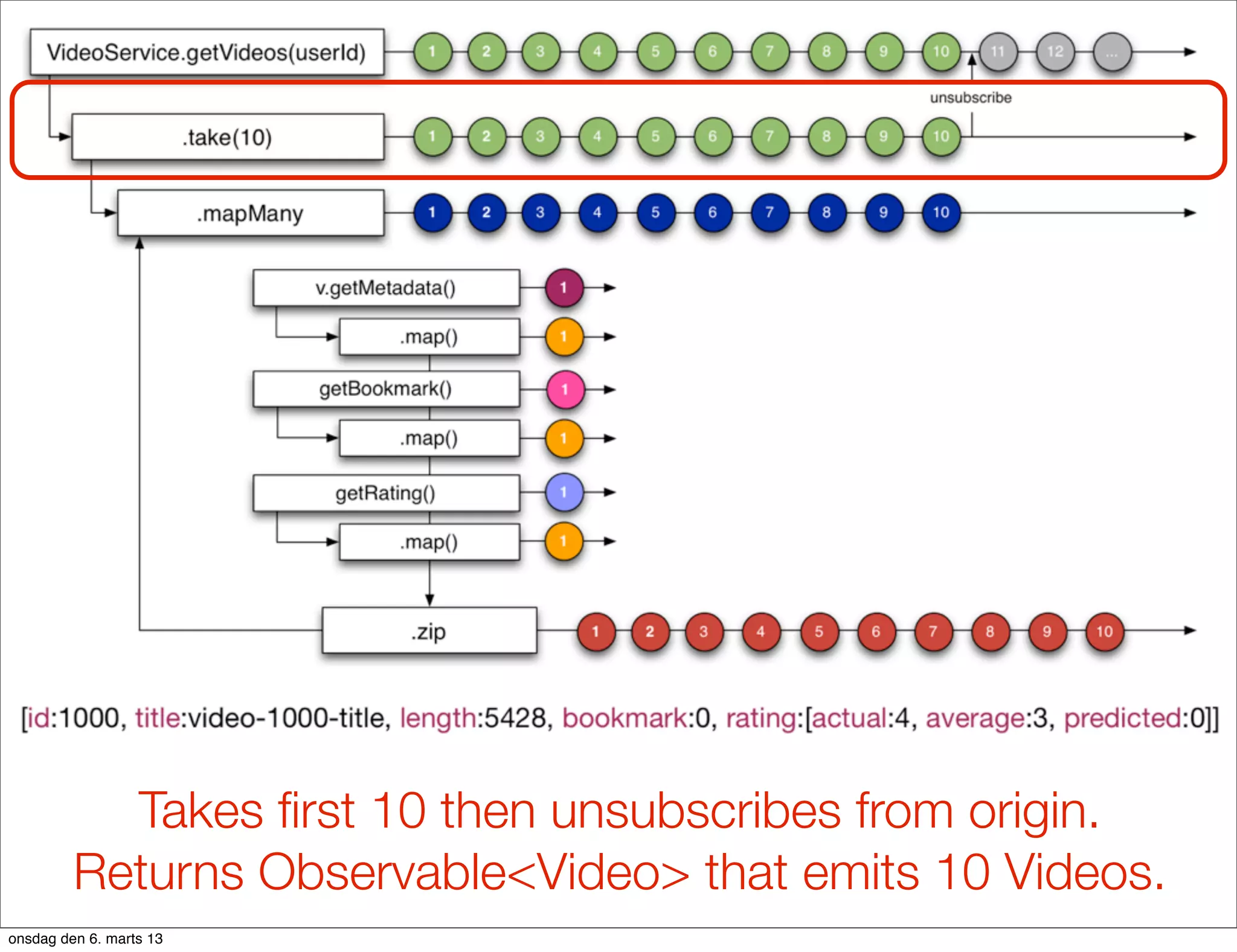
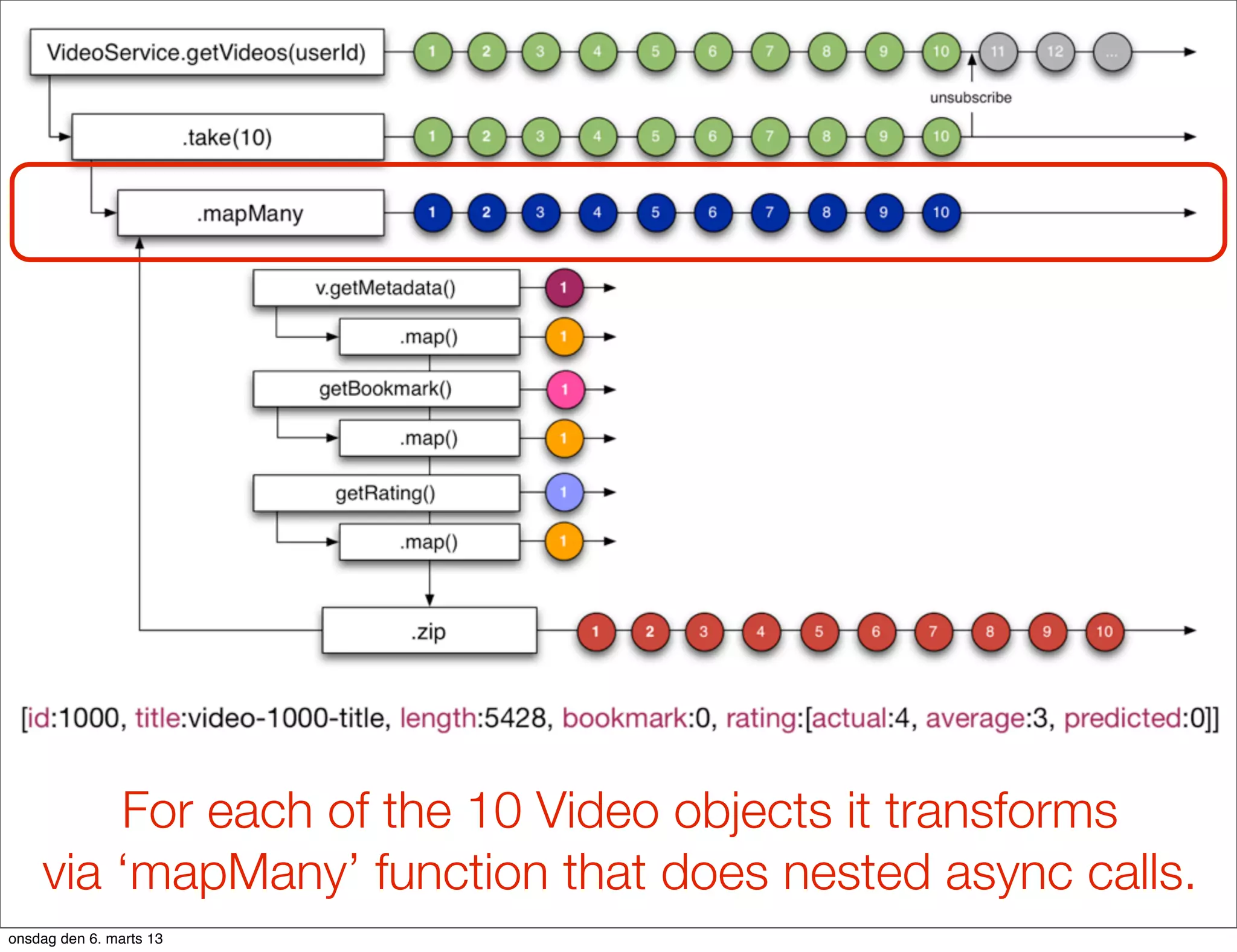
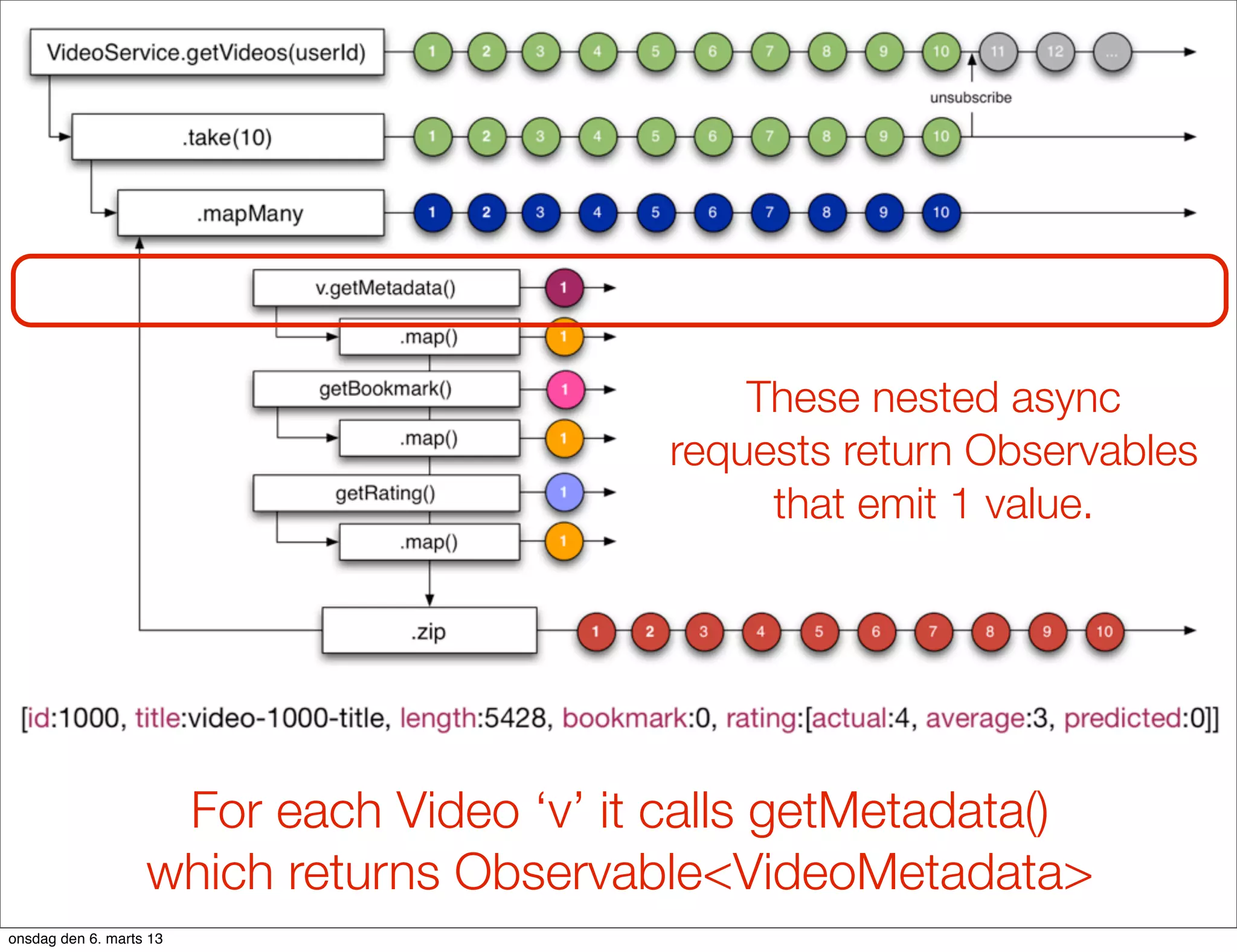
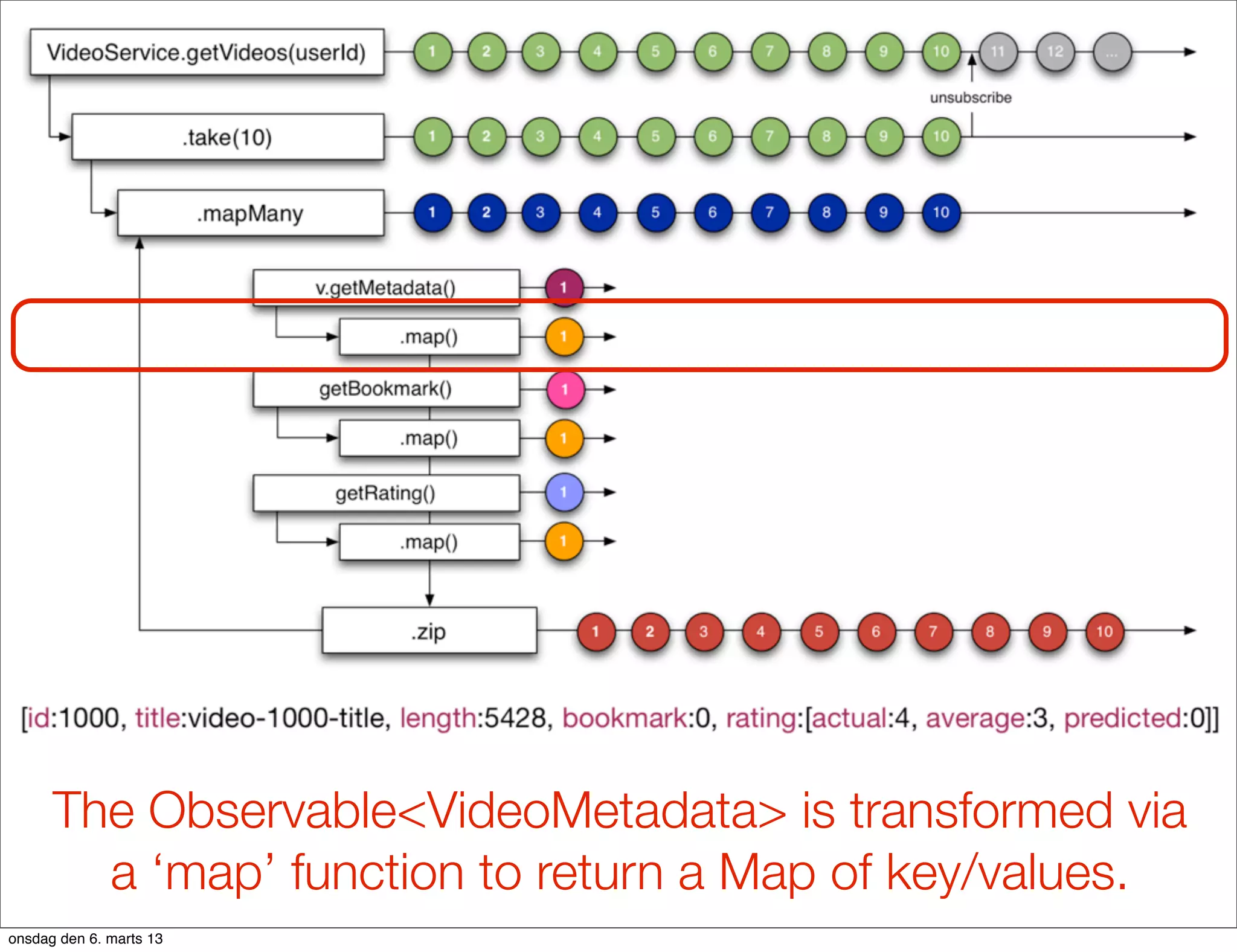
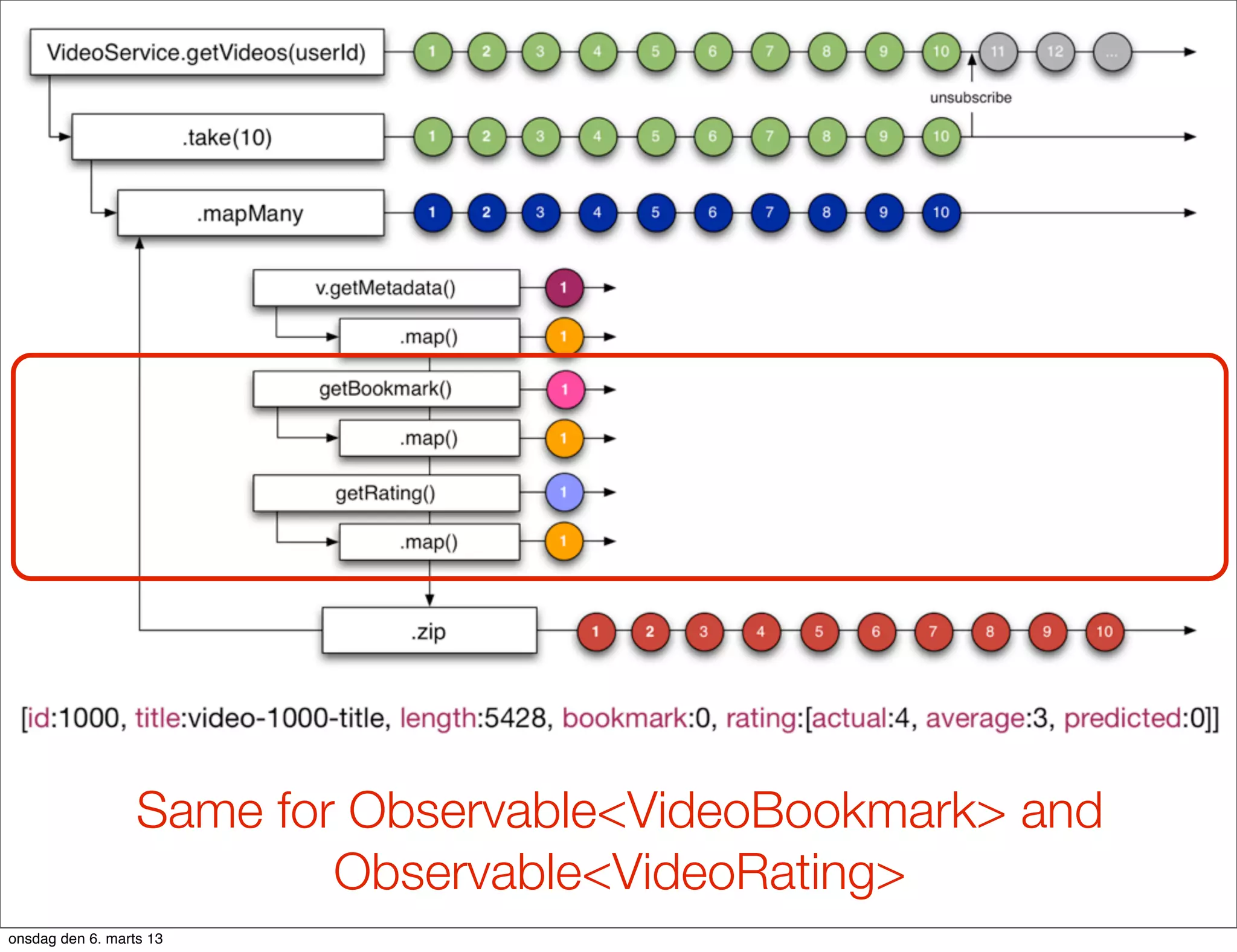
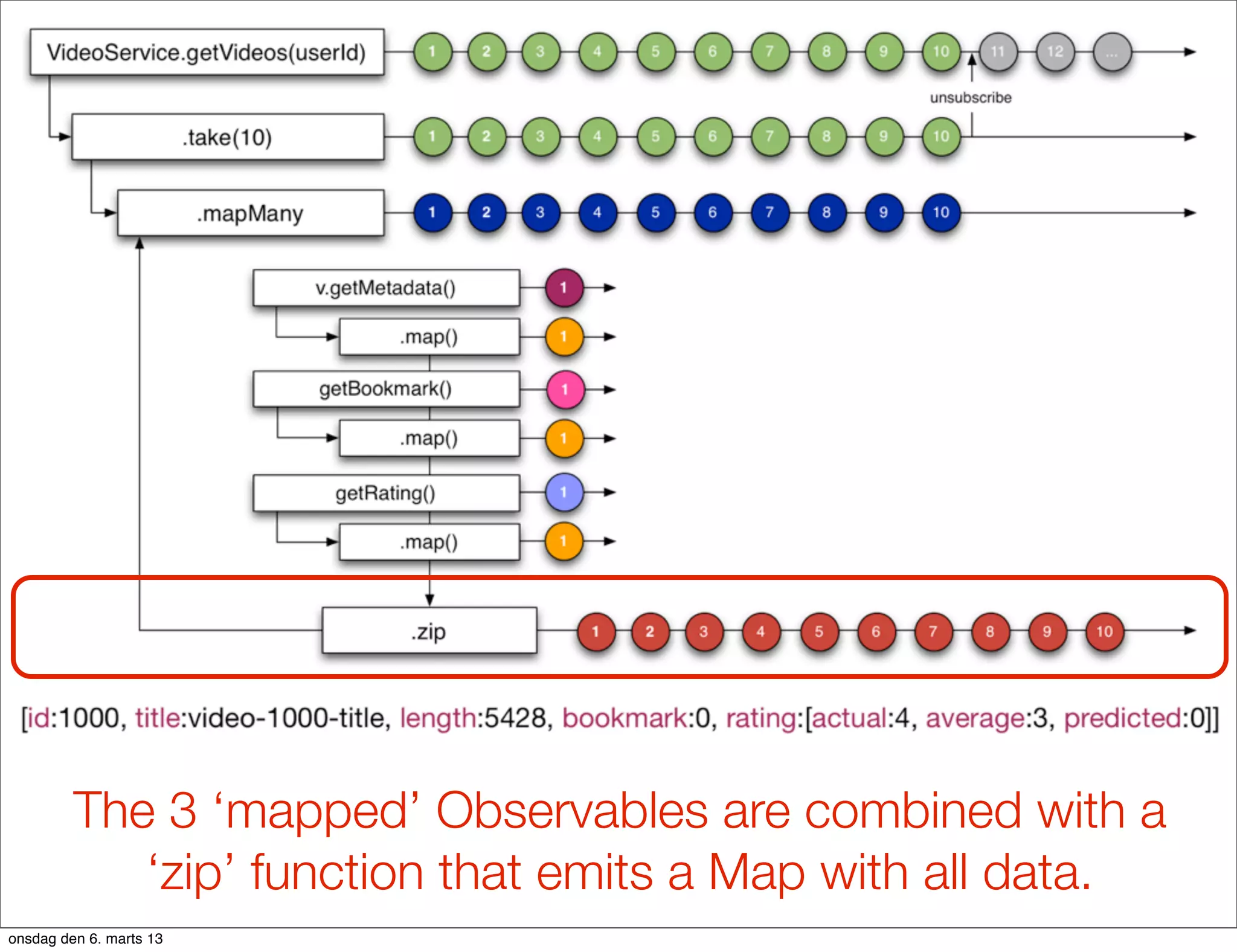
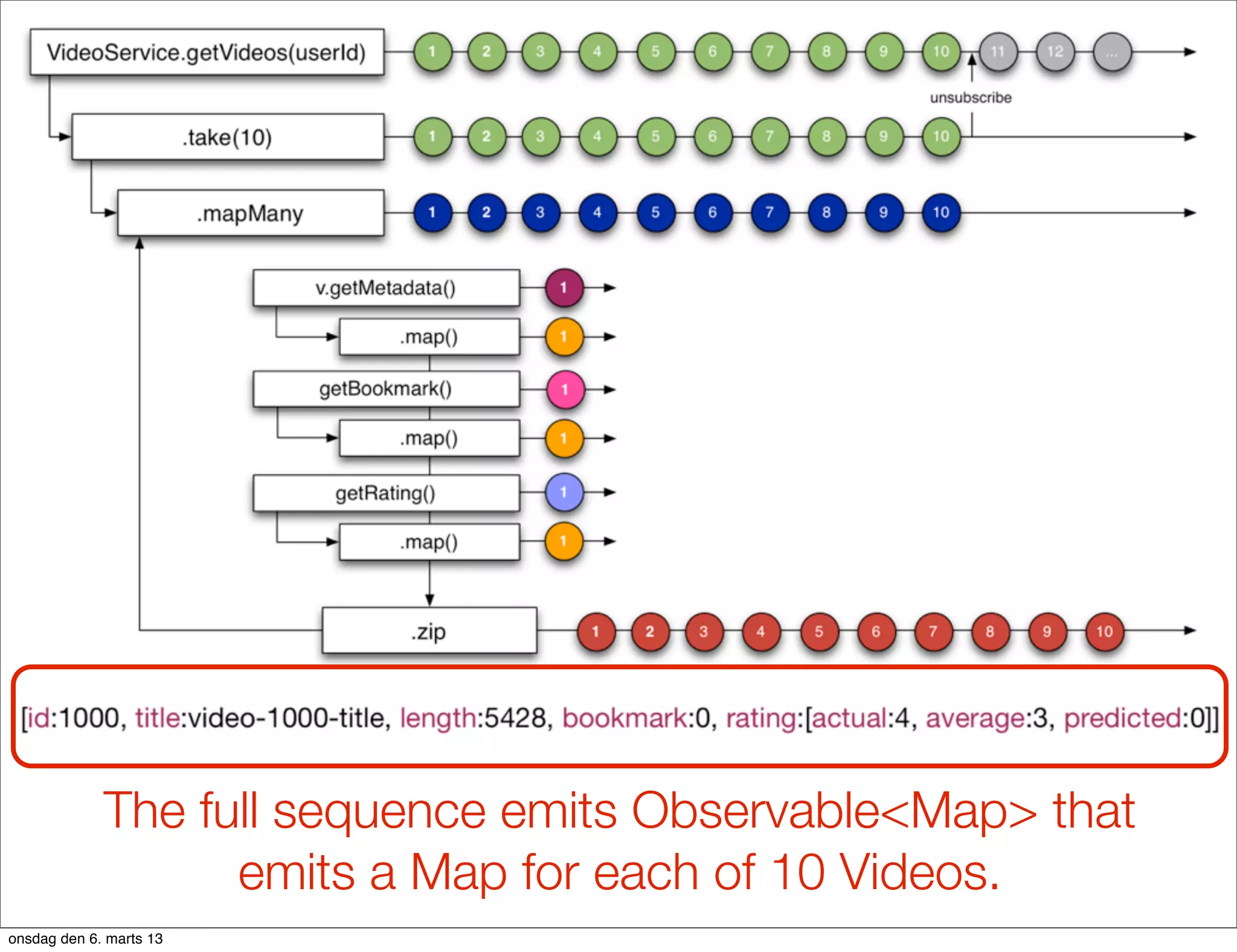
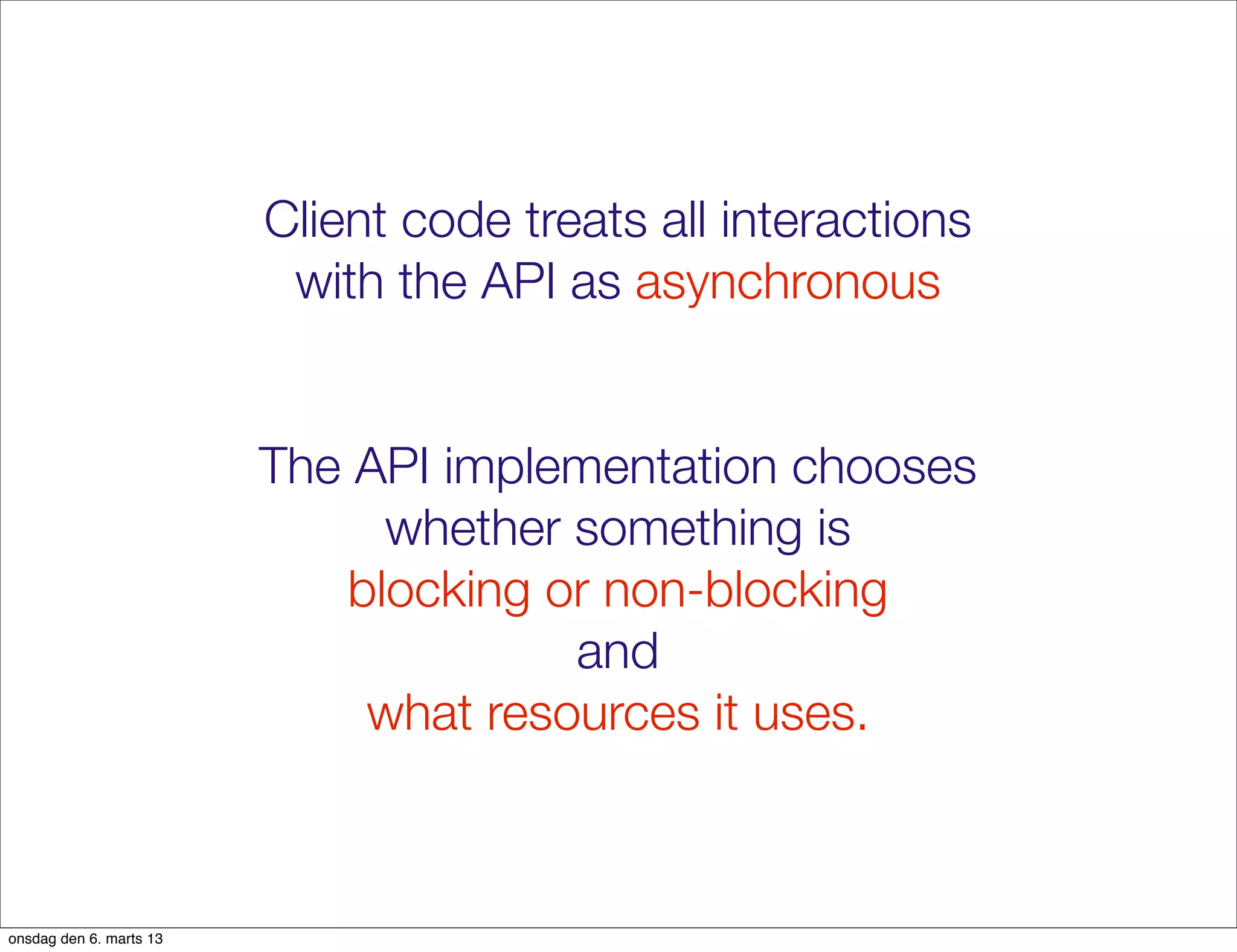
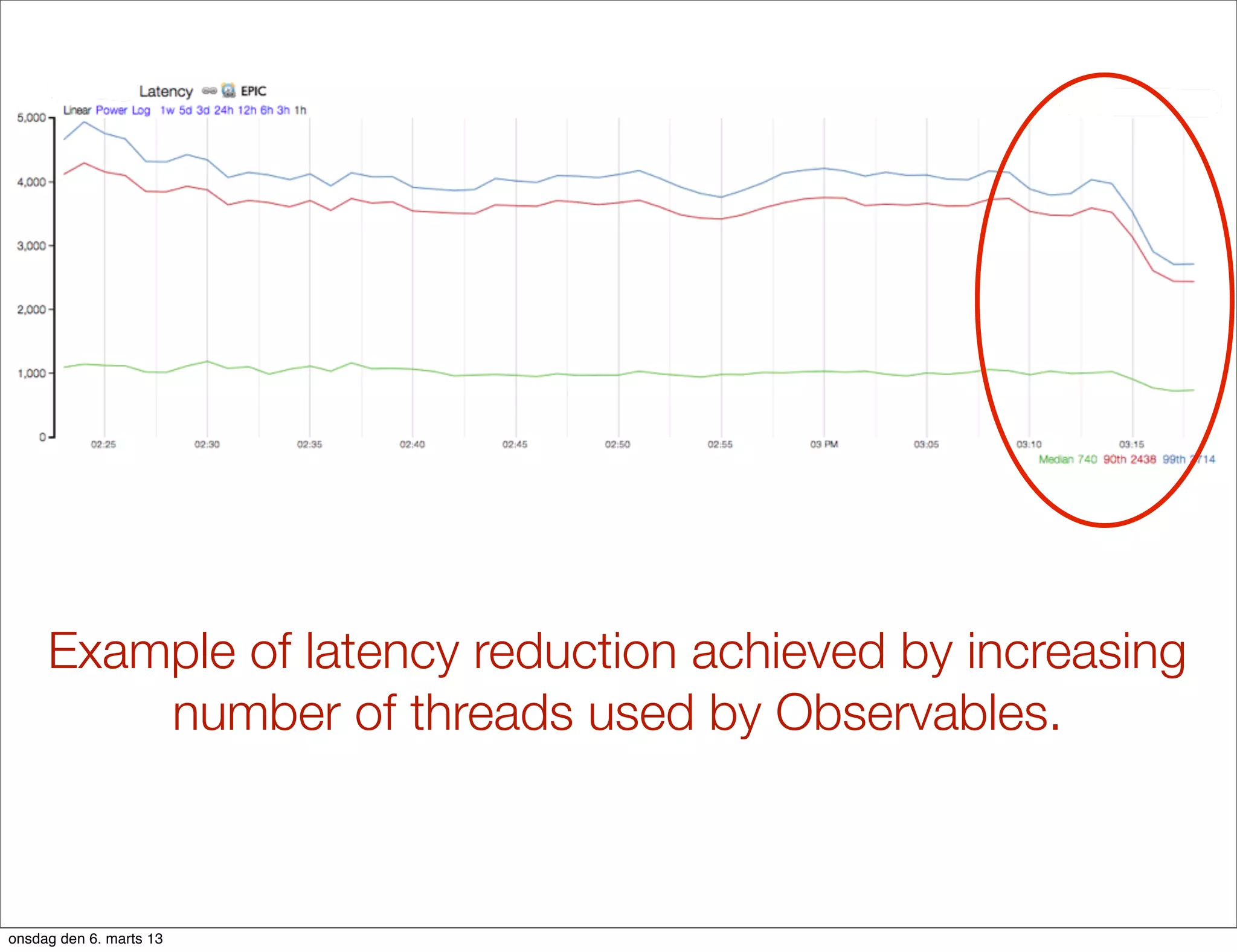
![+ Observable<User> u = new GetUserCommand(id).observe(); Observable<Geo> g = new GetGeoCommand(request).observe(); Observable.zip(u, g, {user, geo -‐> return [username: user.getUsername(), currentLocation: geo.getCounty()] }) RxJava coming to Hystrix https://github.com/Netflix/Hystrix onsdag den 6. marts 13](https://image.slidesharecdn.com/untitled-130422100824-phpapp02/75/Functional-Reactive-Programming-in-the-Netflix-API-80-2048.jpg)
